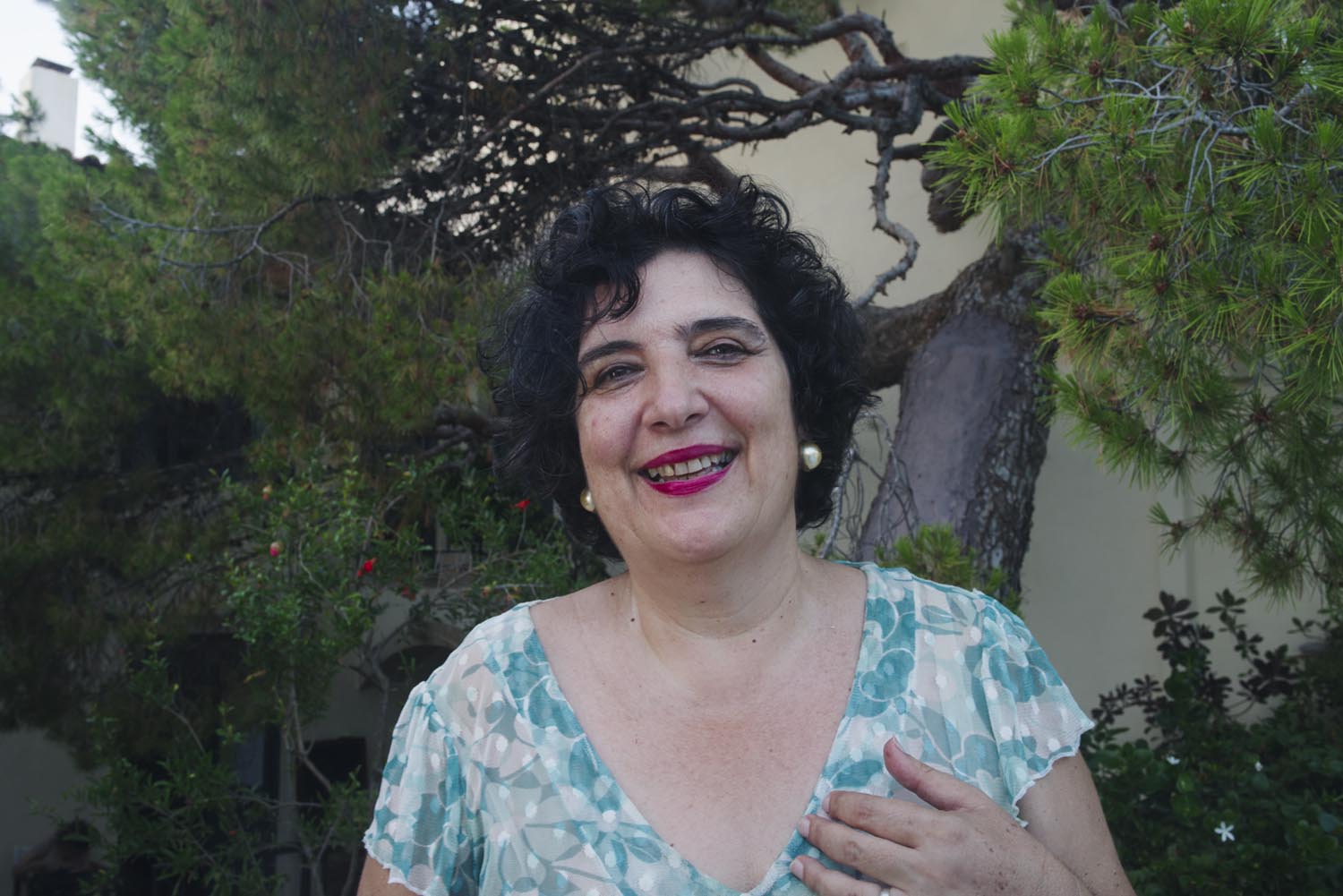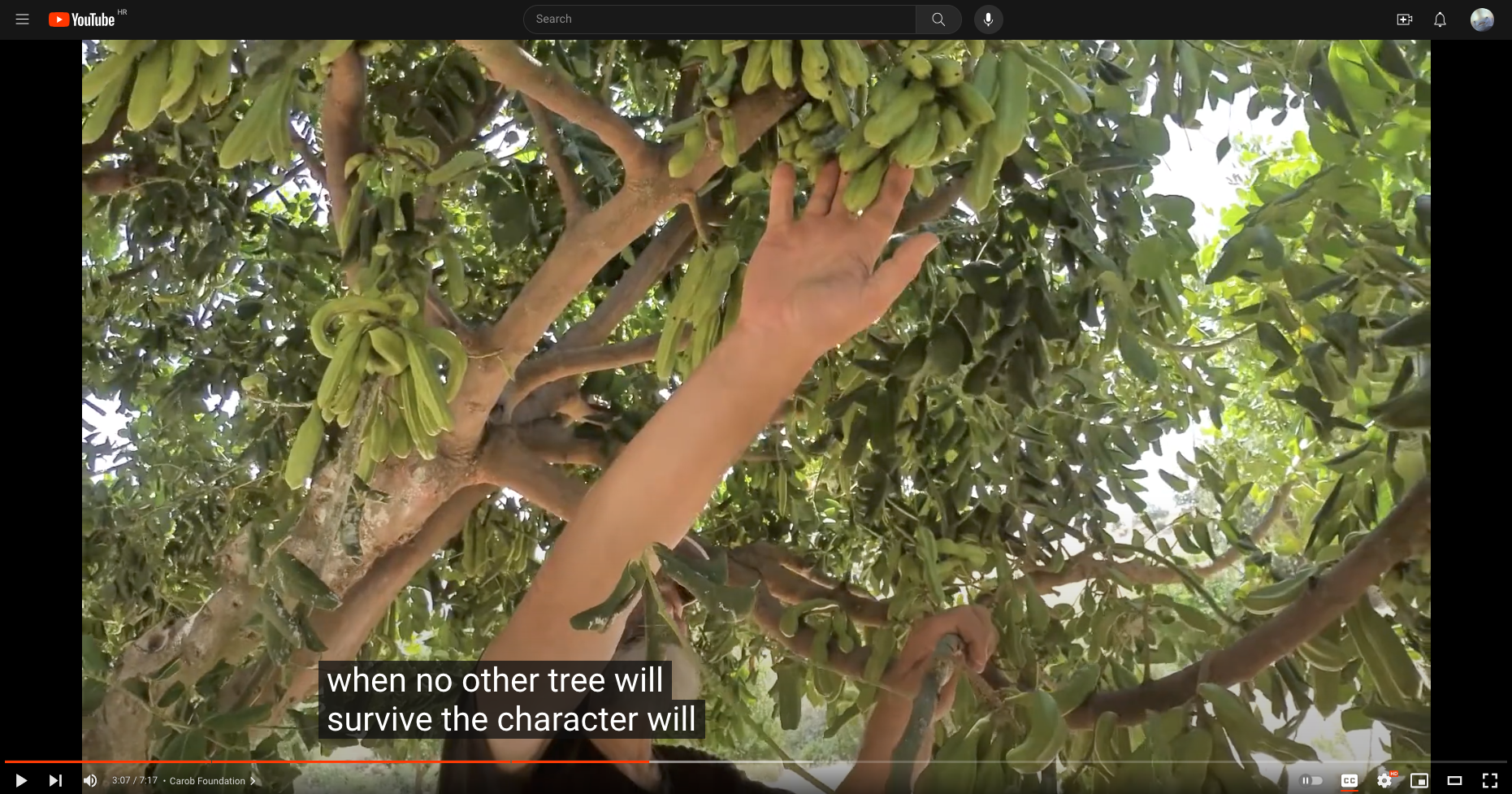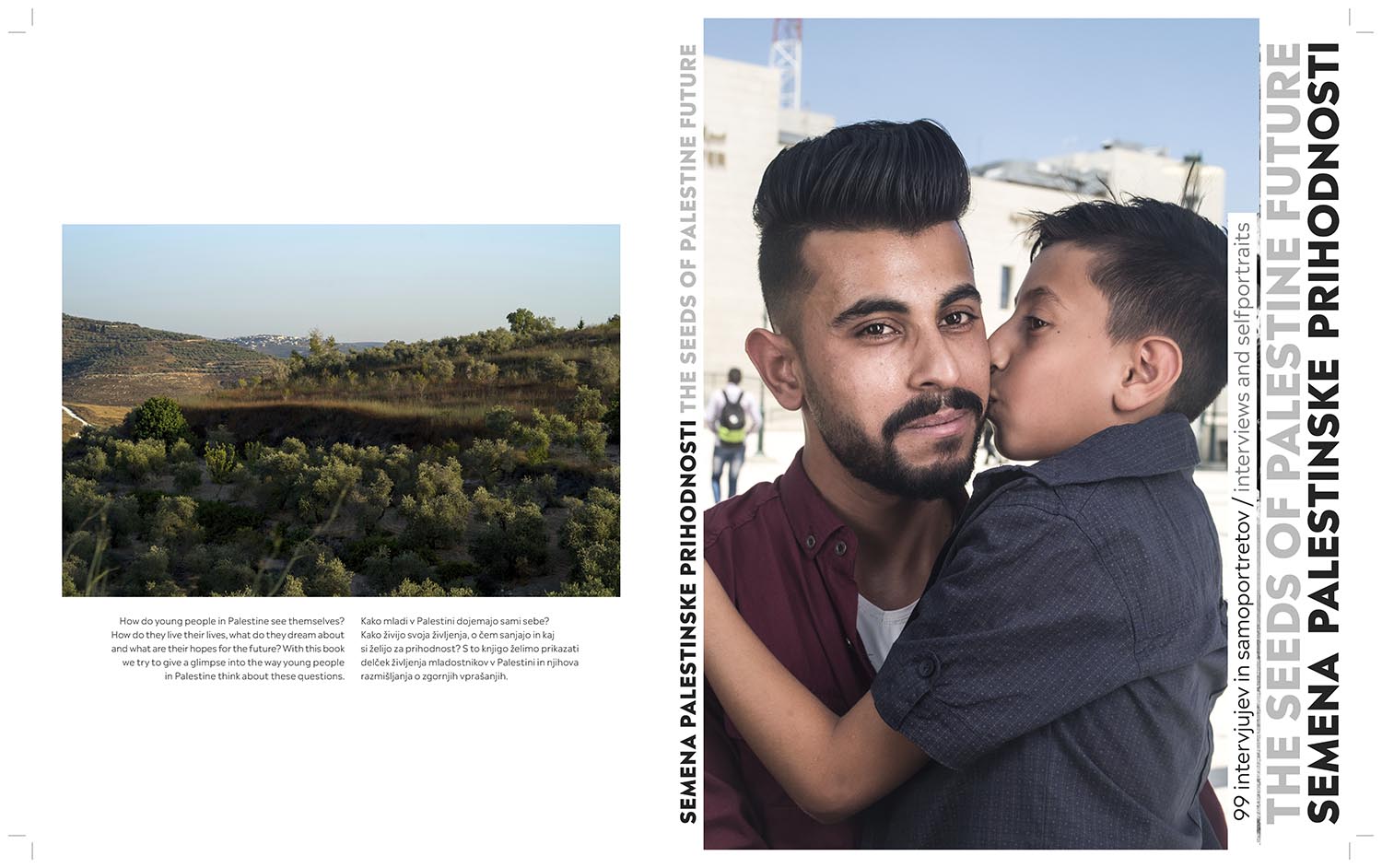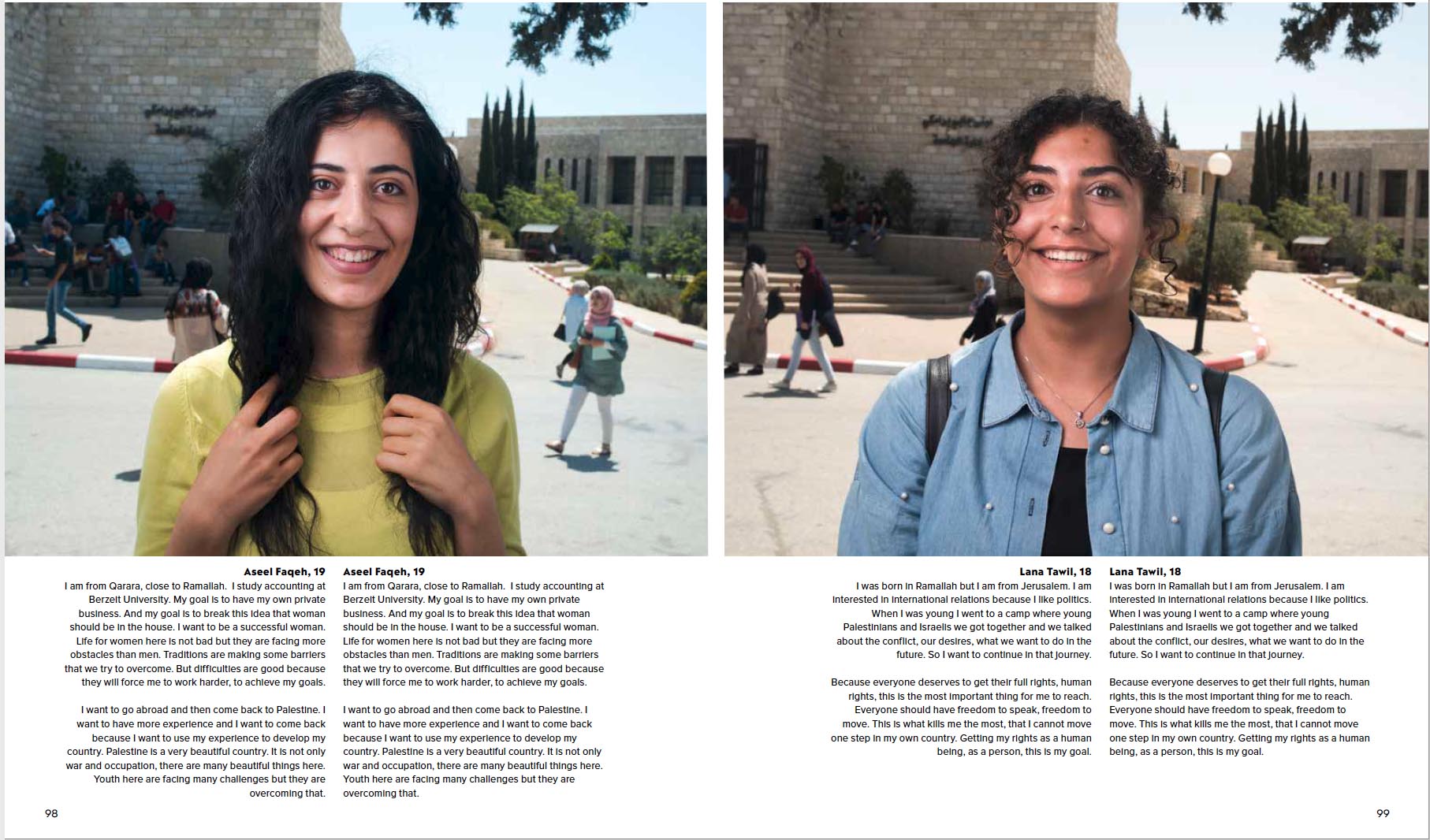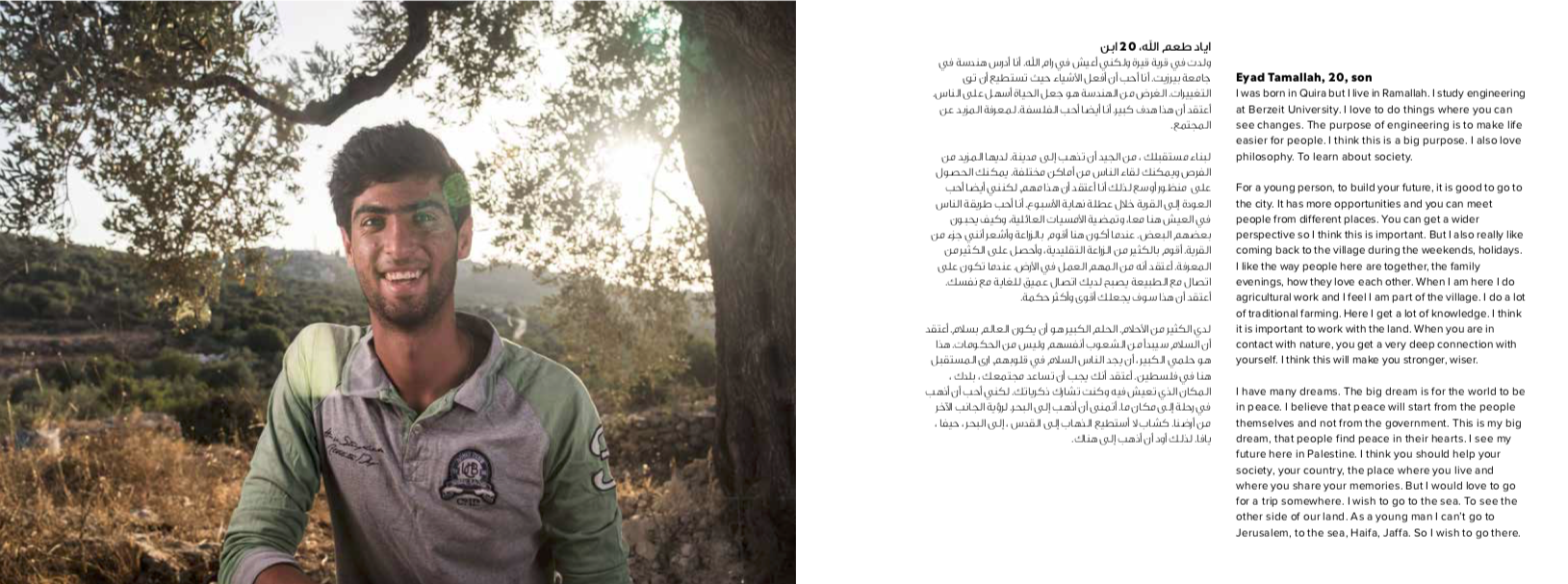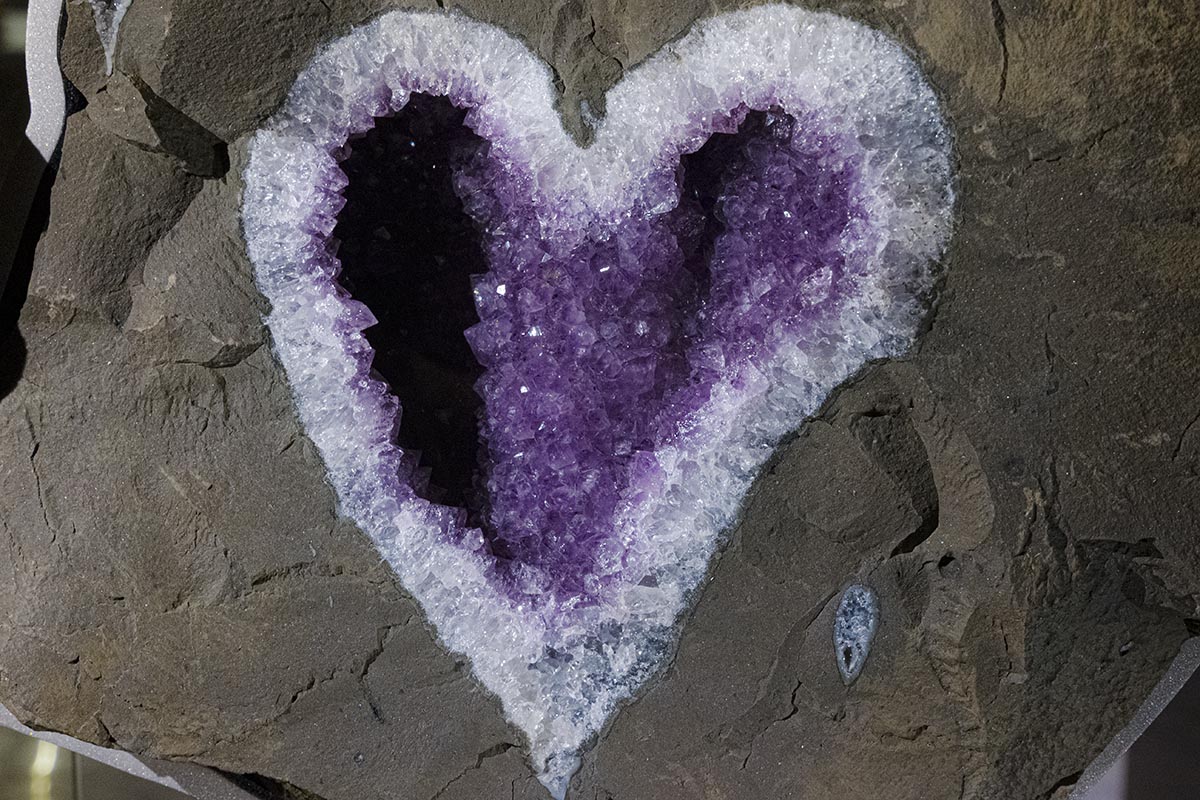In Crete, a true magic happened. By meeting Korina Miliaraki, we got a chance to learn about the great value of carob trees, which they are willing to share with us.
Thanks to Korina and a network of farmers and experts who actively promote, grow, breed and farm it, the carob tree is “coming back“ and bringing good to our common future. We visited Korinna’s friends, “carob activists“, old carob trees, and a carob forest in southern Crete. It became obvious there, that carob tree doesn't need much water to grow and bear fruits which can be eaten directly from the tree. Carob trees can be over 1000 years old and regenerate similar to the olive tree.
I had a very special relation with trees, especially with one that we grew up together. I had my branch, like home. The tree was my home, my second home, and one of the branches was my room and my place. I was always dreaming how to be there, most of the time I wanted to be there. I had a feeling that all the information that was around was coming to me in a magic way when I was on the branch. I was learning the world there. The tree was very alive, I had a dialog with the tree, because it was something more than a home We created a very nice relationship. And another thing is, because I was making ”acrobats” always, I had a feeling there was no way to fall, because I had relation with a tree, the tree was also helping me not to fall down. And sometimes the people from outside were ringing the bell, because they were afraid looking at me when I was making very difficult ”acrobats” when I was very little.My mother was coming out and people said ”Please, your child is going to fall down”, but she was always telling them, ”She's not going to fall down, there is no way”. She trusted me, always, too much, and my mother and my father also, both of them. I never fell.
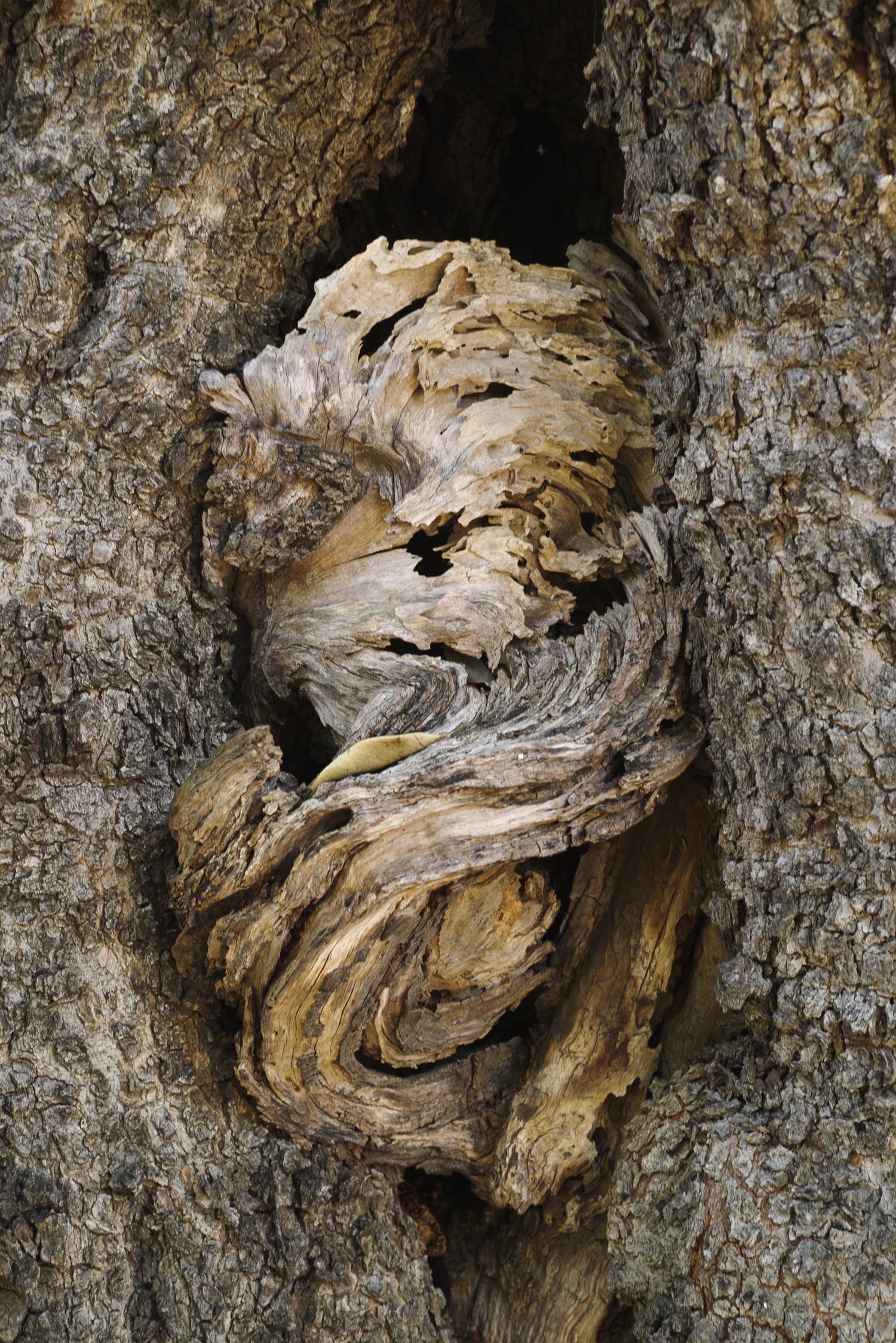
I remember, sometimes my grandfather was,....I liked to see the shadow, I was there, and I was looking at the shadow when the sun was moving and every moment was different than the other, because I was looking down and the shadows were changing all the time. And I had this feeling, that I also have here, that I was moving with the earth all the time, but on the tree. We were traveling and the shadow was giving me this feeling of traveling. But I wasn't traveling alone. And I feel it also here also, in this house, very strongly. But I'm here and all, we're moving with the house and with the tree in the universe. And if you have a very good relationship with surrounding, with the environment, it is really very important. It makes you feel stronger, because you don't feel alone, you're part of the environment. And the environment, it has to do... you are a part of it, and you go all together. I have this feeling of unification. It was very strong that feeling, very strong.
about the ”teacher”-fother
He was first of all an ecologist, before ecology existed. Because he was a chemist and he loved nature. He was admiring nature, the trees, the flowers, the rivers, the see... He made me have these strong feelings about this and to feel part of it and to respect it. He was against all the chemists in the house, for cleaning the dishes, the shampoos and everything. He was making everything for us, to avoid all the chemicals. He was the first one who put up the solar panel and everyone was coming to the house to see it. We had a garden, and I loved the flowers. I had a very good relationship with flowers and all the plants, and animals also. I loved them.
He was the first one in Crete to make bottled wine and export it. He had taken prices from the French at that time. (The factory is still being run by the cousins.)
I hated school. I didn't feel good. I was always feeling like I was outside the system, the education system. At first, I wanted to be an acrobat, then I decided to be the minister of education. When our teacher when I was six or seven asked us what we wanted to be I said minister of education. And she asked me ”Why, my child, do you want to be...” and I said – ”Because I want to close all the schools and make the next generation not suffer from this system, the school than we now have”.
So, I decided to come and work with him and to decide what to do, to see. It is like giving exams to yourself, because you always must return to your place to see exactly who you are, after a period when you're traveling, you're learning, you're doubting. And then you must come to have a new battle with yourself. To decide who you are after all these experiences. And I came here, and I worked with him. And then I decided through this what exactly I wanted. So that's why I came to (). I found my center.
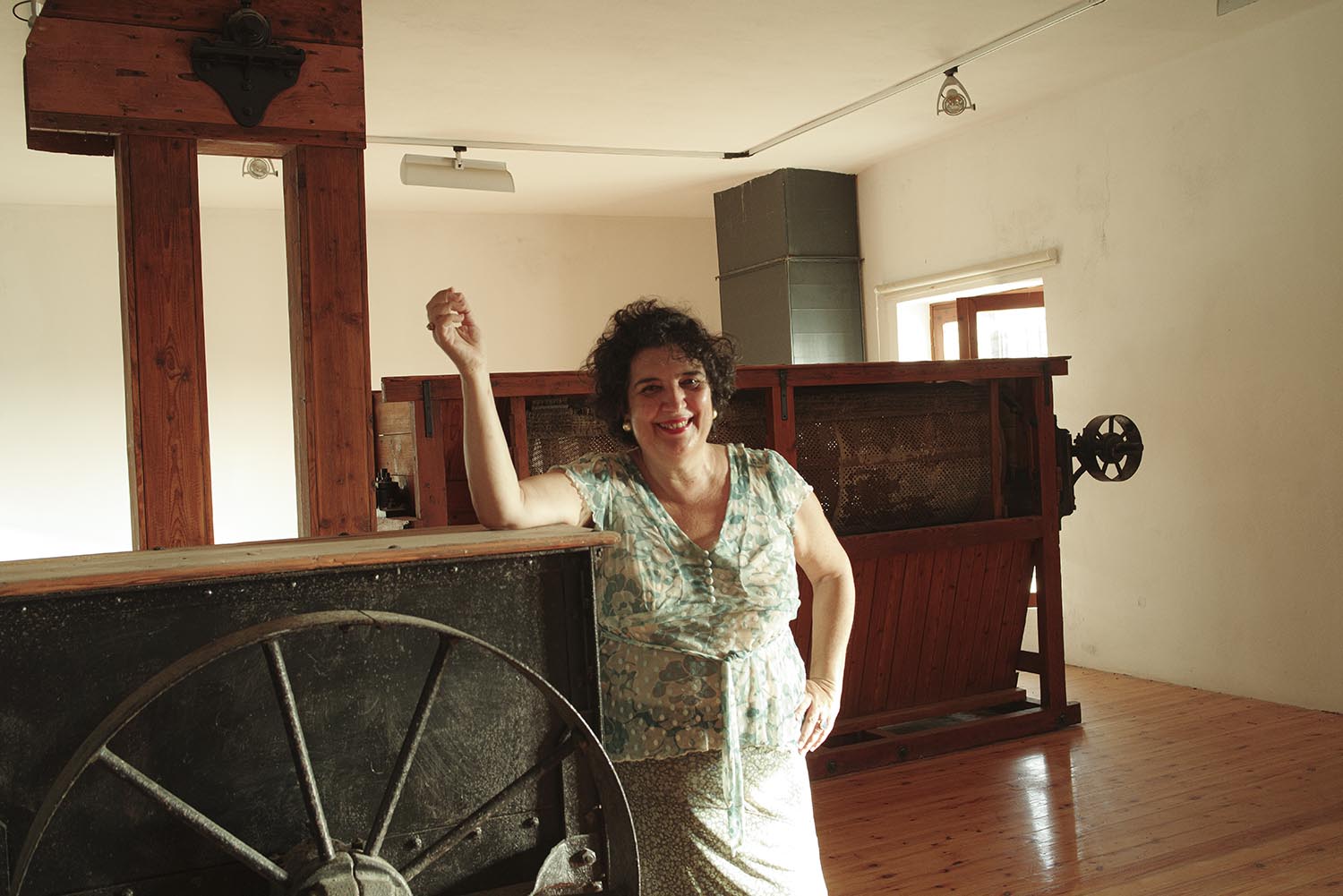
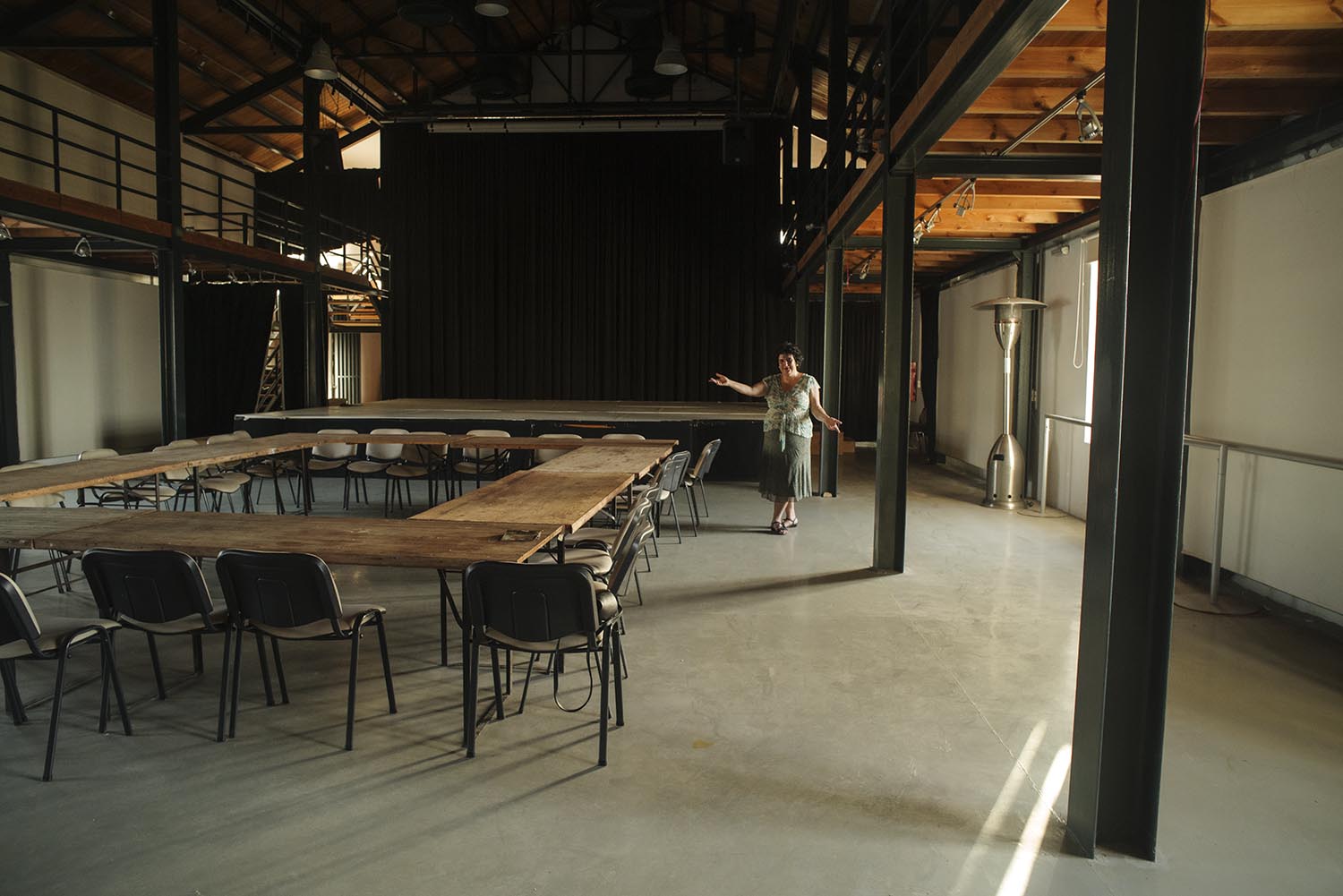
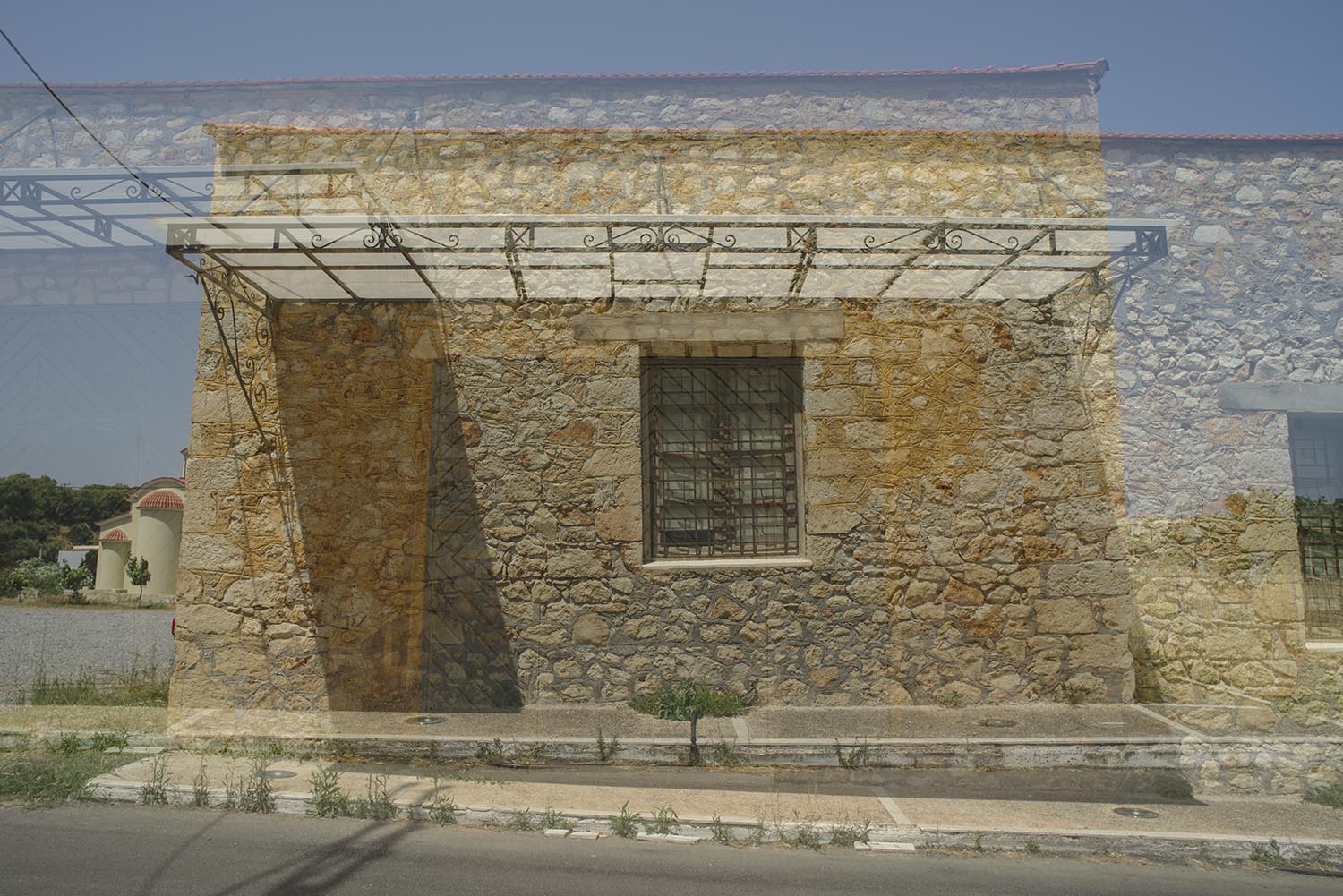
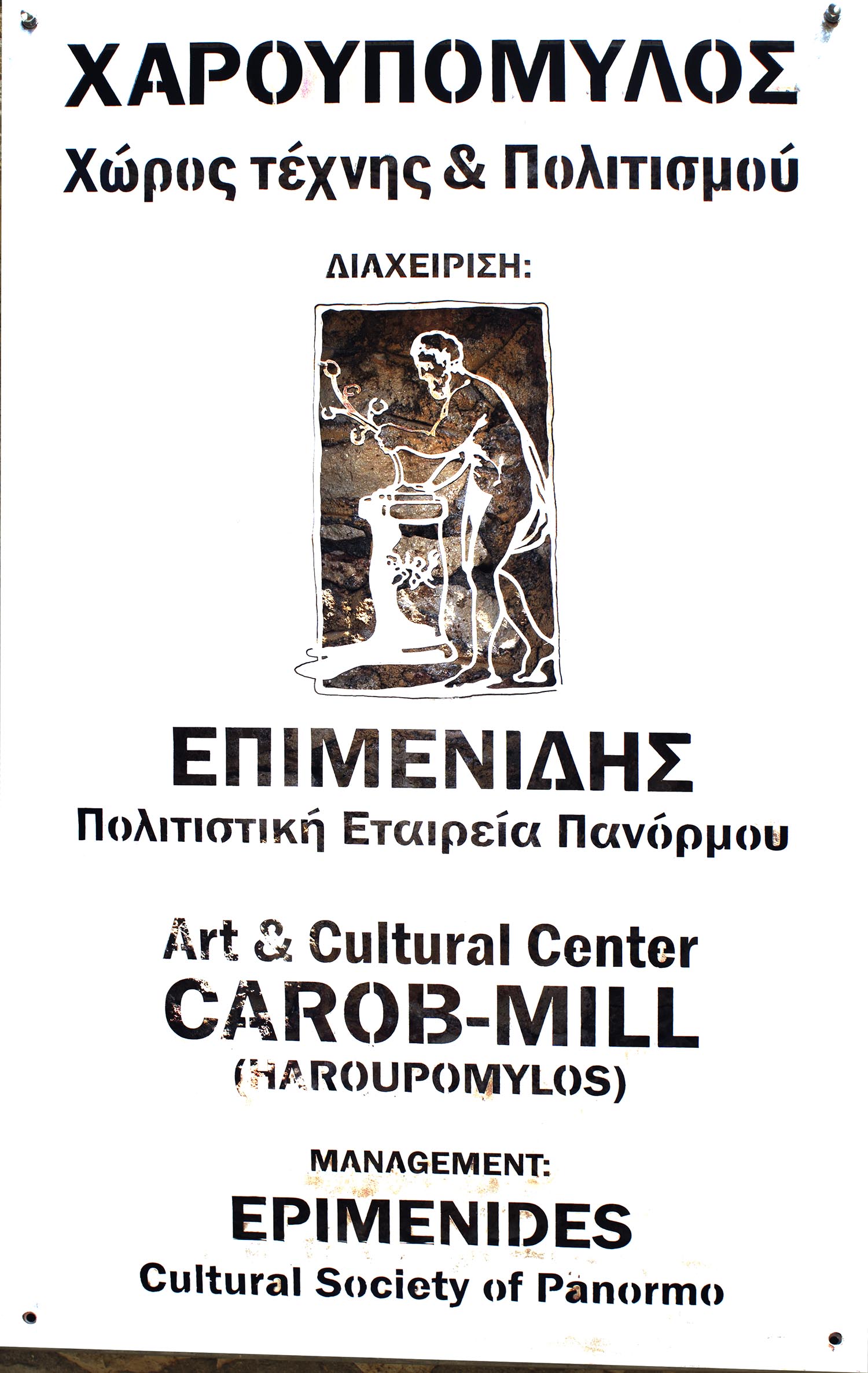
What connected me to the carob was the carob mill, it was Panormos and the carob mill. I loved trees, I loved carobs, but then what made me focus on that was Panormos and then the next step was carob mill and the carob mill told me, it was like telling me, this building, its' history showed me to way to focus on the carob. It is full of memories, this building.I started from my needs. My need was that this building, it is very nice to be restored, and to be a culture centre, because we didn't have any culture centers on the north coast of Crete. Why not create a cultural center here in a very nice village next to the sea. It was mine and others' needs, and it worked like that very nice, because people from all Crete came to many performances that were unique and took place here, or seminars, and from all over the world also. Beside culture events also conferences about the future of Europe, environment ..many seminars, many lectures, congresses. People come from all over, different kinds of people, that's exactly another thing that I like. To connect different kinds of social interactions. People from the cities, people from the countryside, shepherds, farmers, and children from the schools.
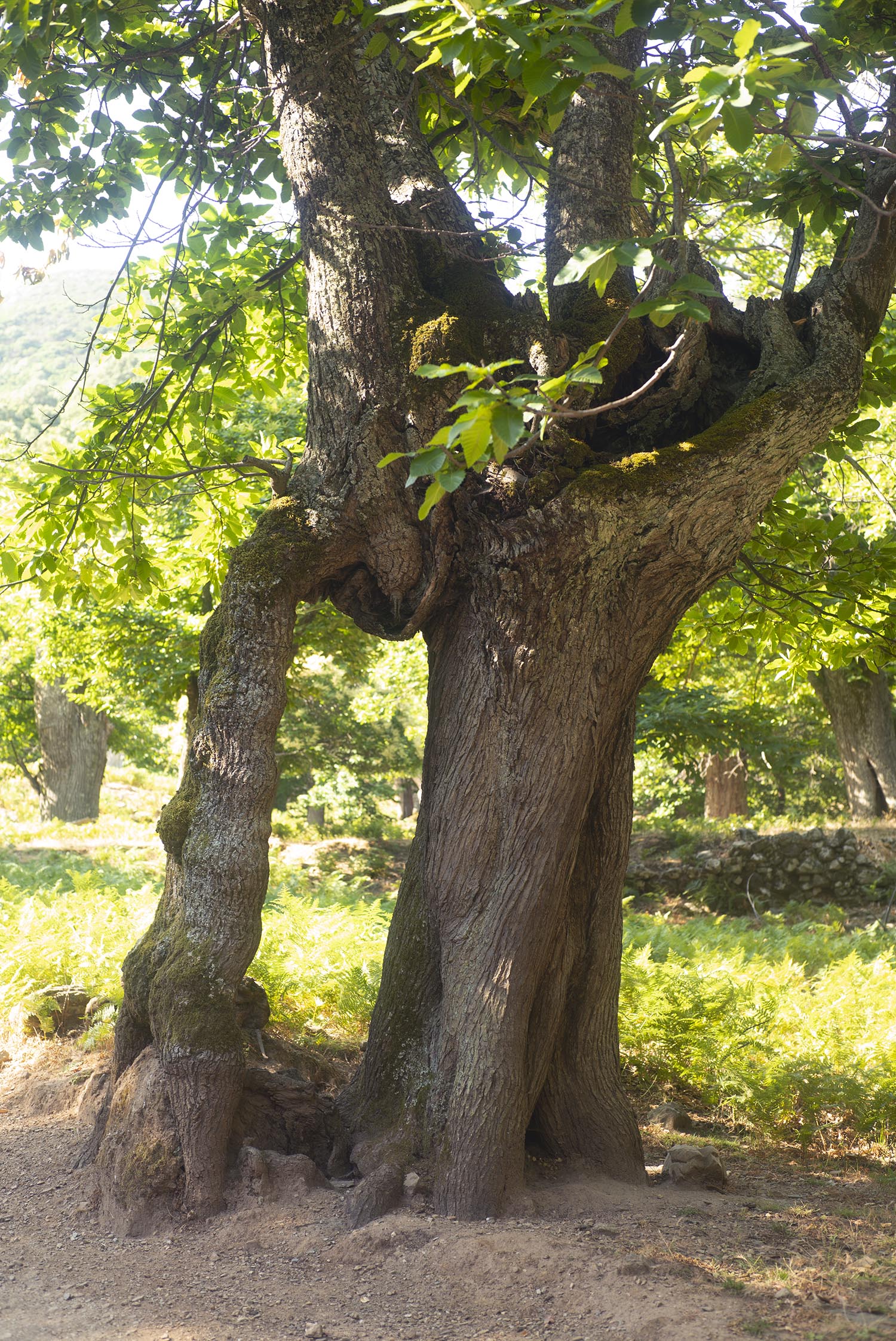
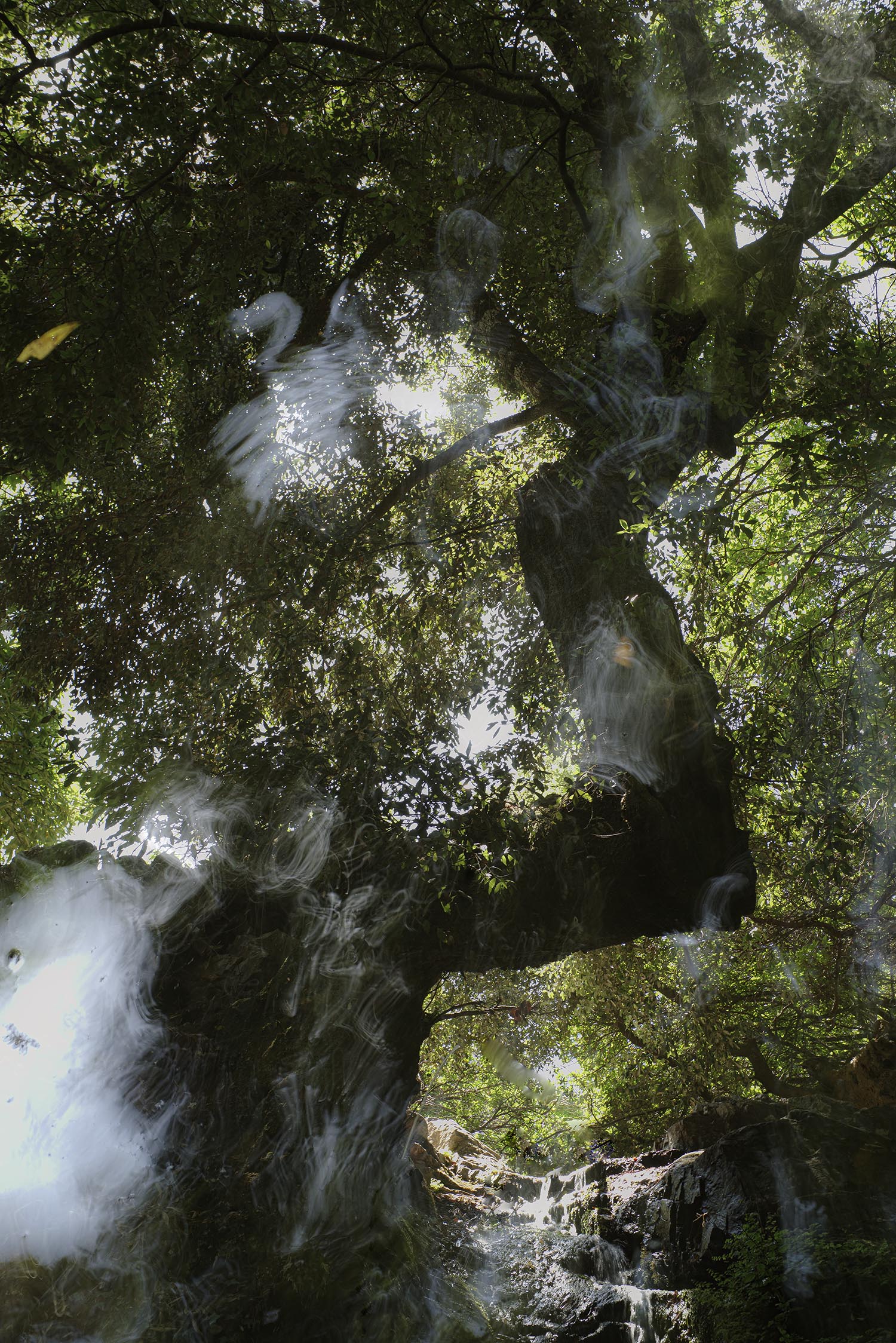
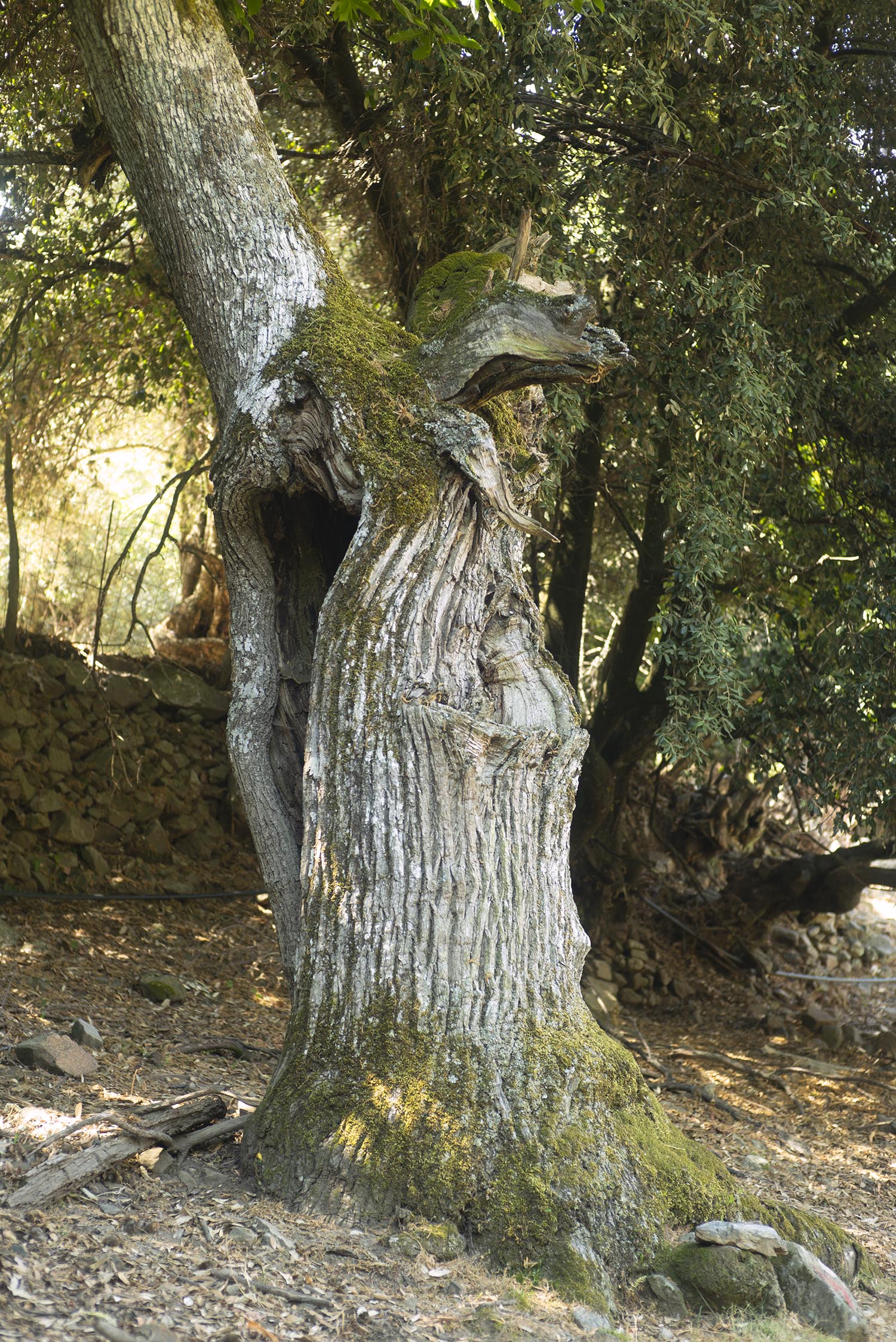
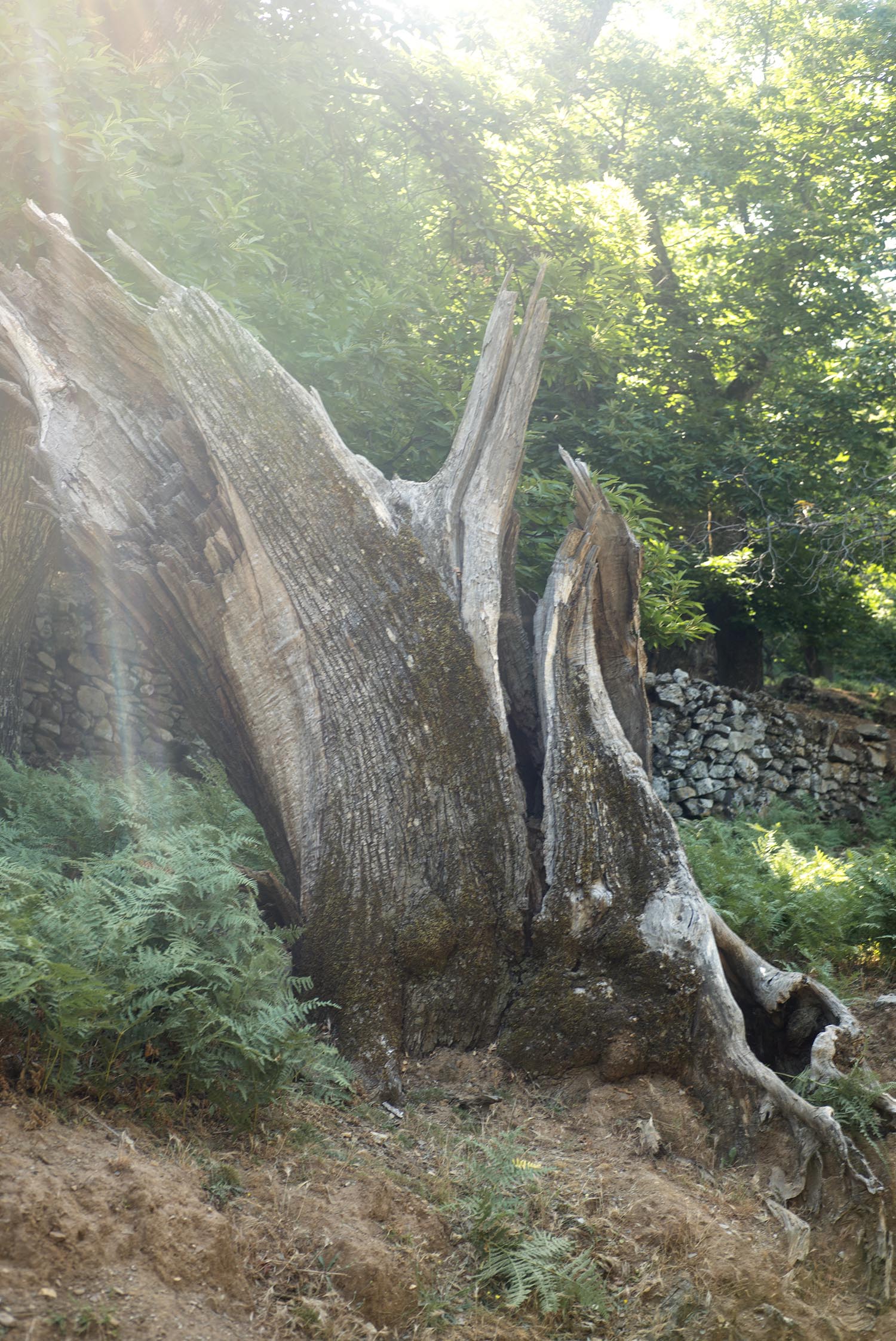
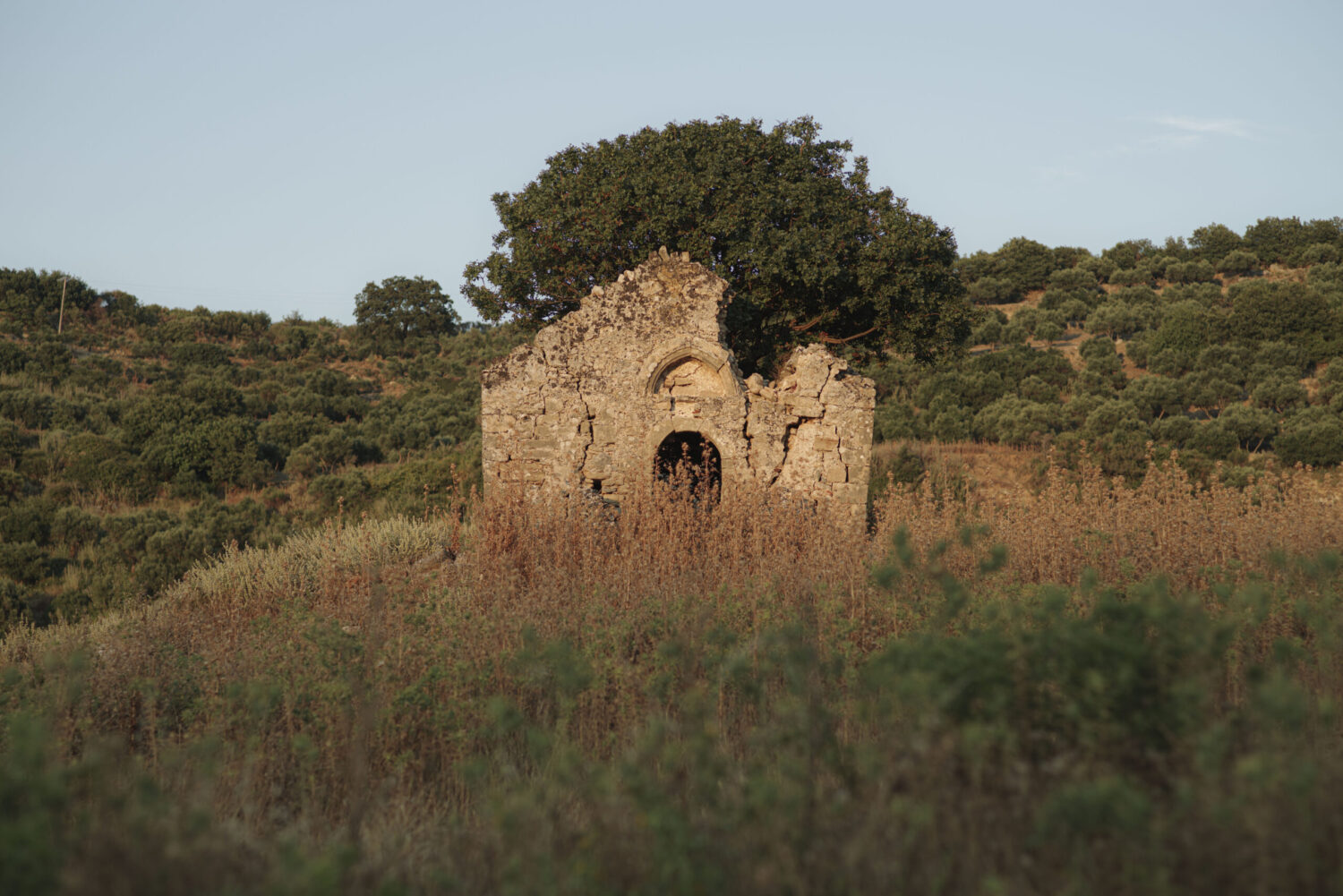
Why carob trees. Because the carob tree is a very important tree, historically, because it saved the population through the second world war. It is important in very extreme conditions, historical conditions. When nothing else can help you, then, the carob appears and says ”I will save you”. Do you understand? It is too important for me. And I felt like if I have a carob tree in front of me and talk to it, and I'm telling him – ”I have a feeling that you saved us and we have to do whatever we can to give you your lost value, to give you back your lost value, because it is too valuable”. It has possibilities that no other trees have. And even in the extreme climate change conditions, it can save us. When no other tree will survive, the carob tree will. And also, there is something else. This is the only one, the only tree, which gives us flour also. Not only sugar, but also flour.
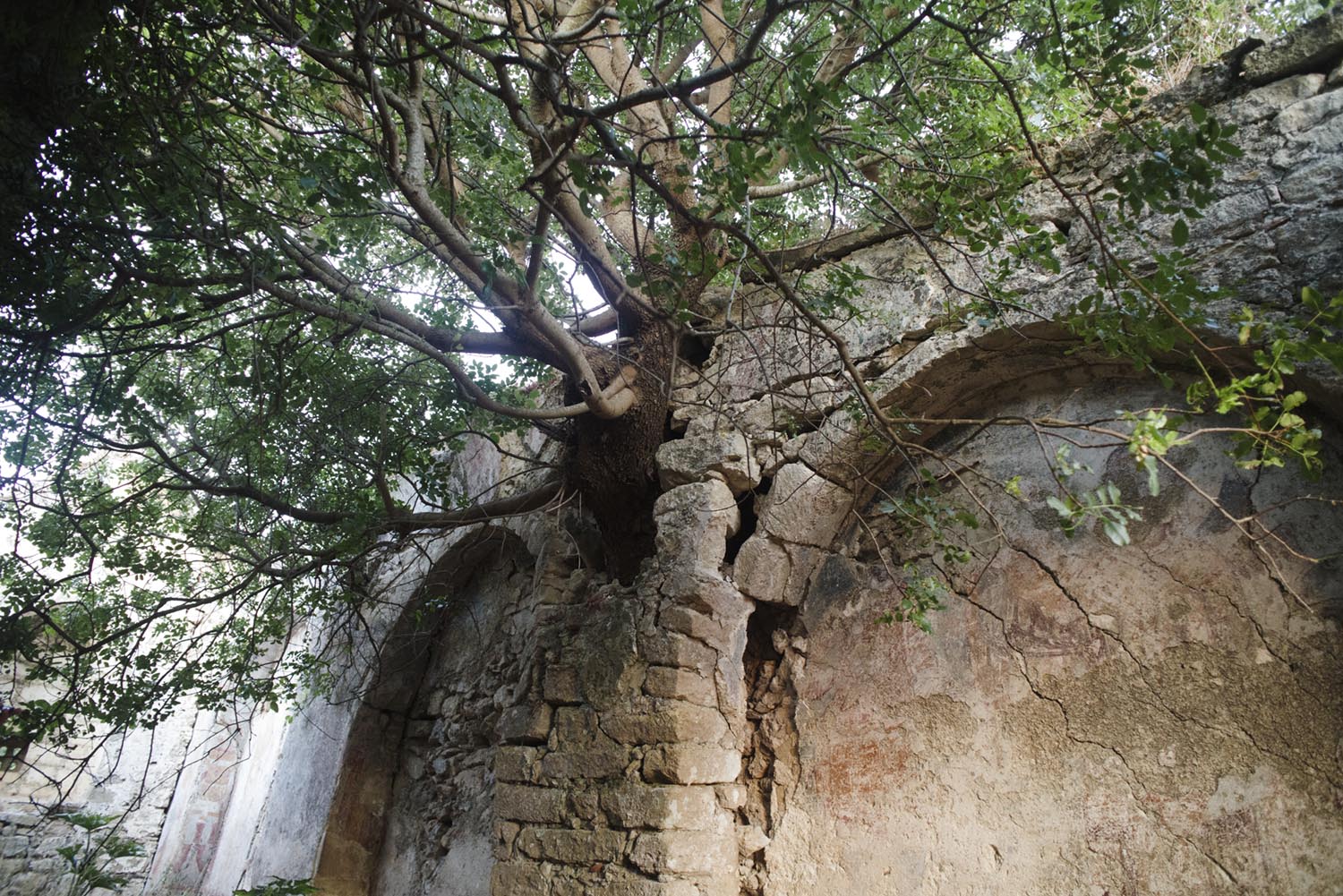
Part of the vision is to create the carob mill and create through the carobs and our efforts for the coming back of the carob to be a reference point of Mediterranean Europe for the carob. Connecting all the countries of the Mediterranean Europe for the coming back of the carob, giving it more value. I would love to create here a carob foundation for culture, gastronomy and research. And every year to have a festival with festival here.
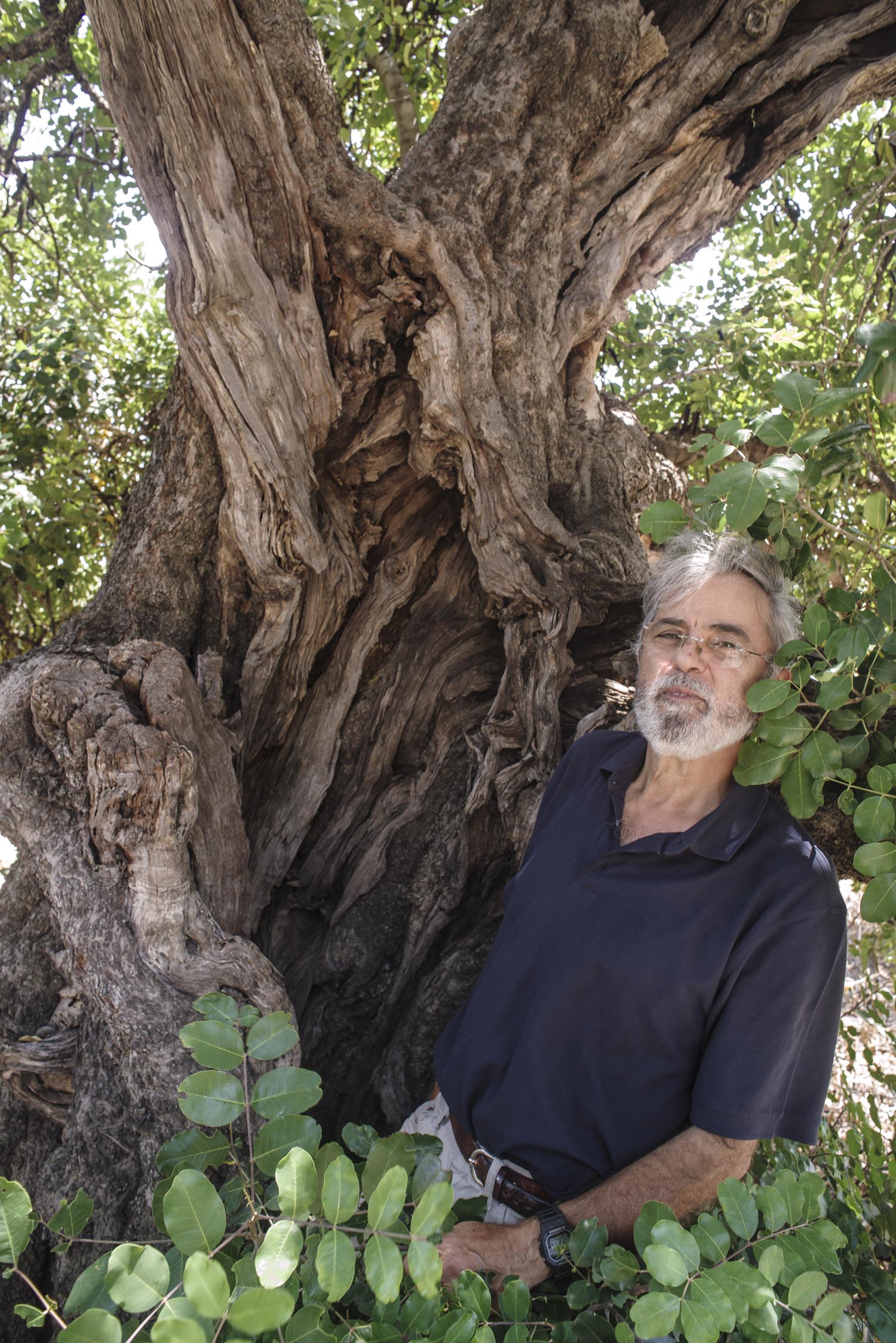
Manolis Loukakis expert for breeding
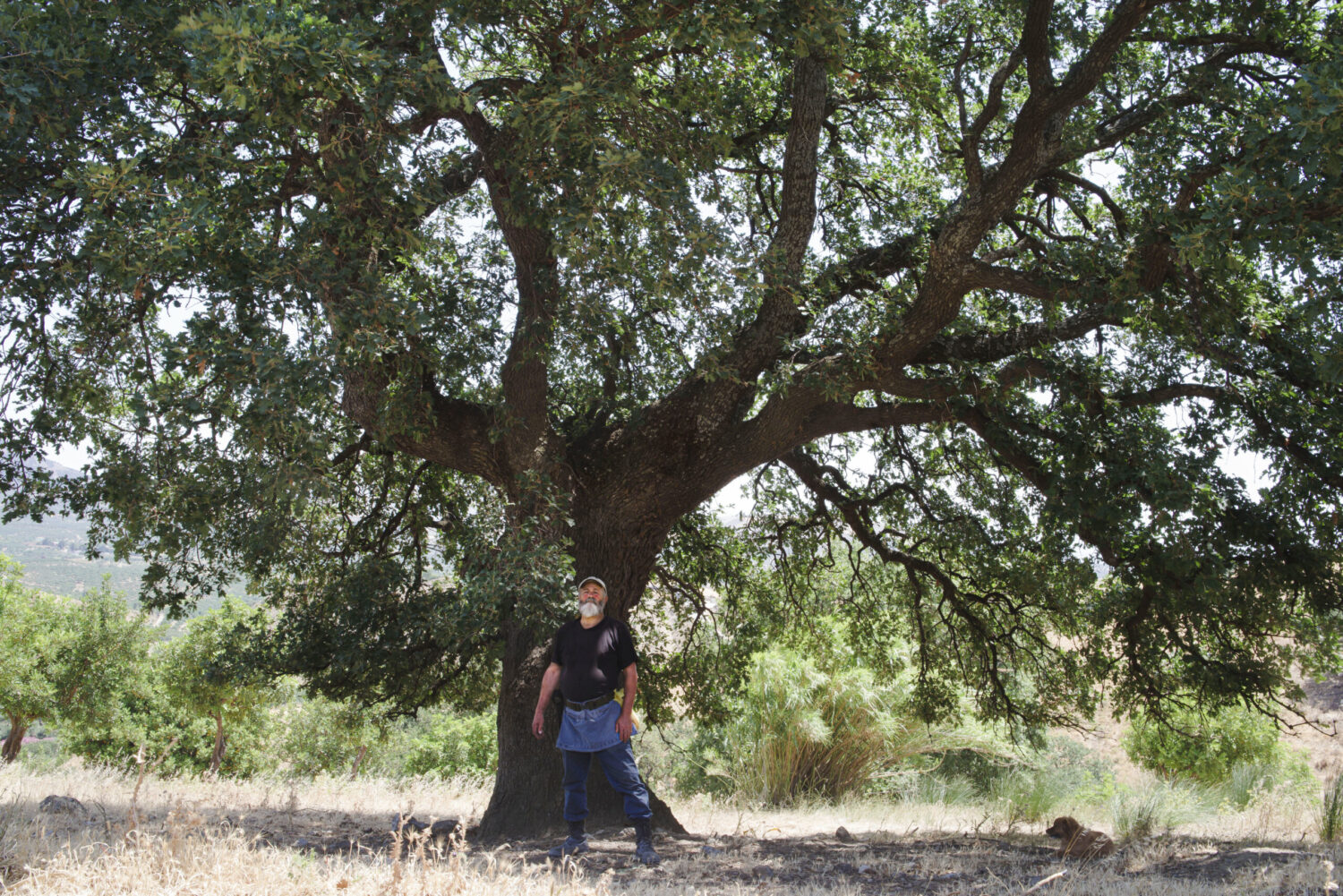
Kostas Karatzis is planting new trees
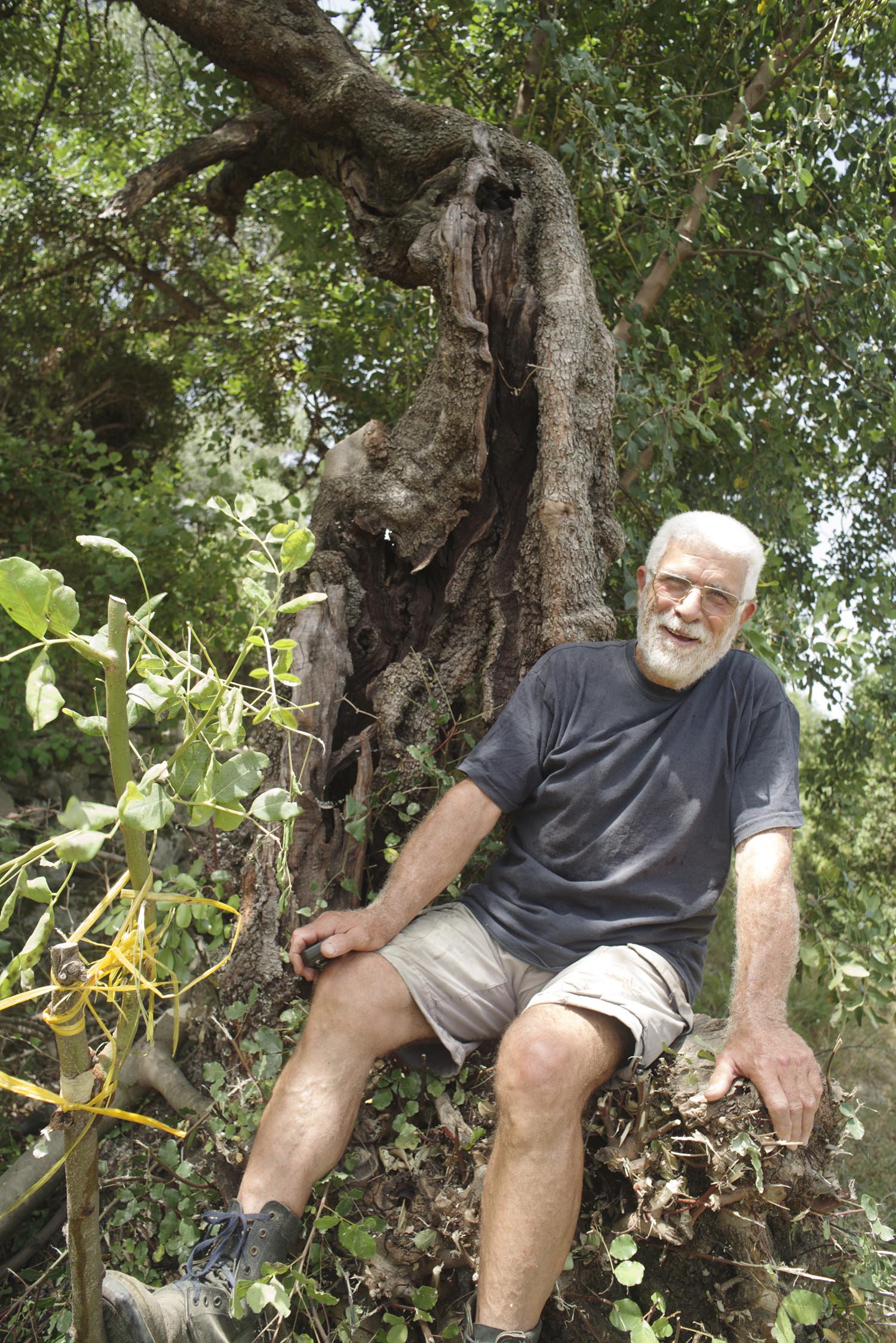
Manolas Iliakis - is devoted to land cultivation, he loves trees, and although he is an architect-engineer and worked in the public sector, but most of all he is a farmer
To develop a cultivation on the island and not only on the island, but on the island because we're here, by giving the motives to the farmers and also help them through their searches, giving them the right information how to cultivate, the right way to cultivate and which type of carob tree would be right and give them also the motives to create new products of food and whatever.
(about ”equally”)
In order to survive, the human beings, we have to be serious and to understand that we don't have differences, we're all human beings and we must live equally on this planet, and we must respect the environment.
We have the same rights everywhere. And to stop all this moving of the population because of the wars. So maybe you're going to tell me that I'm a romantic but I'm very practical, very realist.
And in this effort the carob tree is going to help us, and I know it.
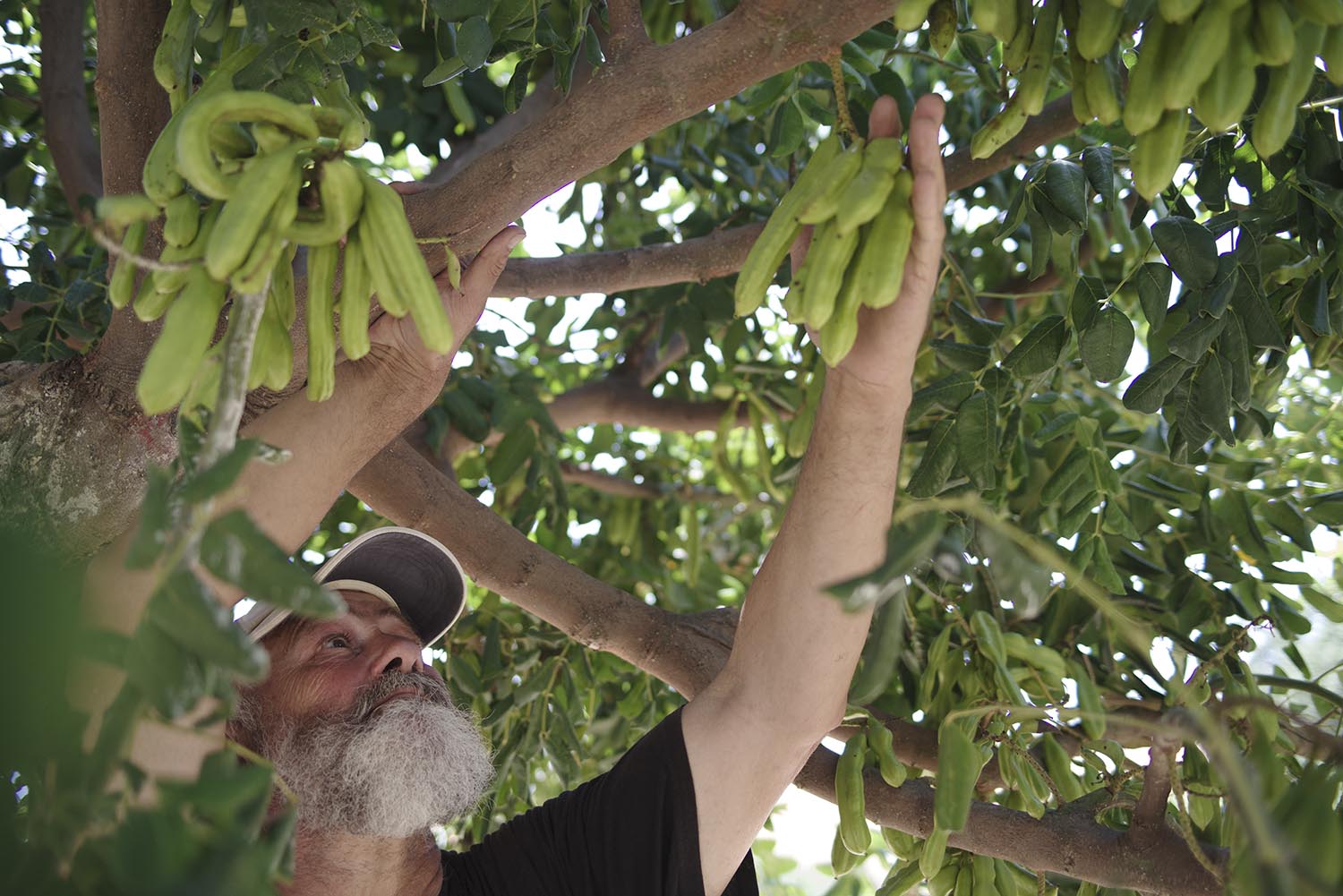
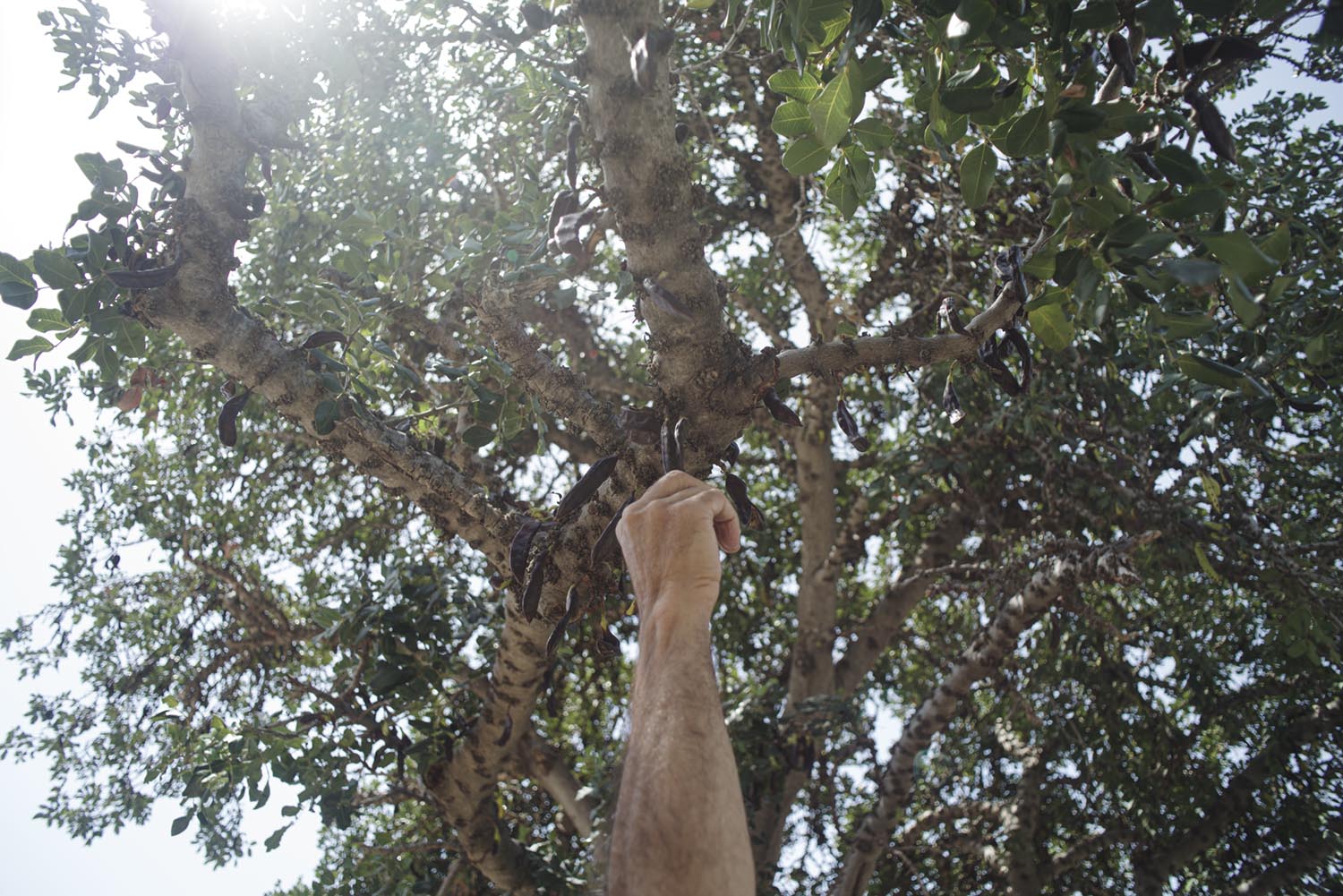
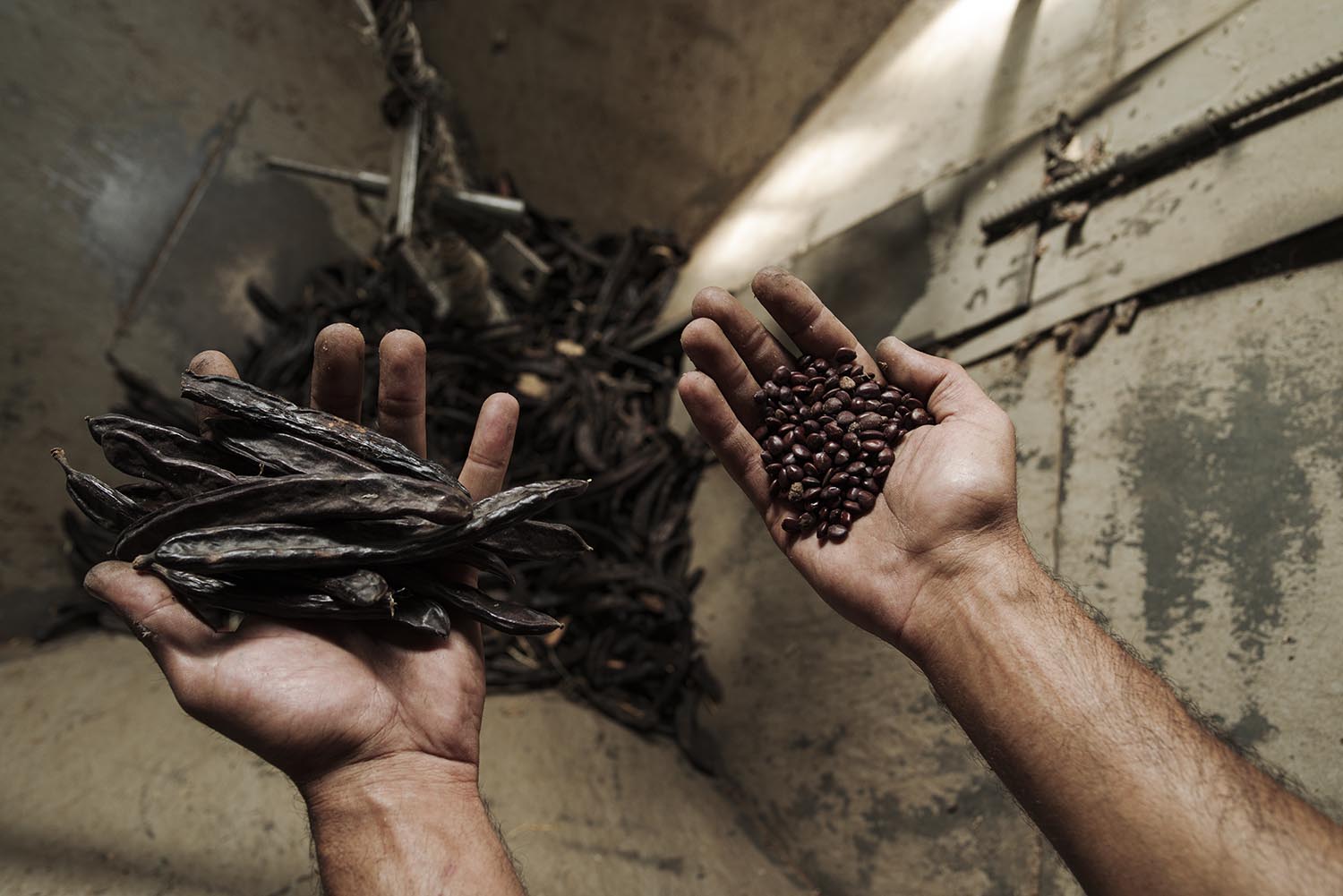

The estimate is that 33 Mio olive trees live on Crete ! and number is still growing..Monoculture! Carob and Chestnut trees that save them of hunger in II WW are now an exception
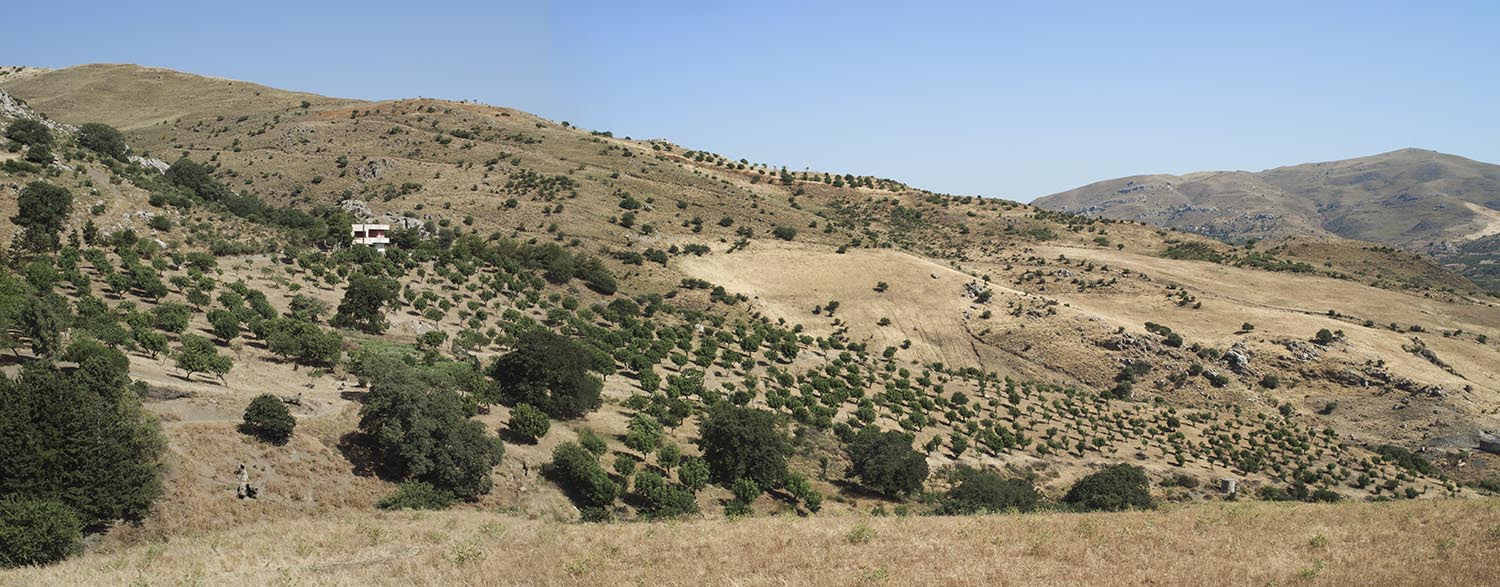
AND one of exeptions is Kostas farm, where he planted many jung carob trees and are alredy giving froots
I'm trying to do my best and I don't have, in a way that you put it, expectations – ”So I'm trying to do this so tomorrow I'm going to have this result, otherwise I don't do anything...” – no. My whole life I'm doing this: I'm trying, trying, trying, trying, because there is no other way. And if something good is going to happen, I'll be happy. If not, I'll still try to do my best.
Kostas Karatzis is big sucess story of Korinas dreams to bring carobs back. Kostas lives alone but his inthusiasem, positive atitude and ekscetional results are a great rool model for others to learn and plant carob trees on Kreta. Alone he does work for 10, also doing products from carob- carob syrup (best in Kreata) and carob brandy
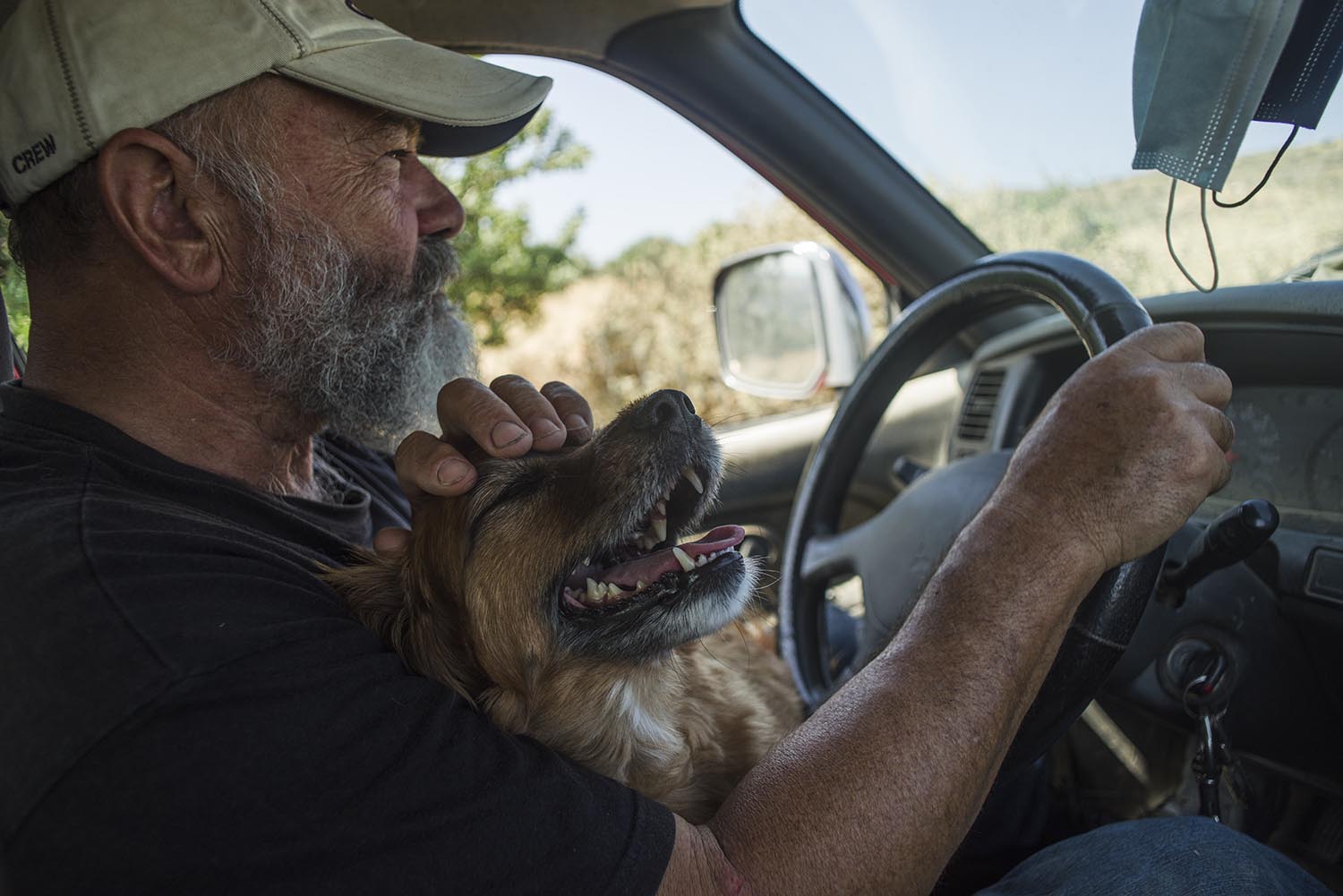
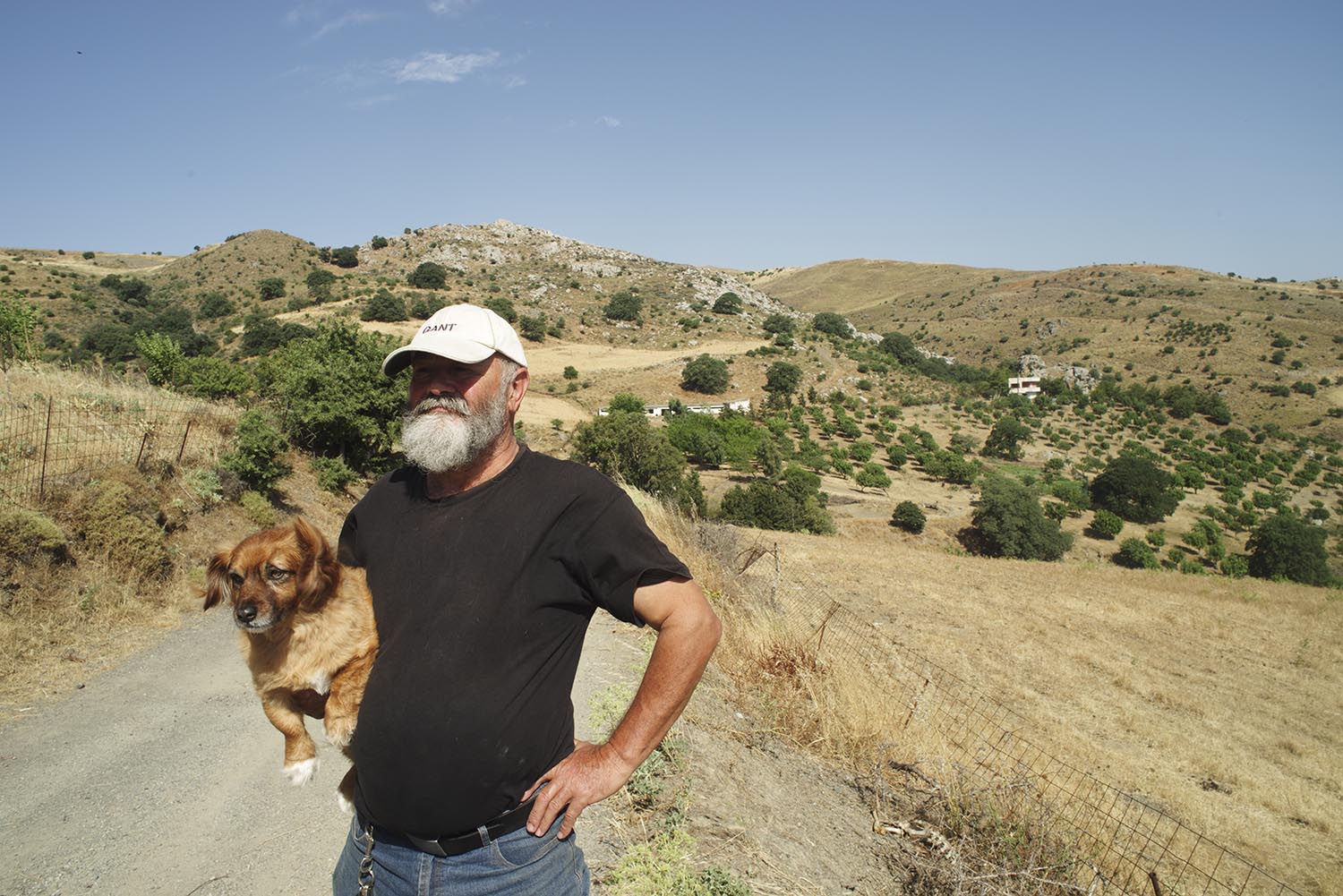
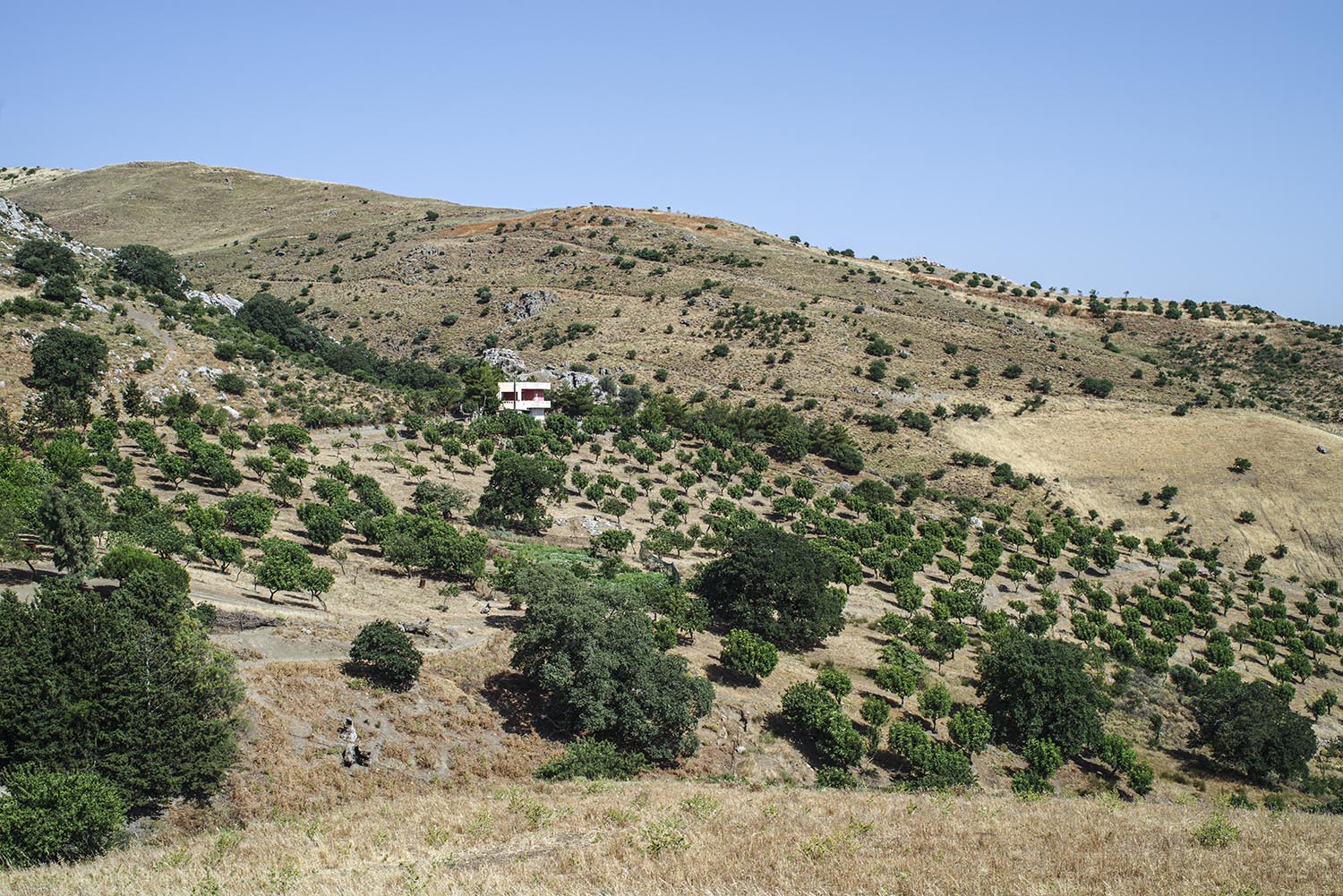
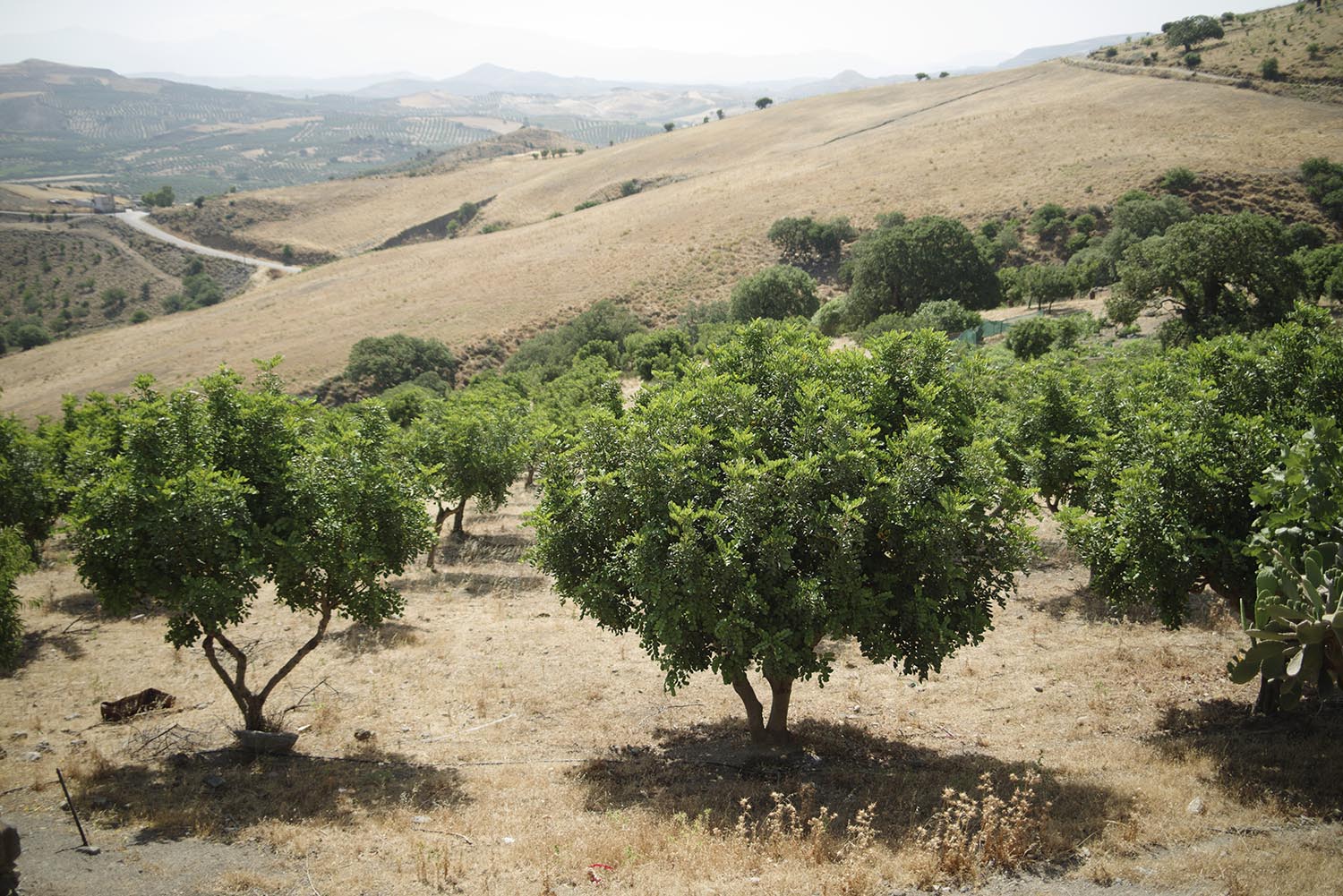
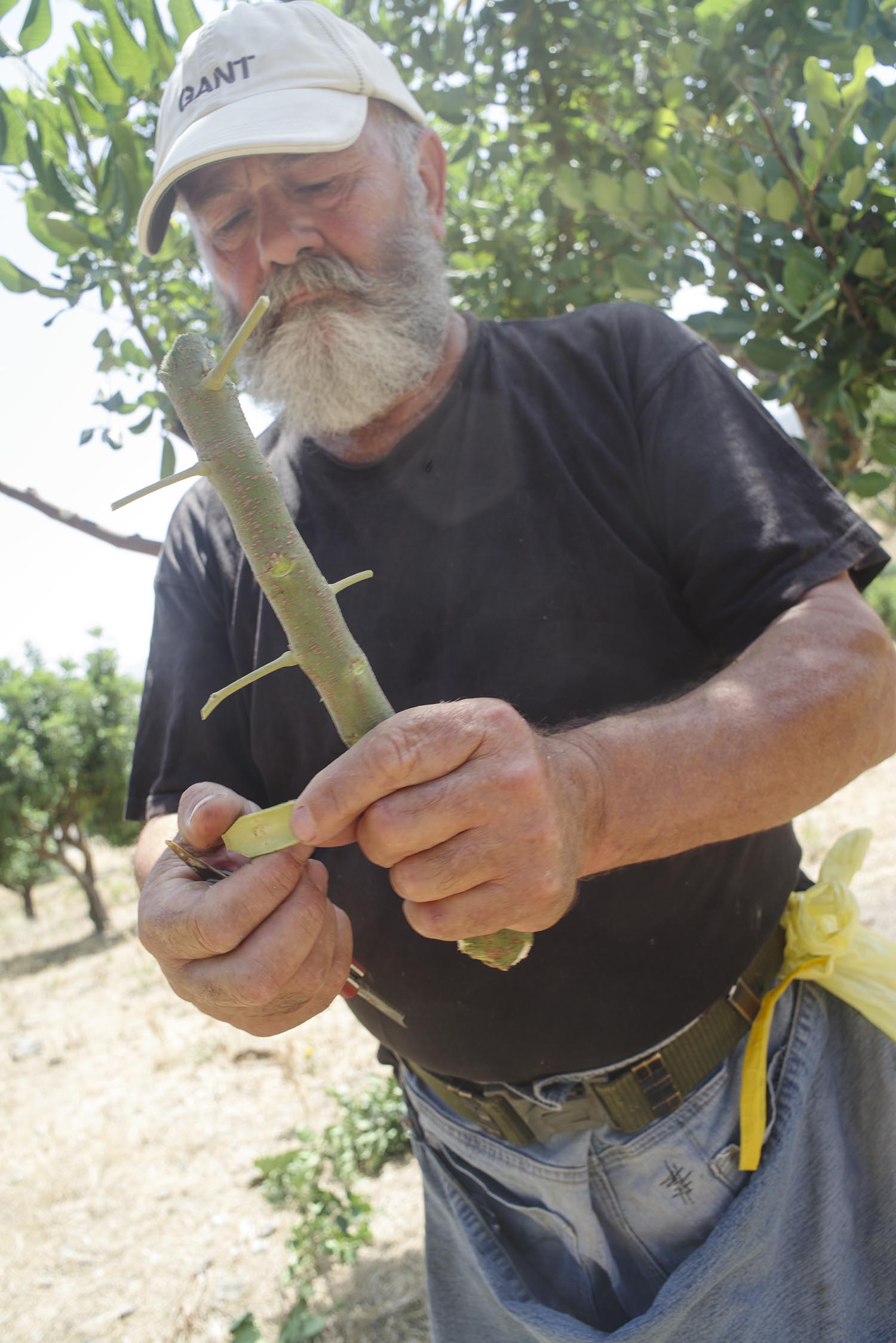
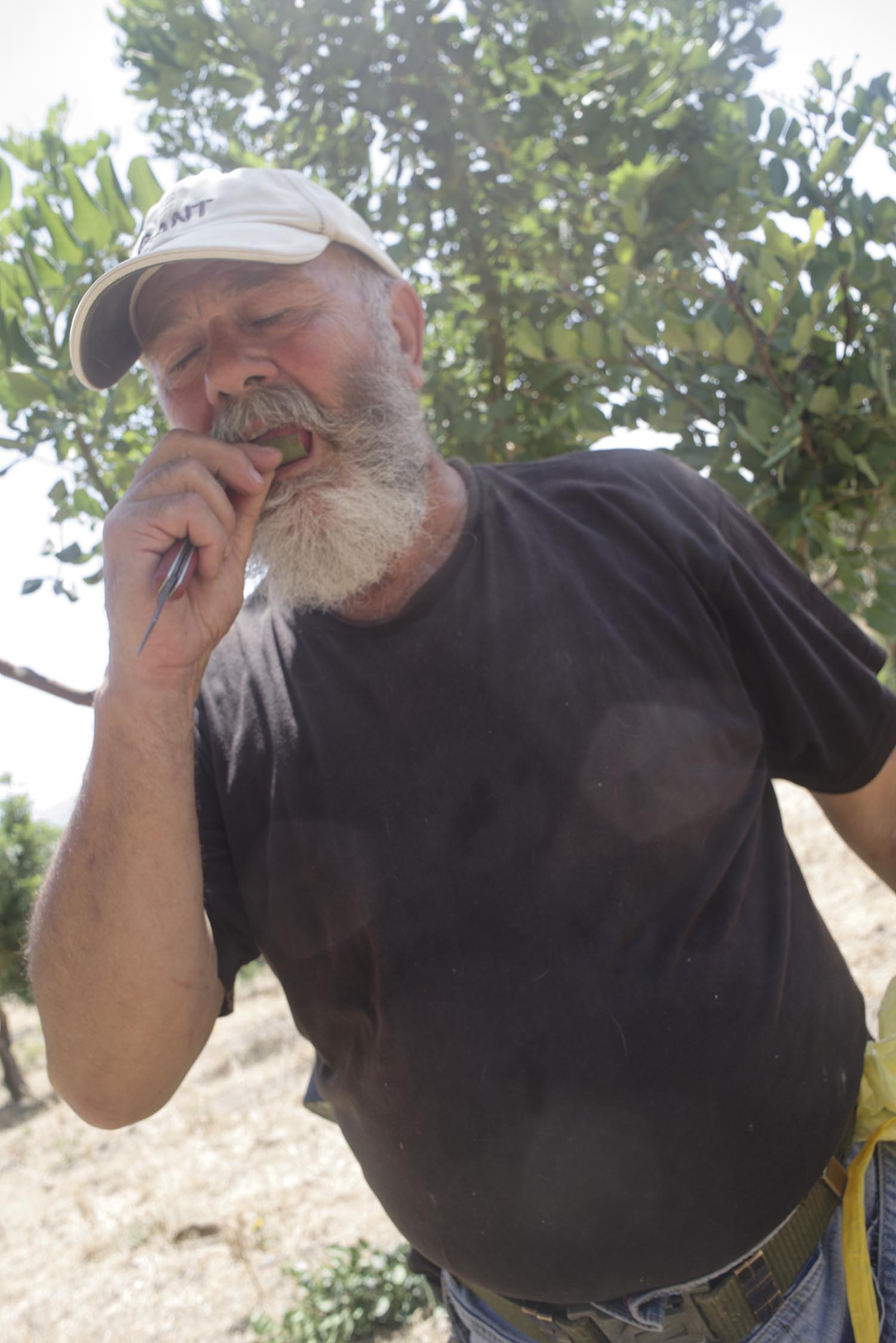
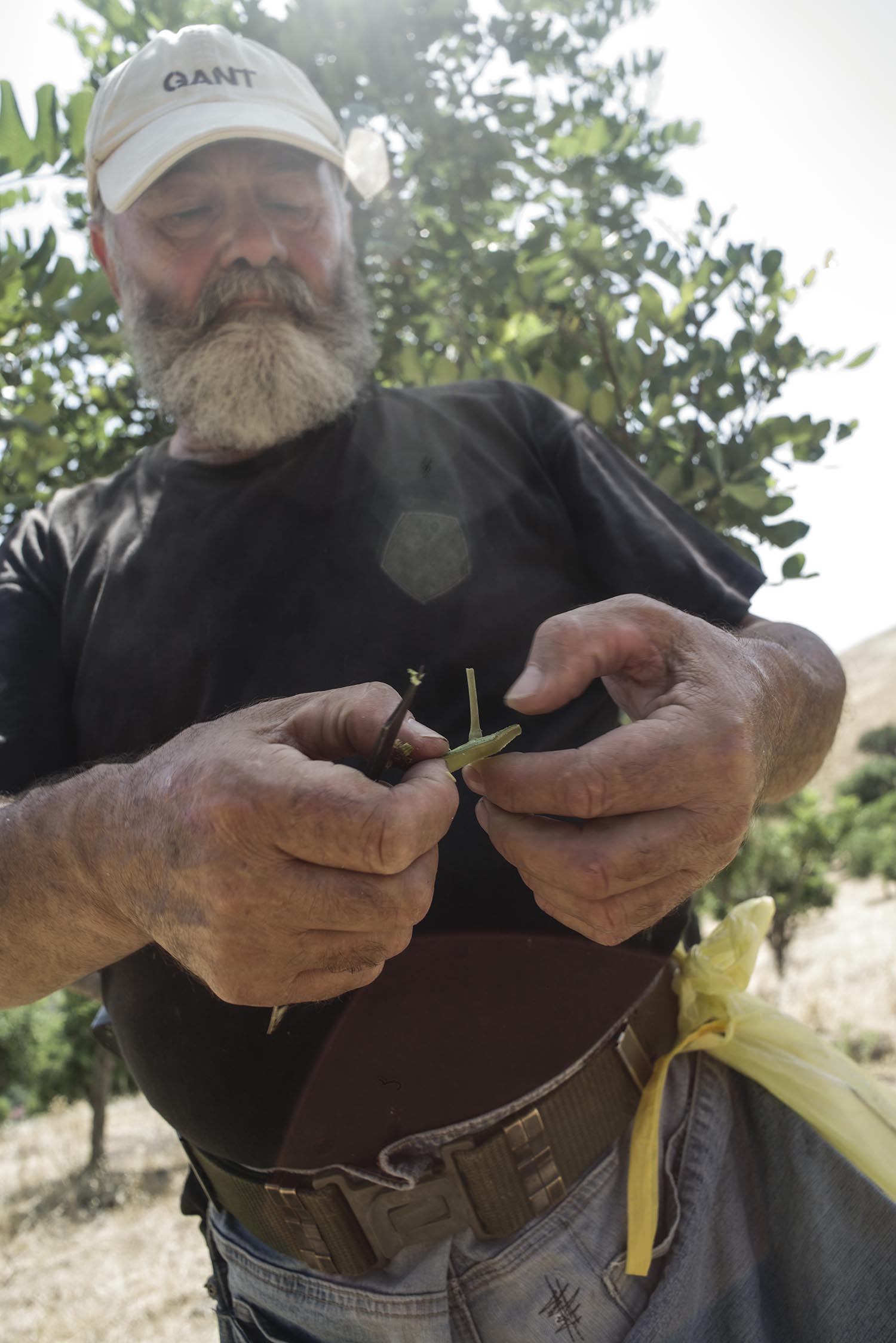
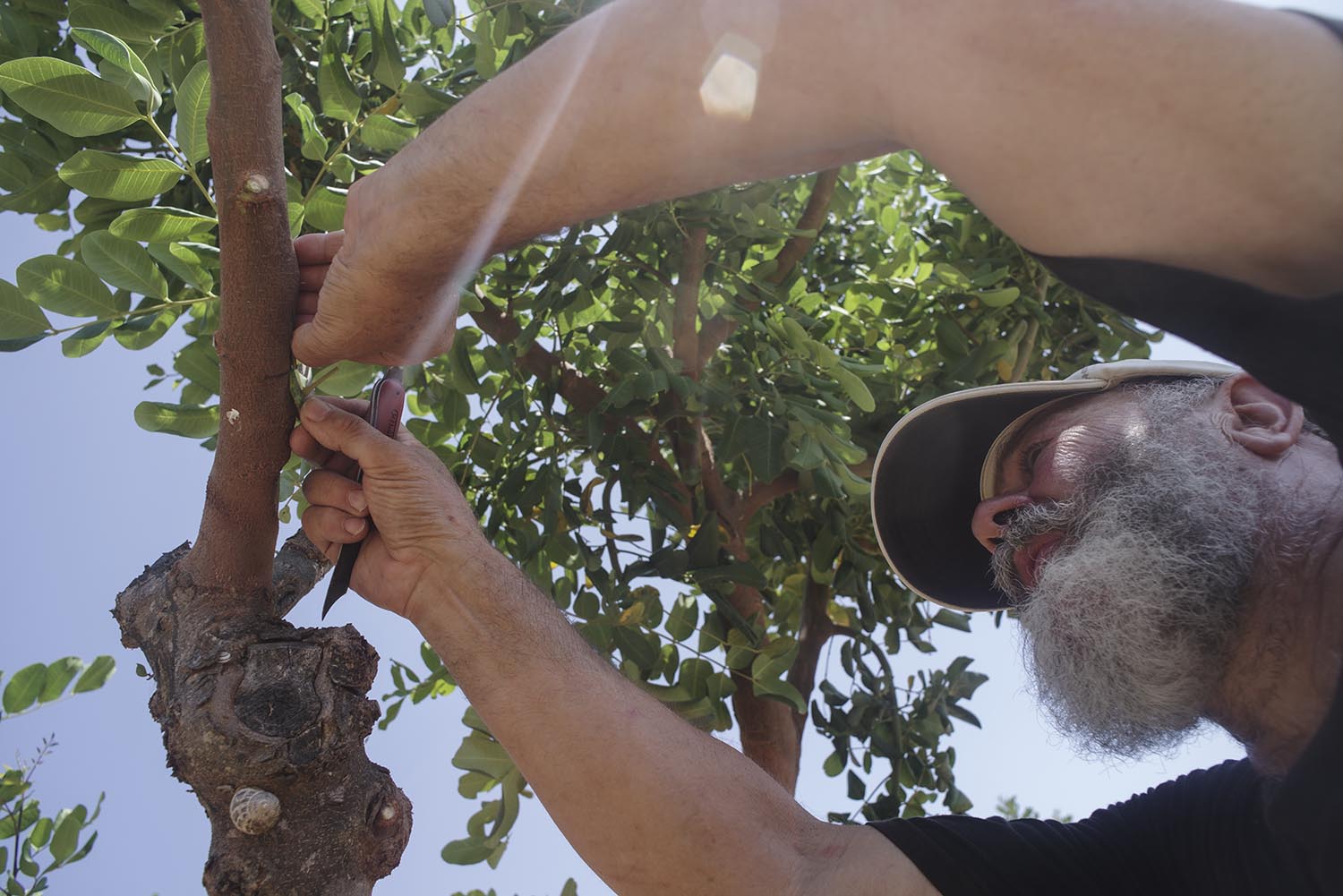
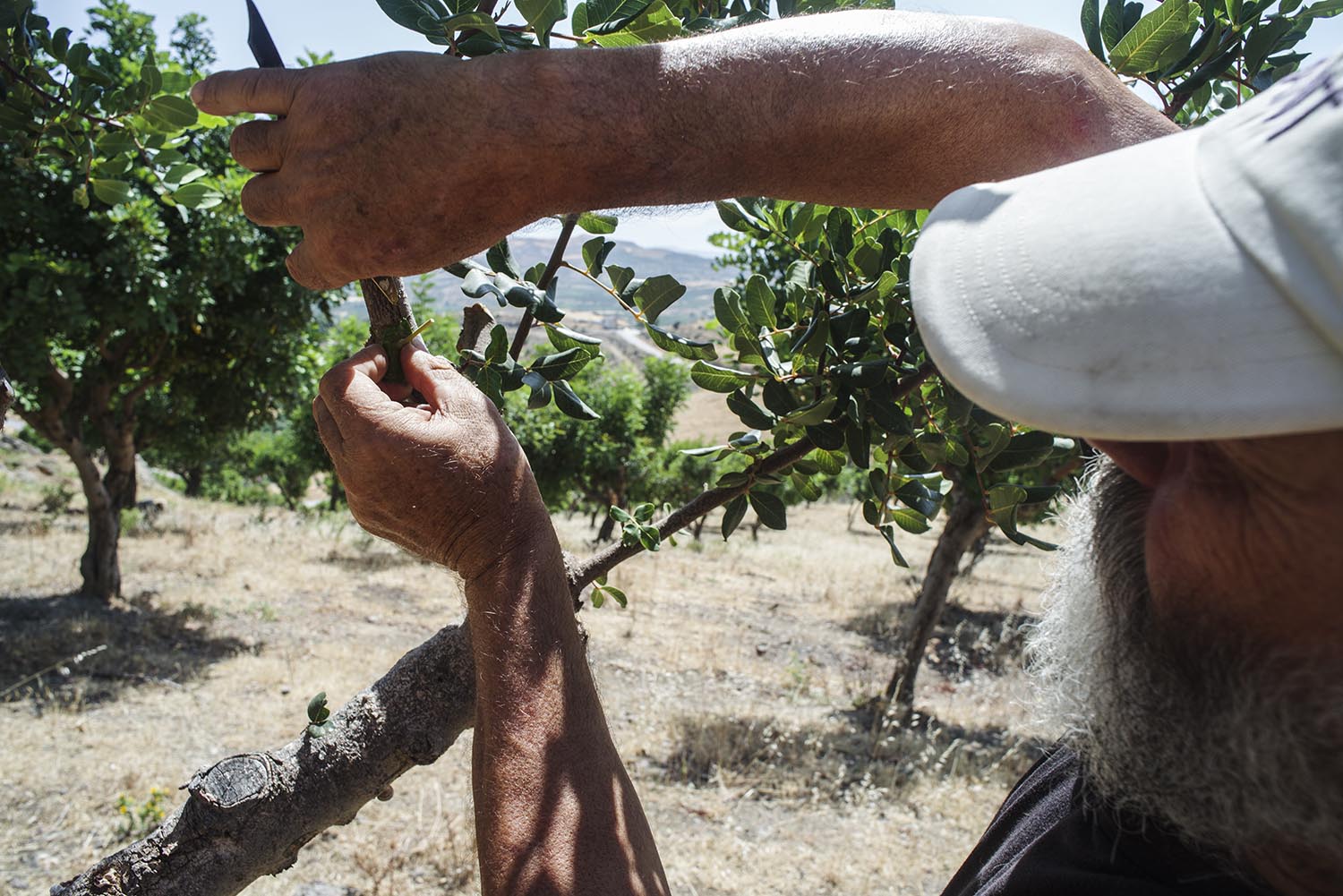
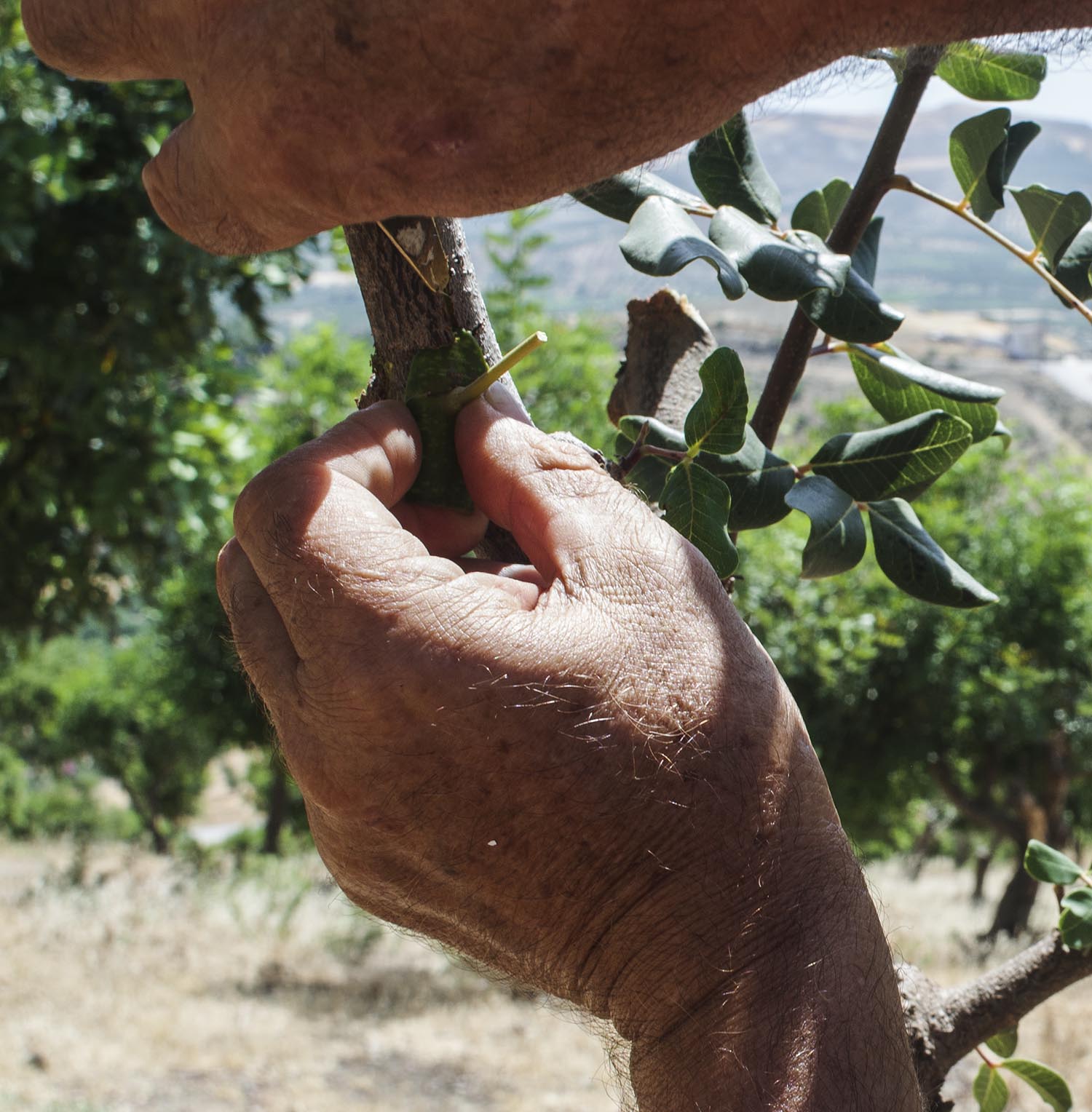
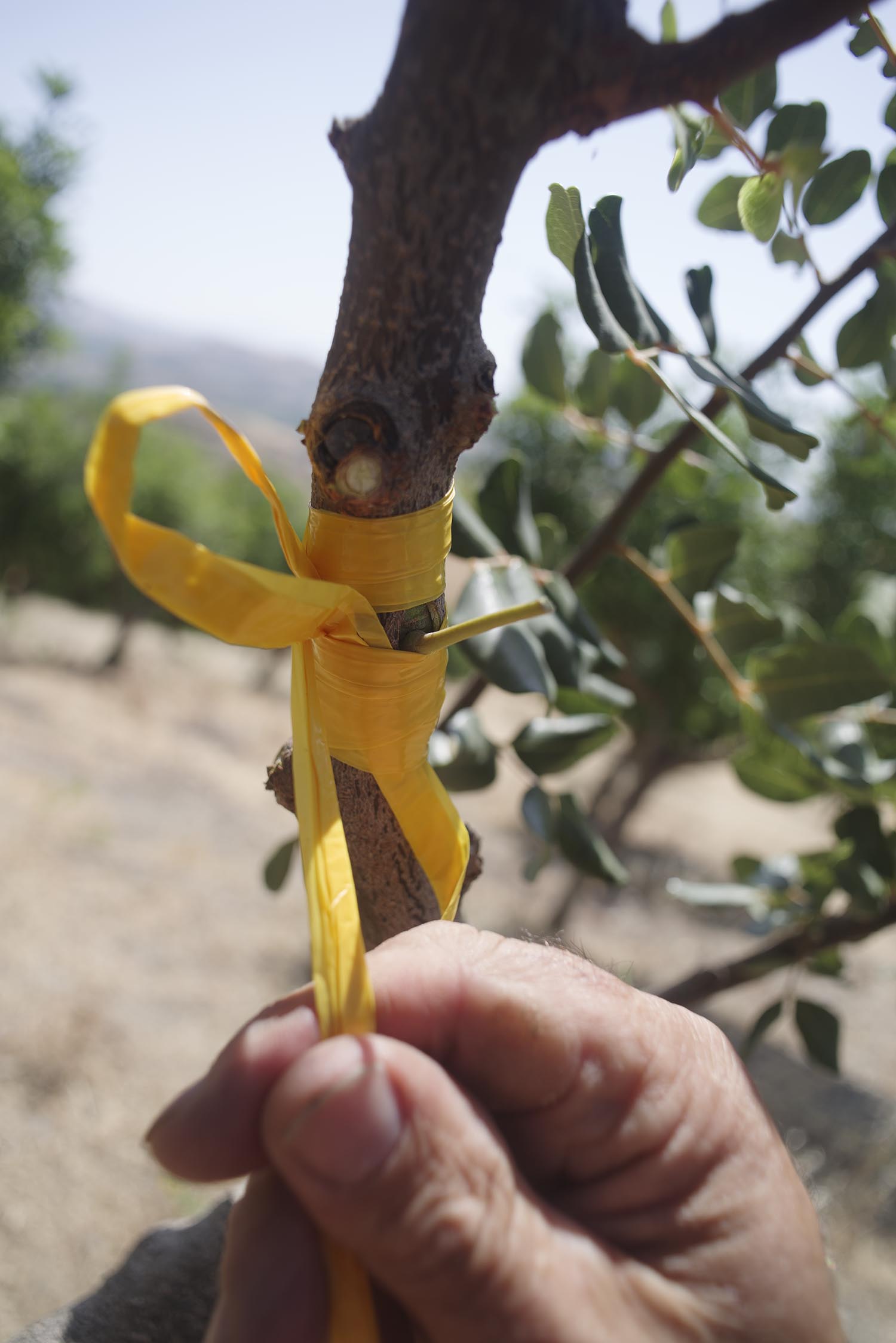
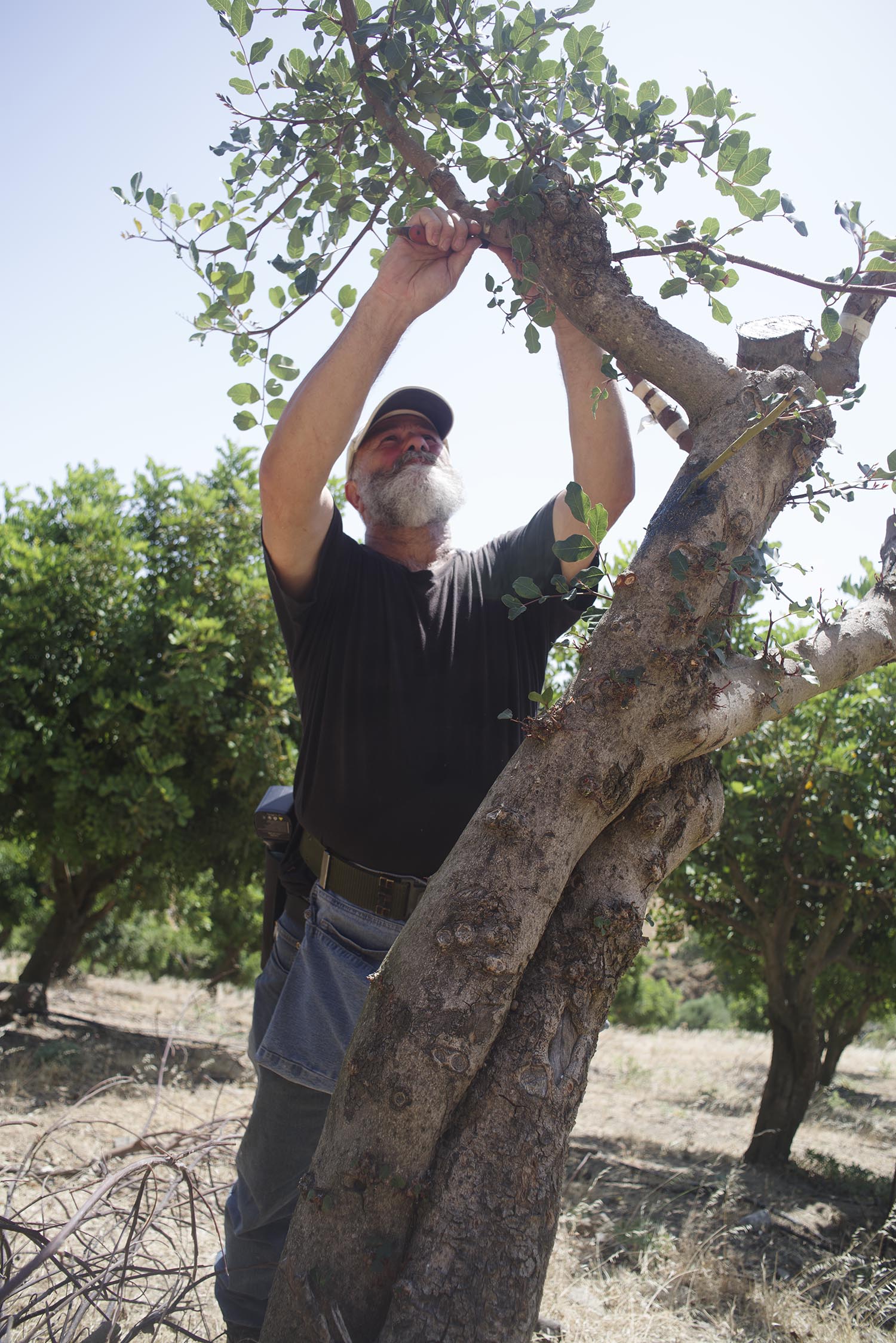
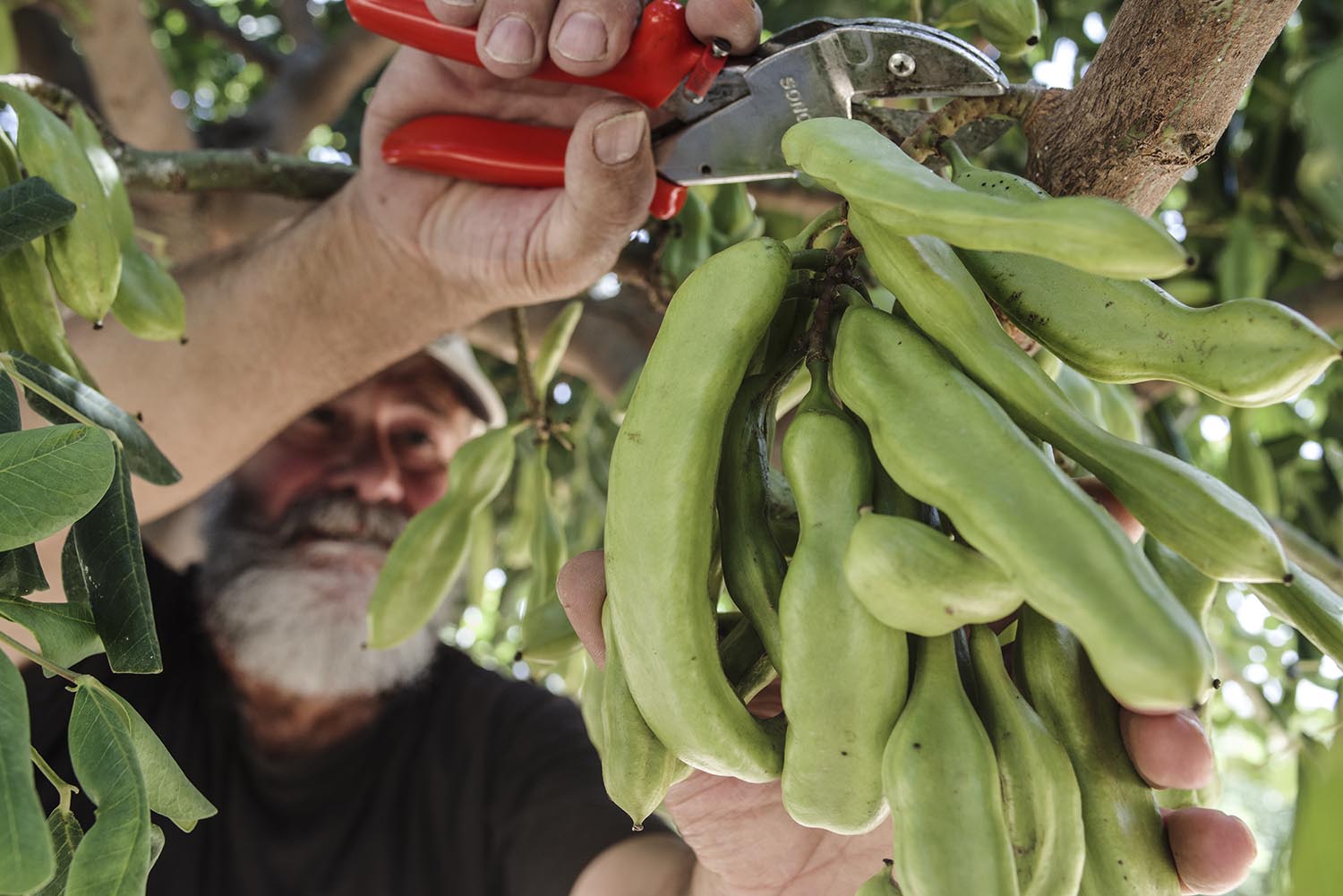
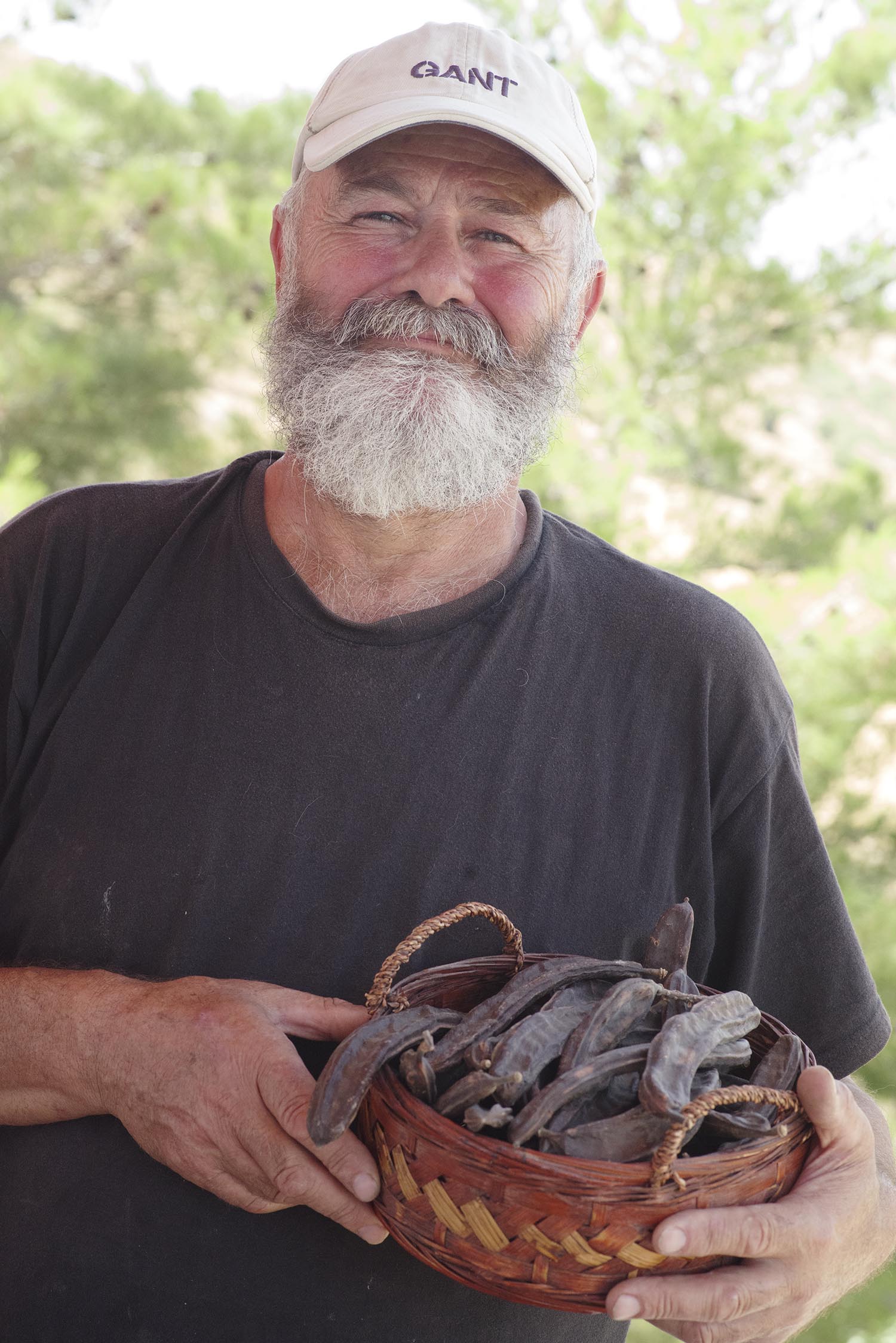
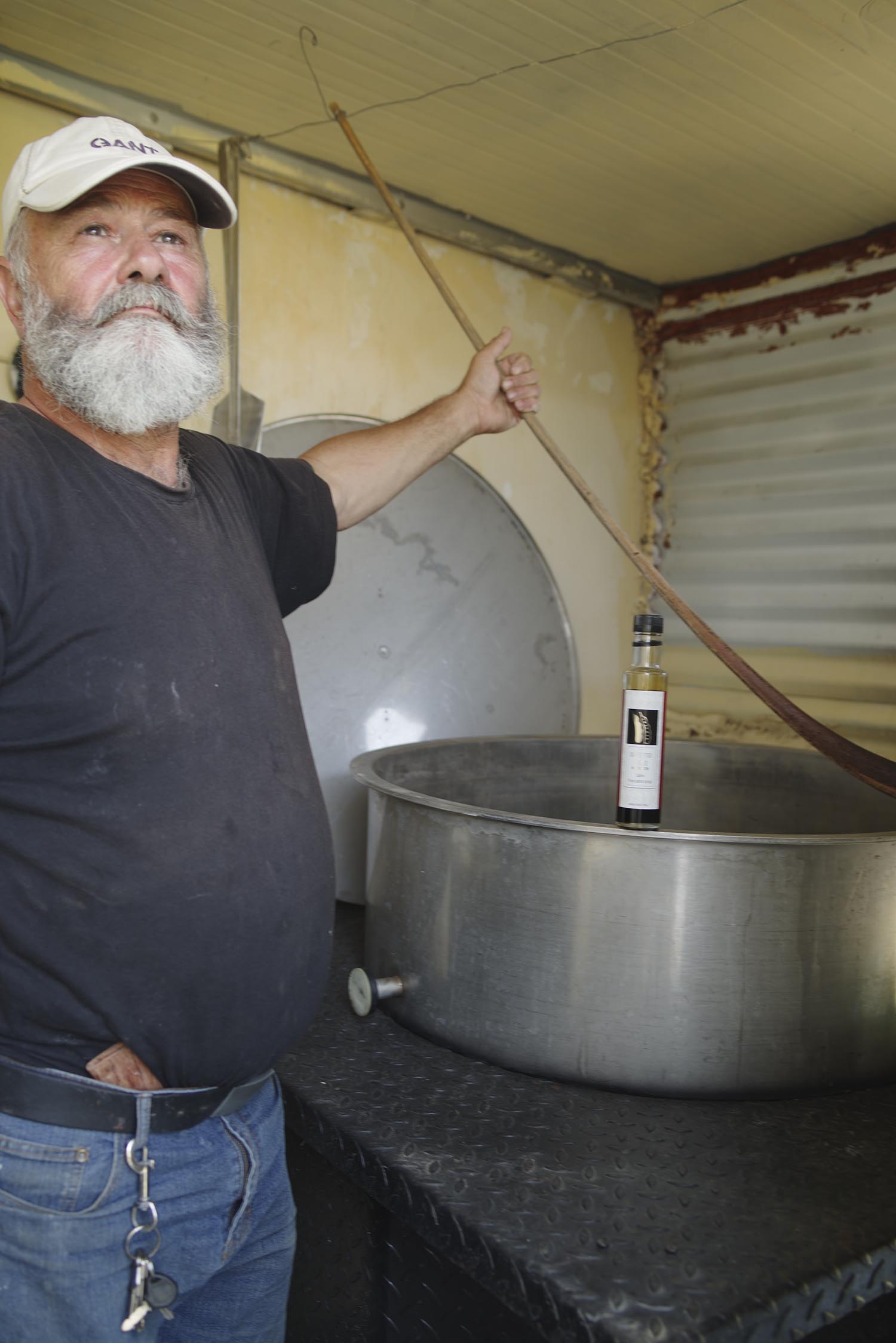
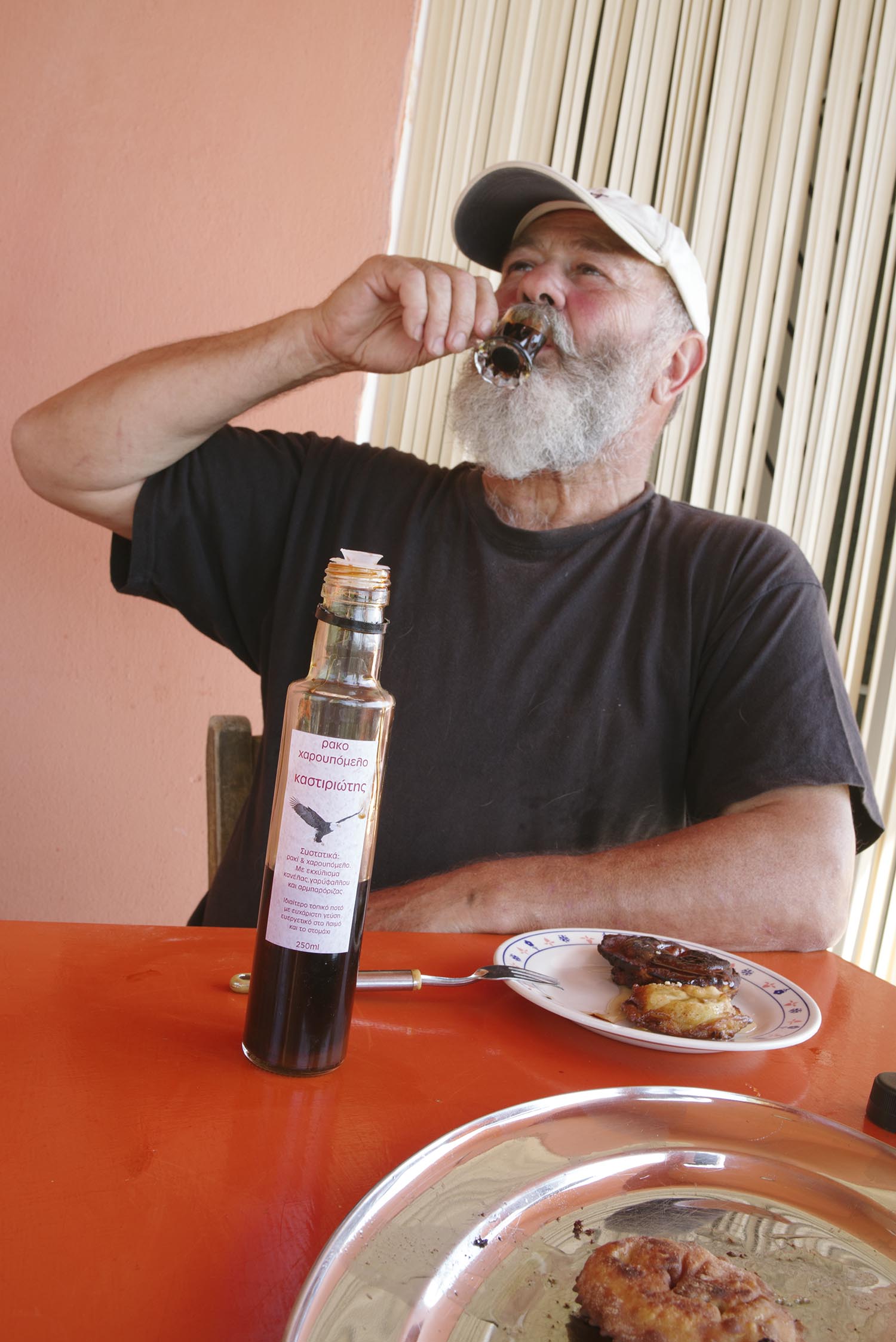
Corina, about carob syrup. My mother takes one spoon every day, every morning. This is medicine.
And for me it's very important, because this carob syrup is made not only with the carob (fruit?), it's made by all the carob and the seeds. The seeds have proteins.
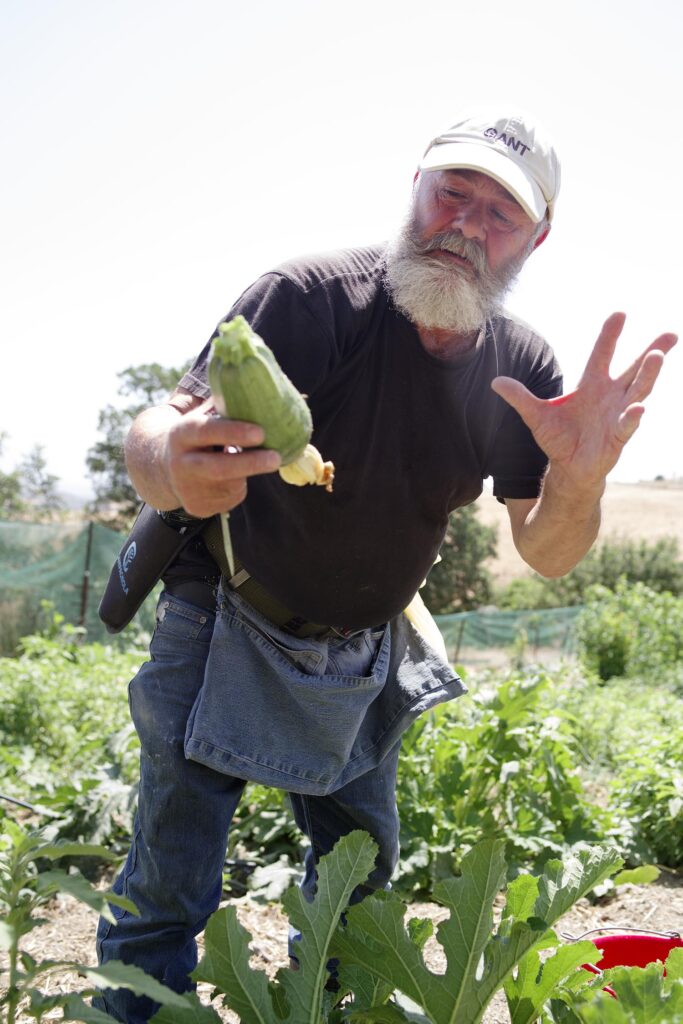
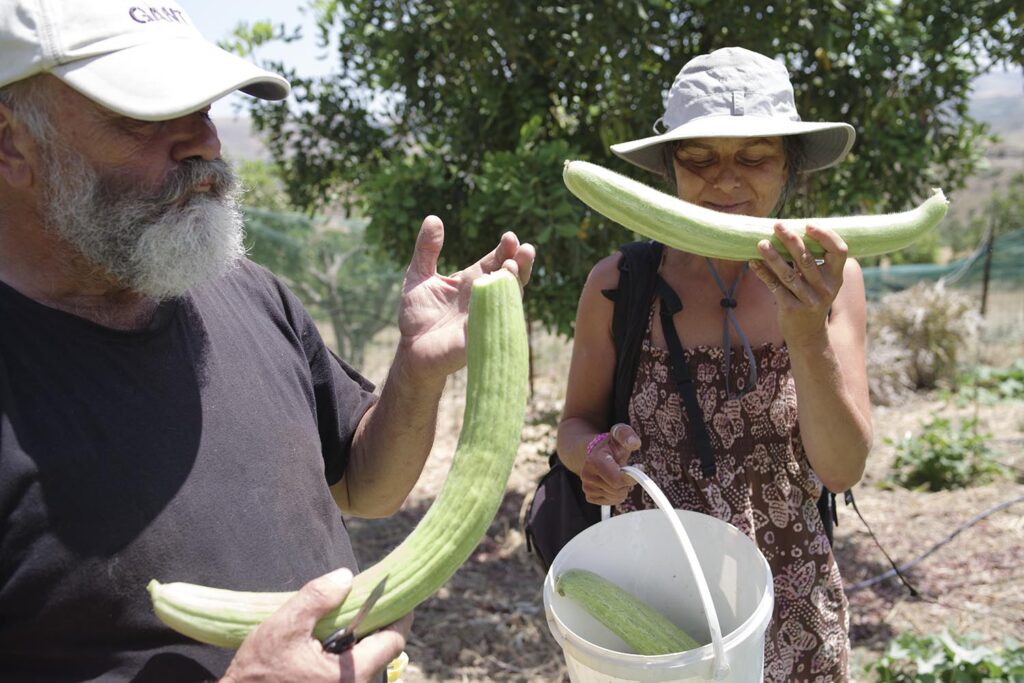
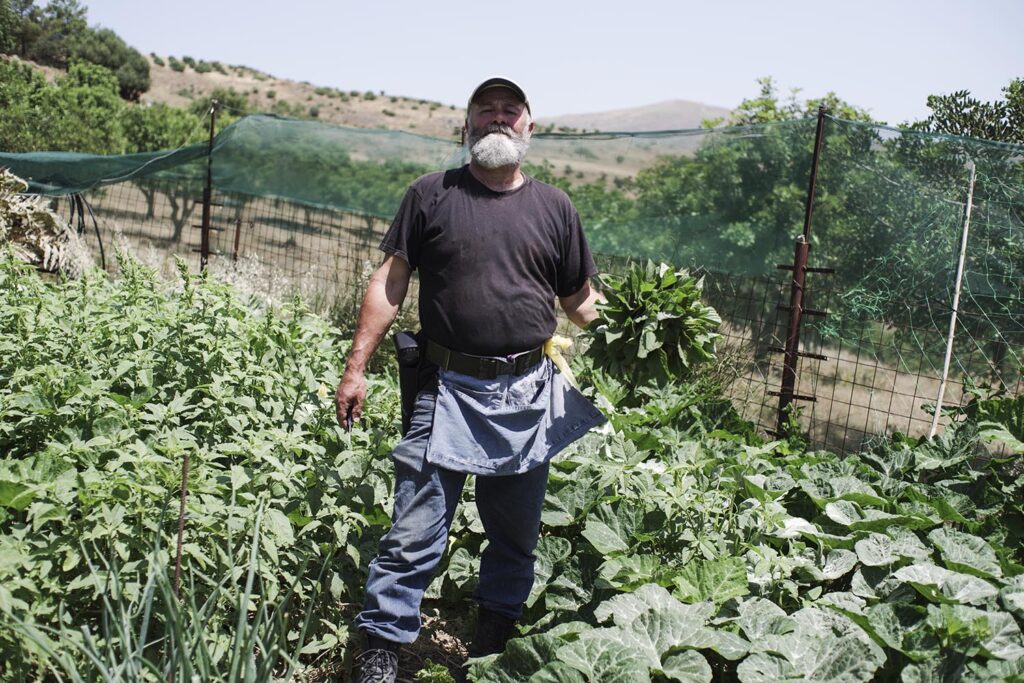
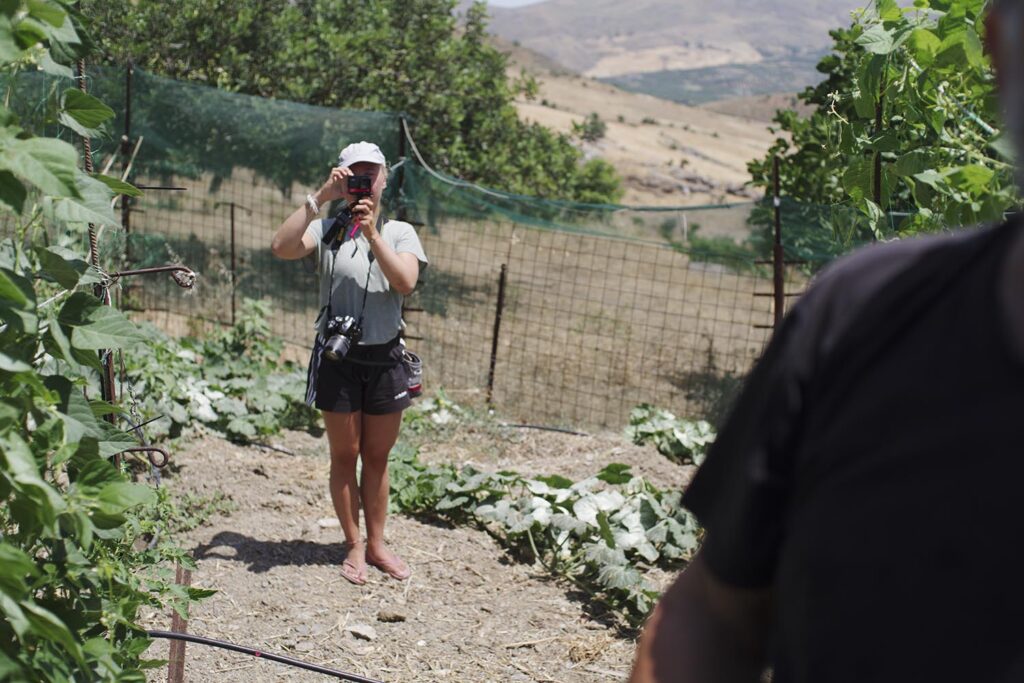
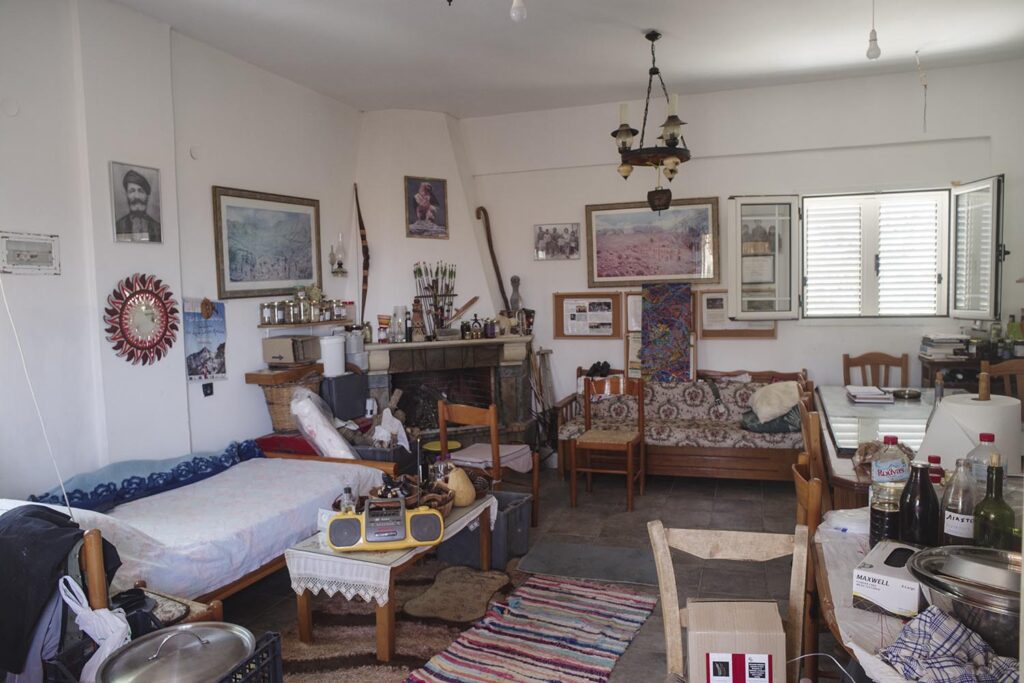
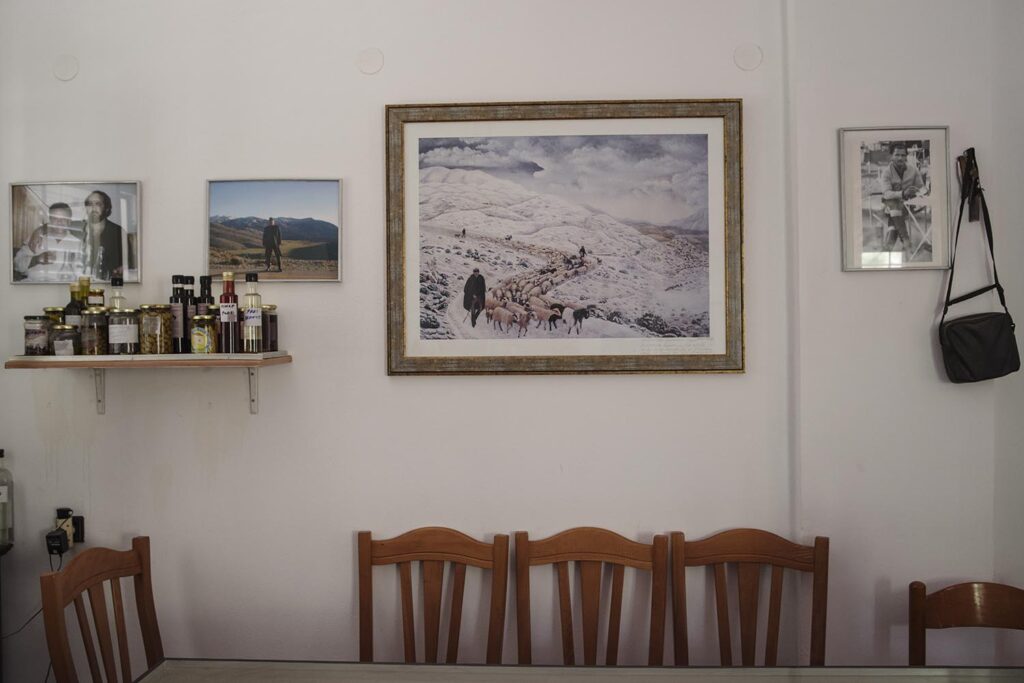
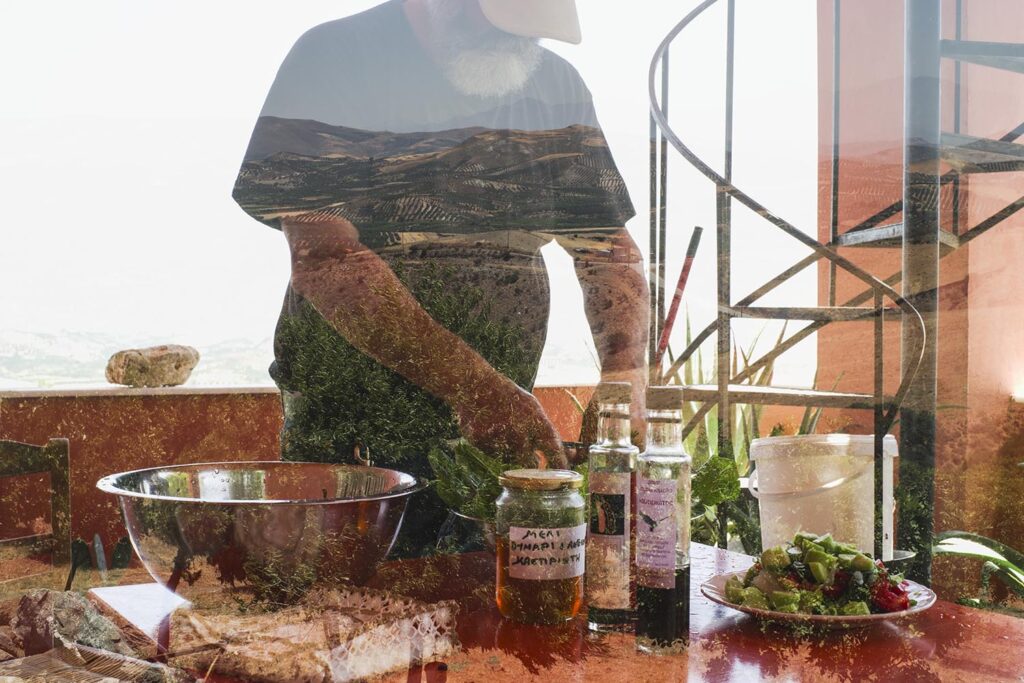
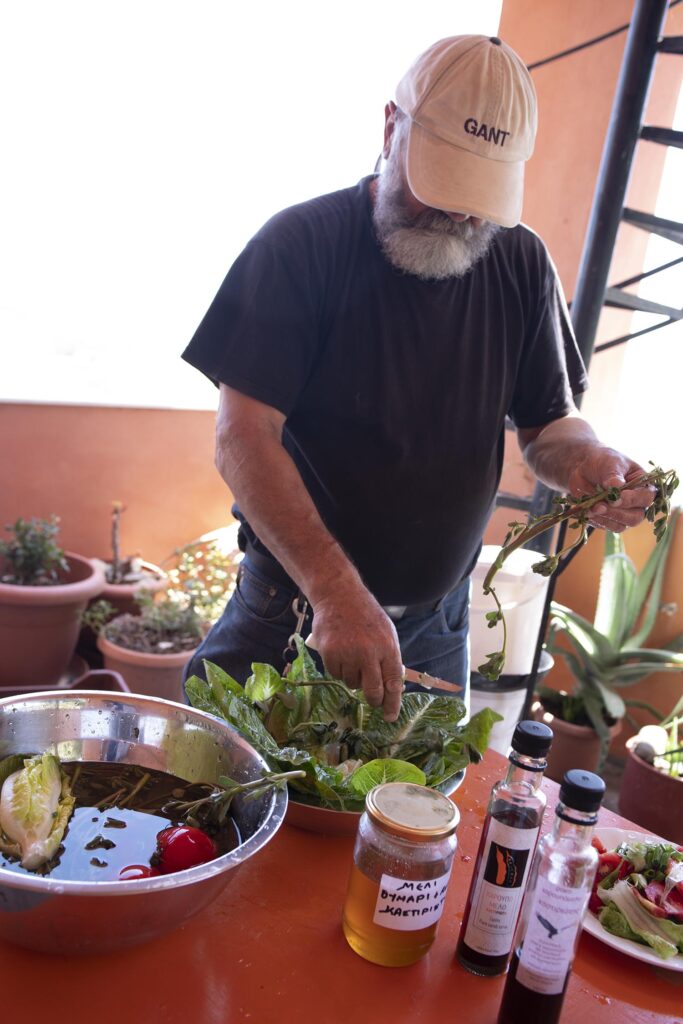
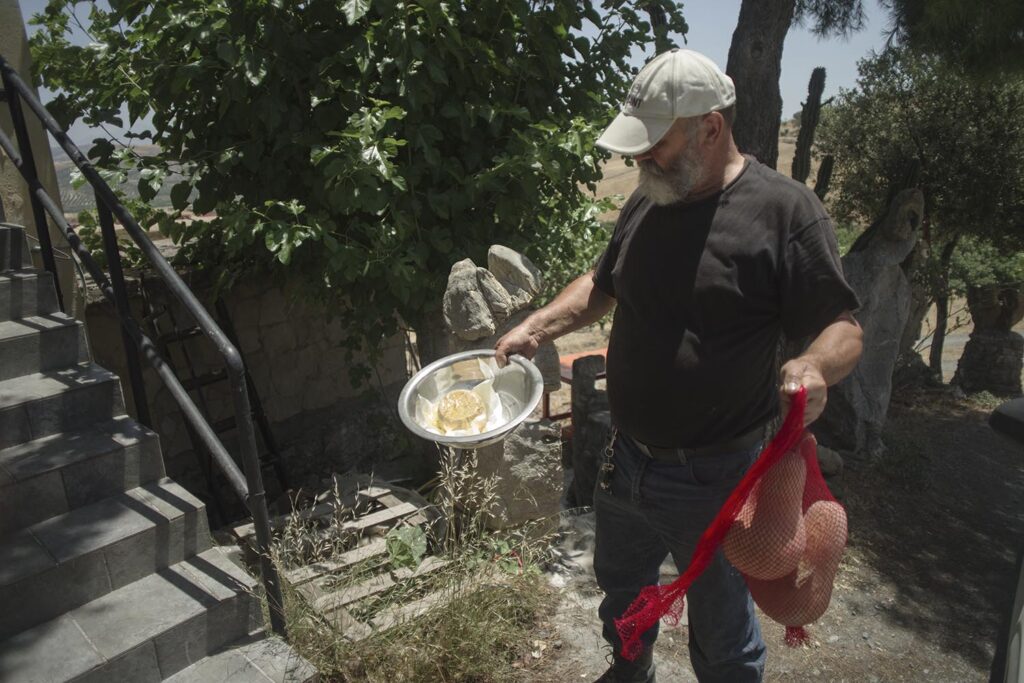
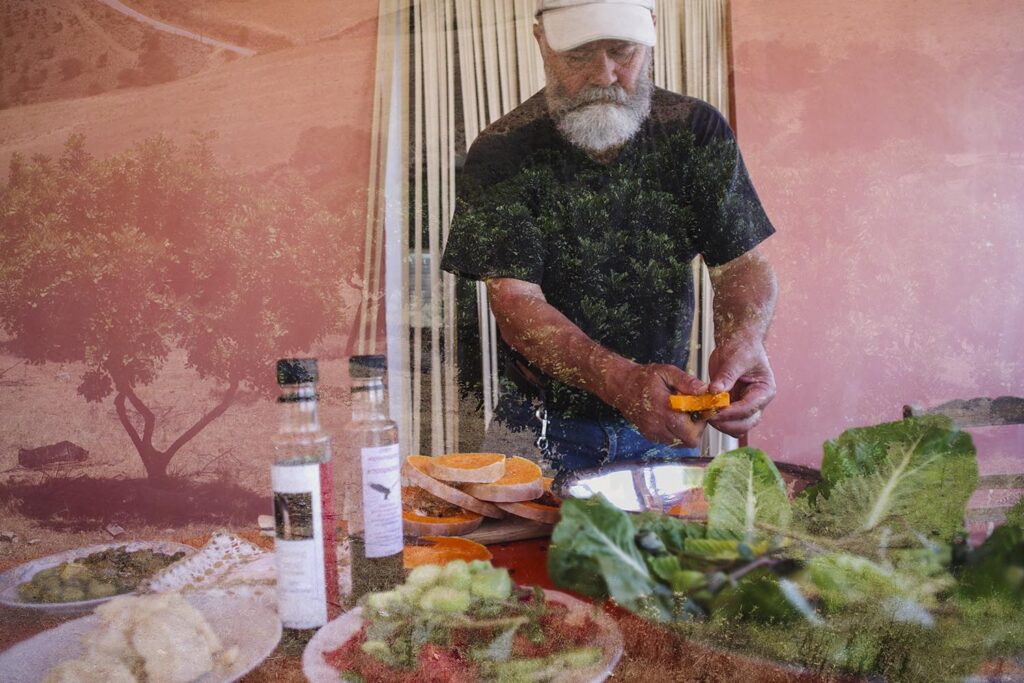
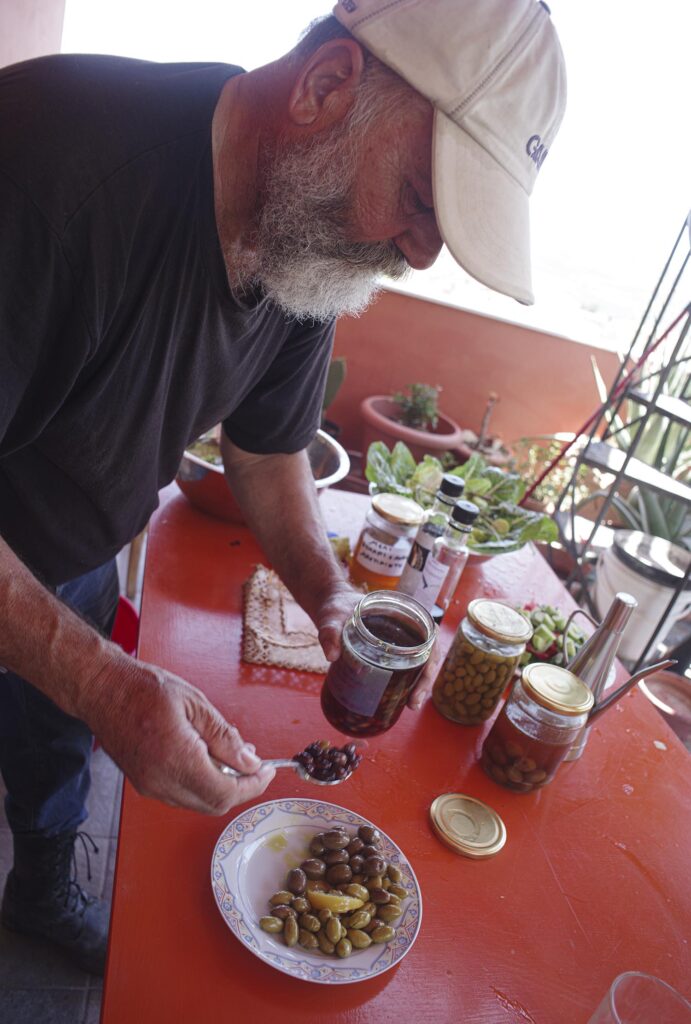
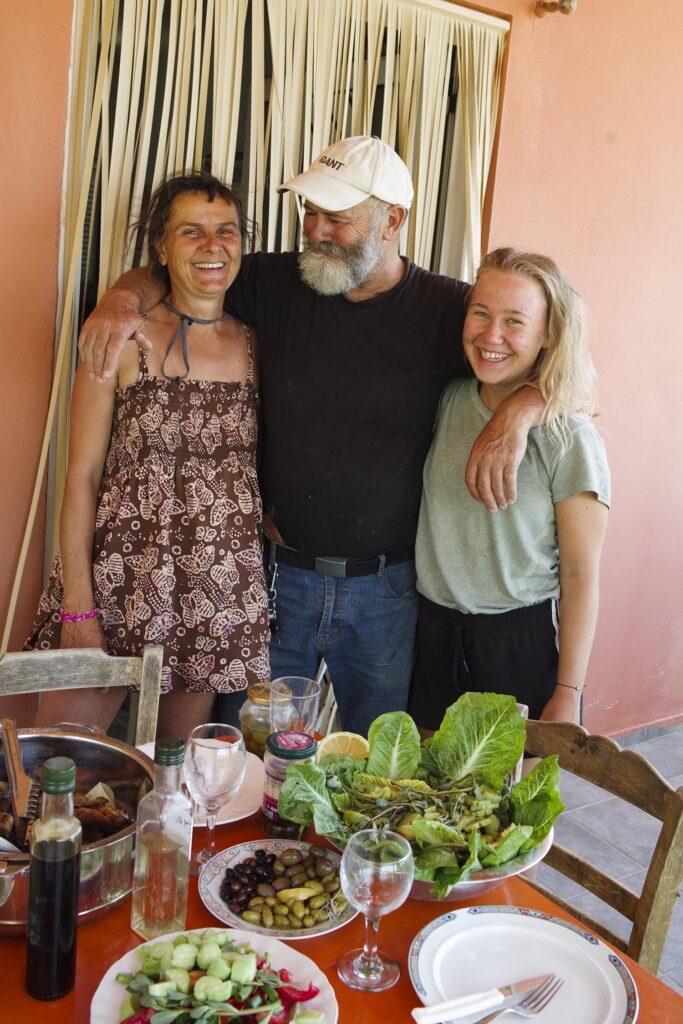
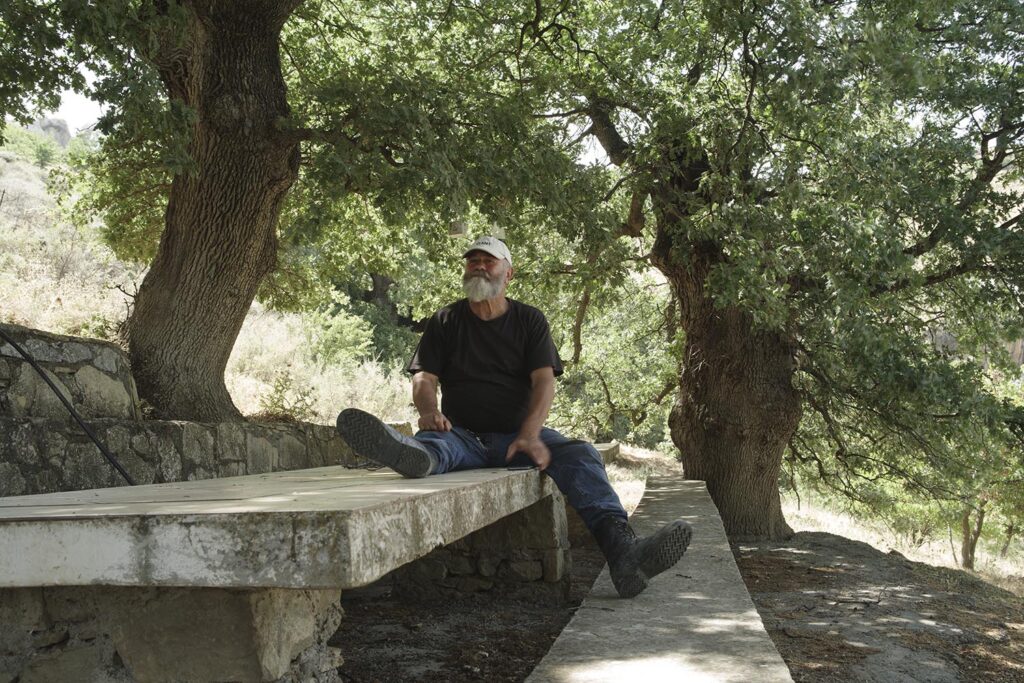
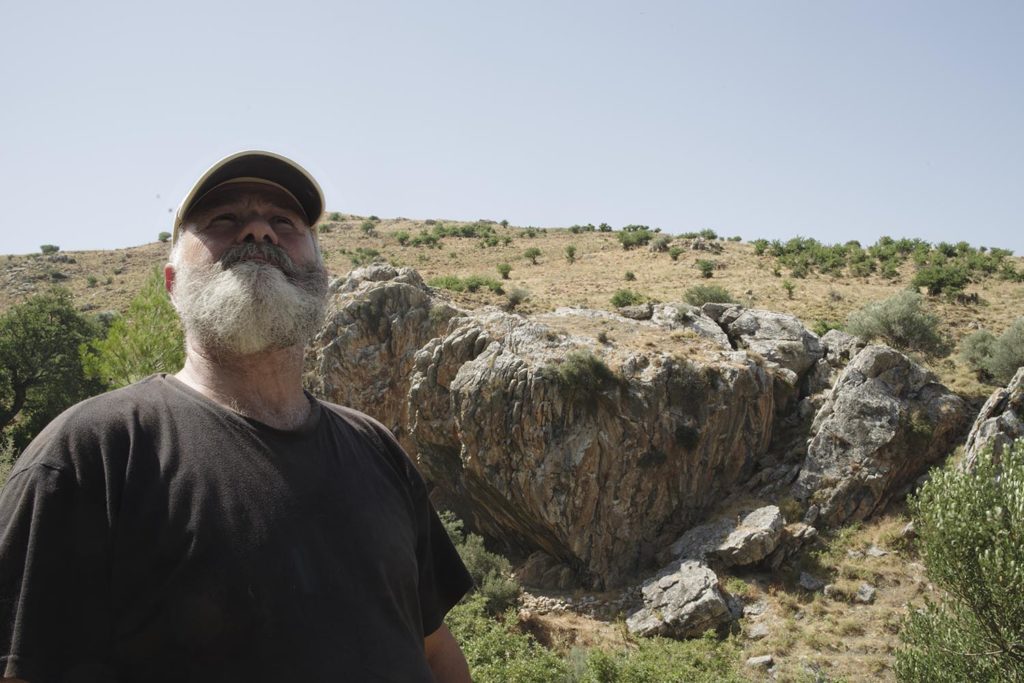
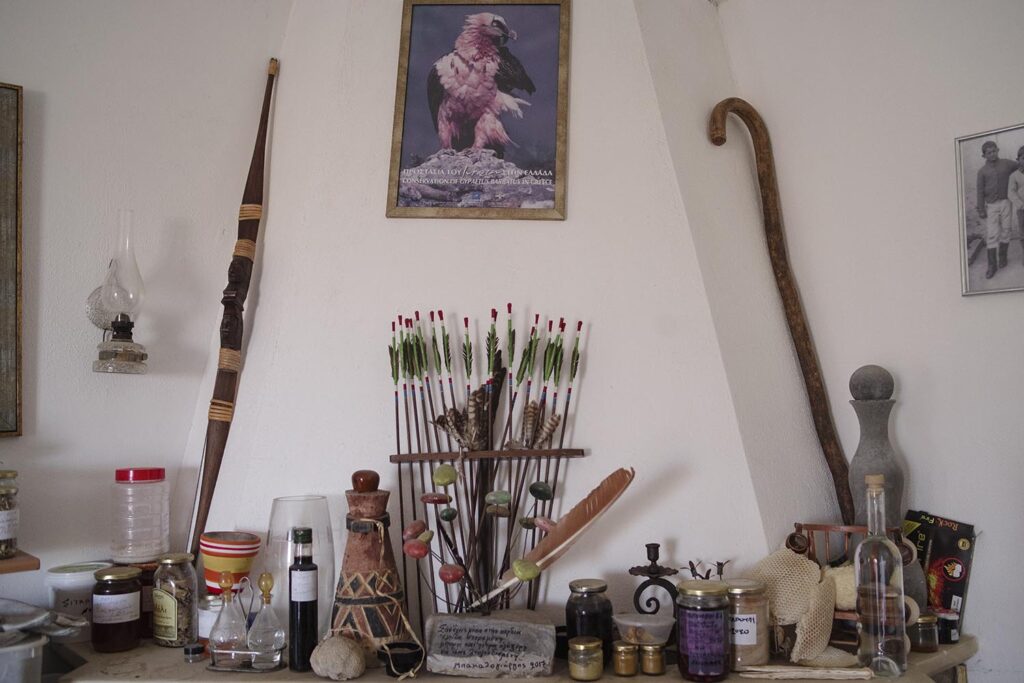
All food from olive oil, vegetables, fruits chees, dry fruts, vine.. he produce himself- and if Kostas has a chance to host somebody as he hosted us ..a magic experiance !
Something about the carob. While I was trying to find out more and more things, I'm always searching, I found a rabbi of the 300 years after Christ. He was living in Palestine. So, he was walking in the street and he saw somebody planting a new Carob tree, a very small one, and he asked him ”Why are you trying to do this, you think you're going to live so many years to be feeding from this carob tree”, and the man answered ”No, because I'm taking the carobs of another tree that my ancestors have planted for me” and he said ”Ok” and he left. And after a while the light was very strong, he didn't go to a cave, but he sat on a rock, he slept, and then he returned. And on the way back he saw in the same place a huge carob tree full of carobs and somebody who was picking the carobs. And he said, ”Hey you, are you the same who planted this tree” and the man said ”No, no, no, my ancestors did it for me” and he realized that 54 years passed during his sleep. So, I got crazy when I found it, because, first () for another reason and then this rabbi, Honi HaMe'agel is his name, in a different place, in Palestine, it has to do with carobs this time. I don't know, there is a connection.
7 years. For the first, double of the olive tree. Olive tree- less years. That's why the Portuguese have a saying, ”Plant an olive tree for your children and a carob tree for your grandchildren”.
more>CAROB TREE PHYSIOLOGY: GROWTH AND REPRODUCTION BIOLOGY
Manolis Loukakis a profesor of agronomy, an expert for breeding , teaching a great connoisseur of carobs, species suitable for planting and grafting trees and Crete
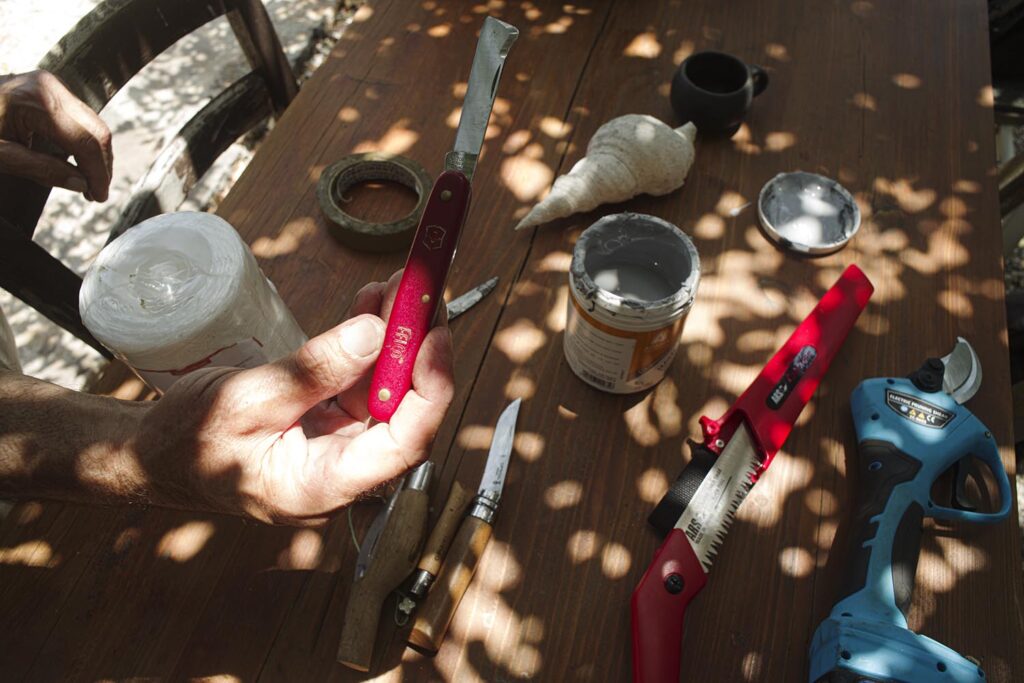
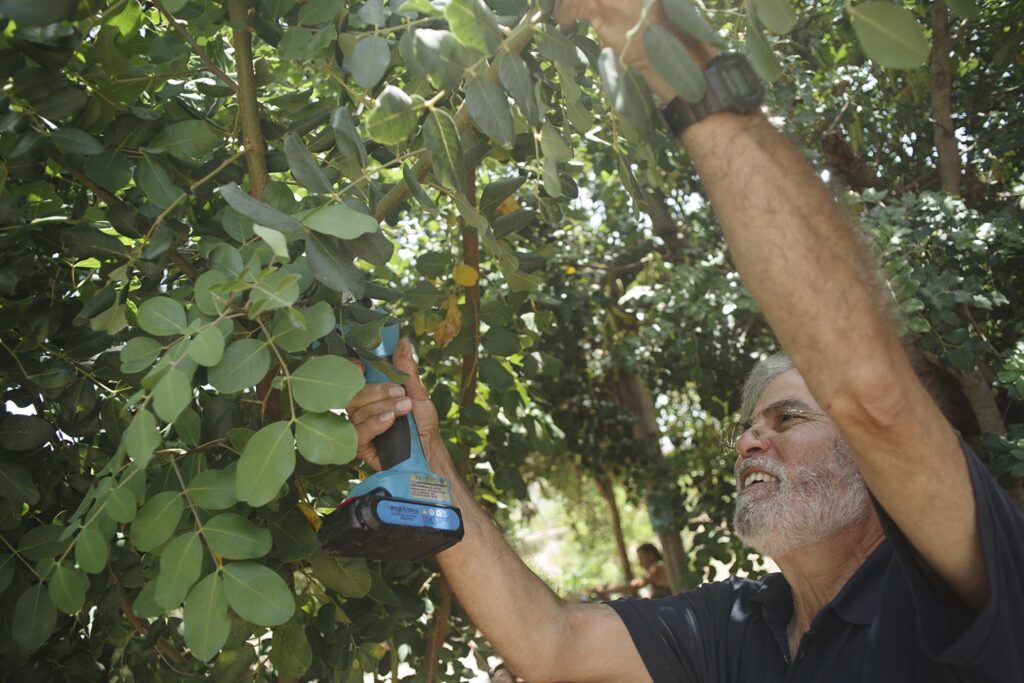
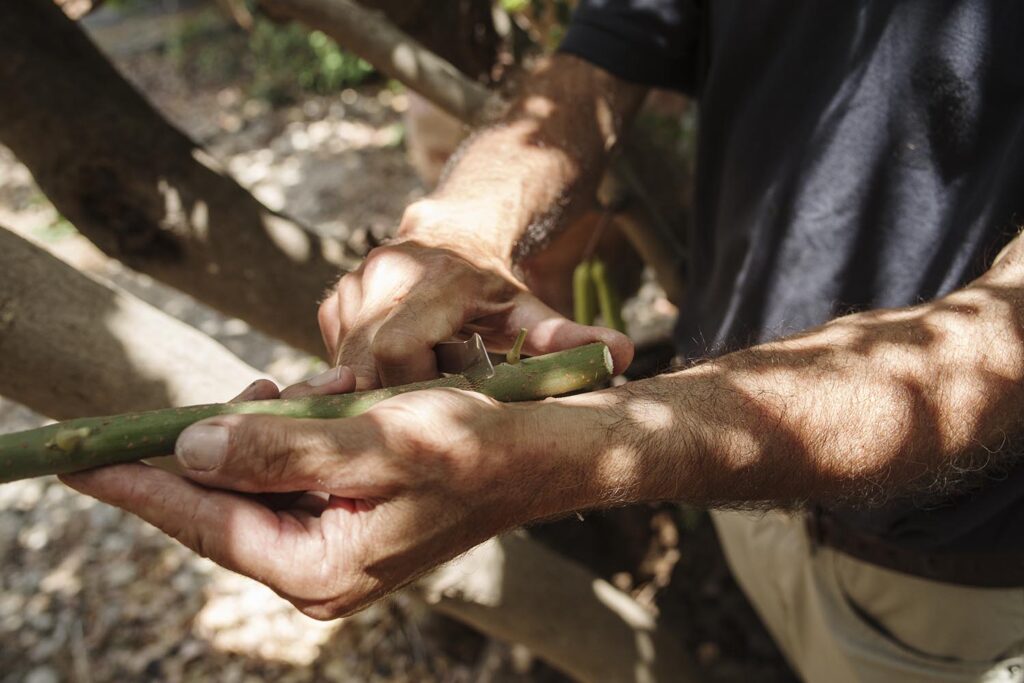
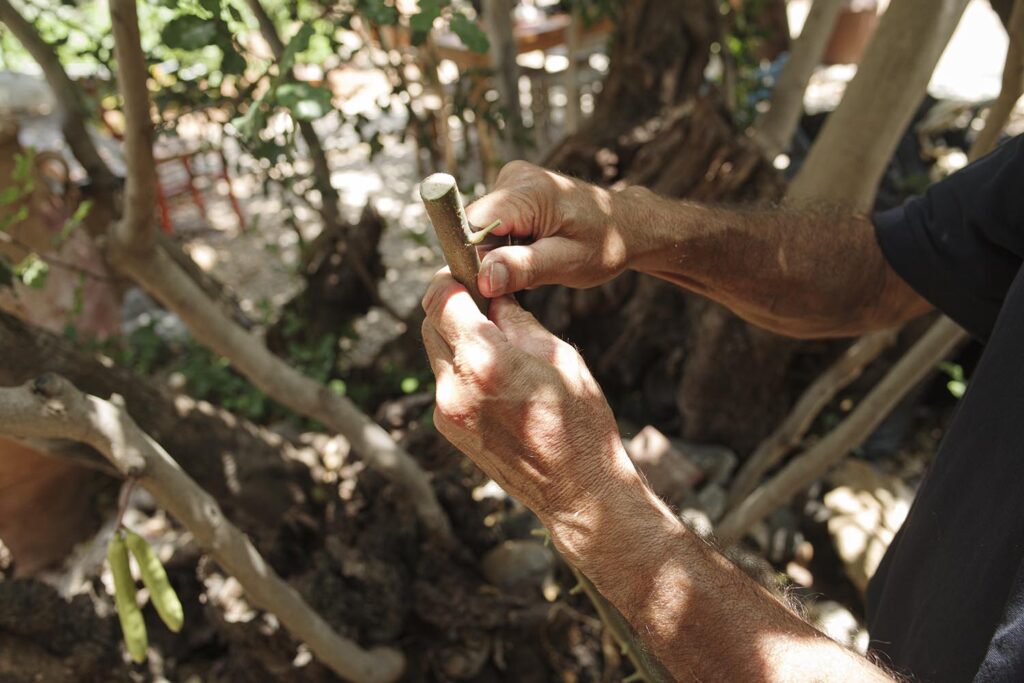
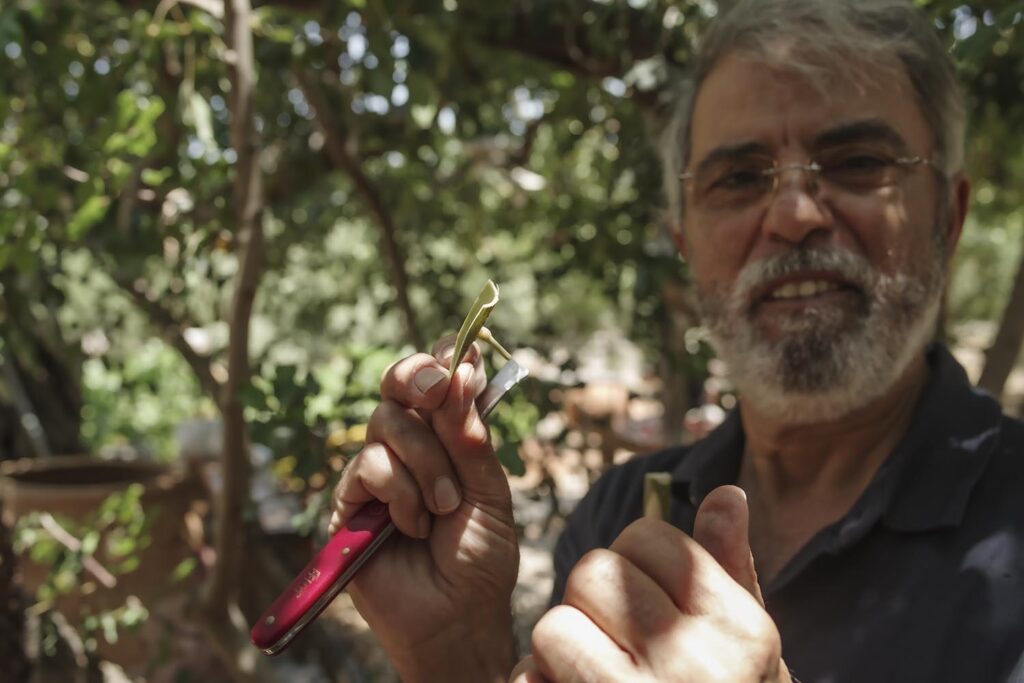
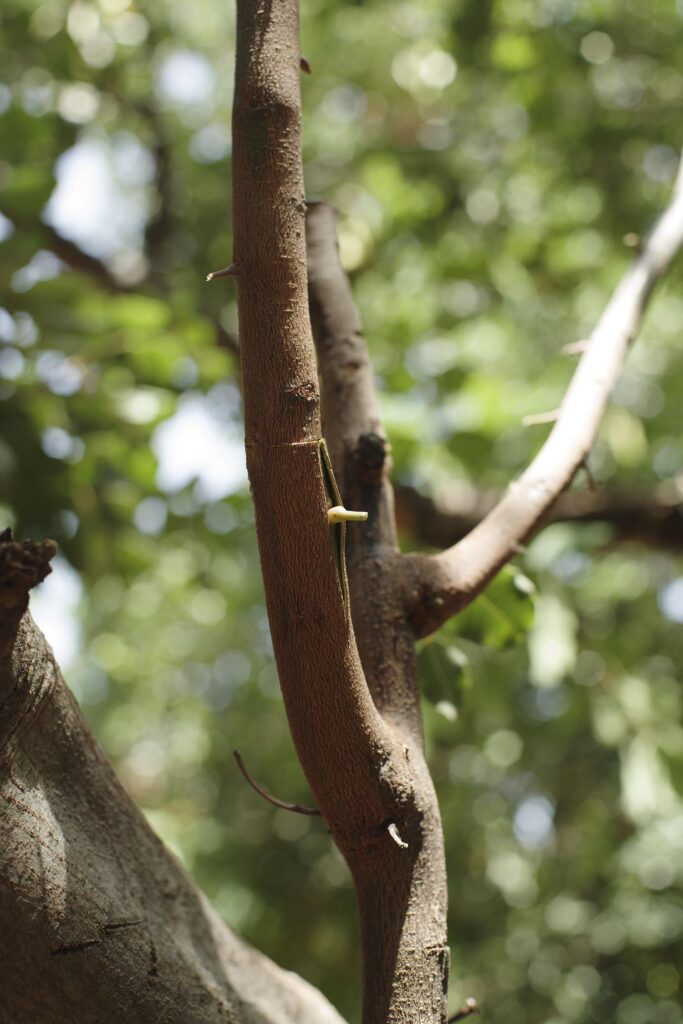
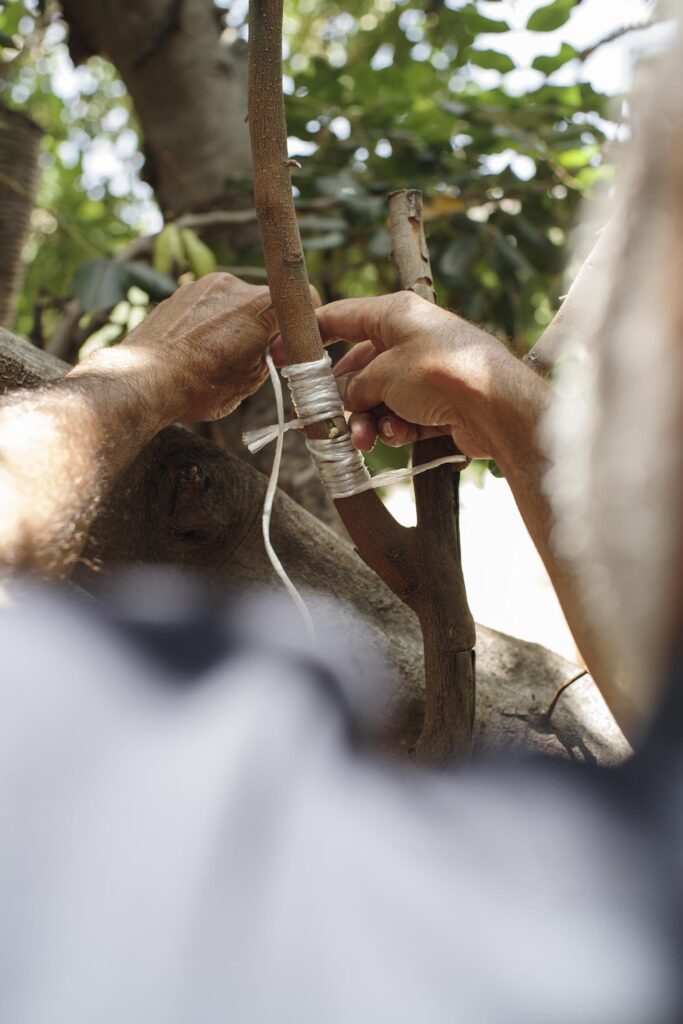
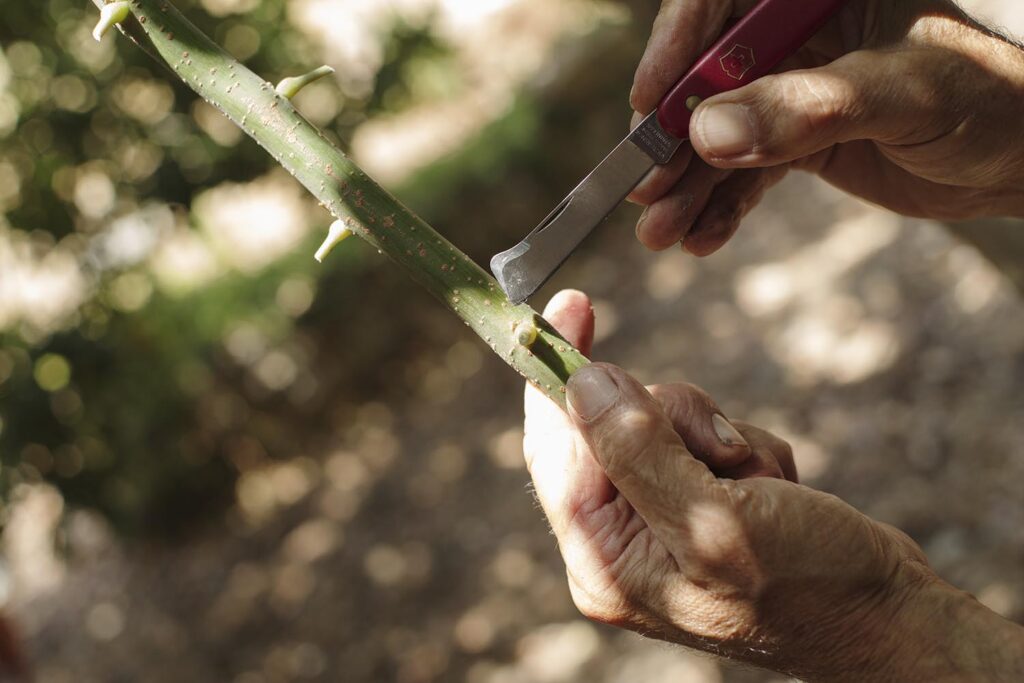
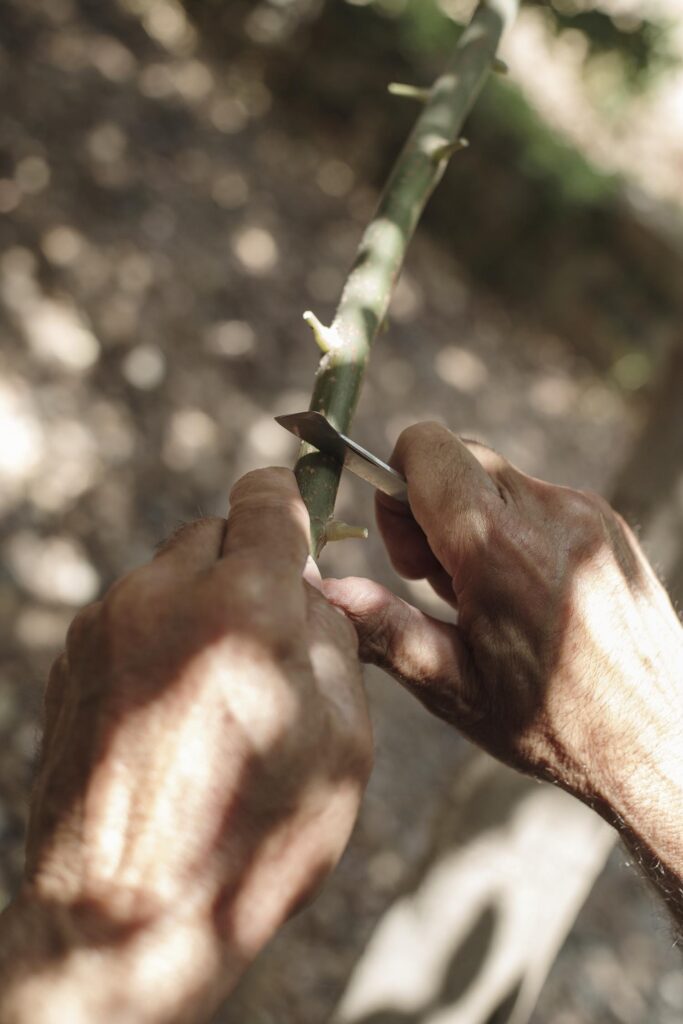
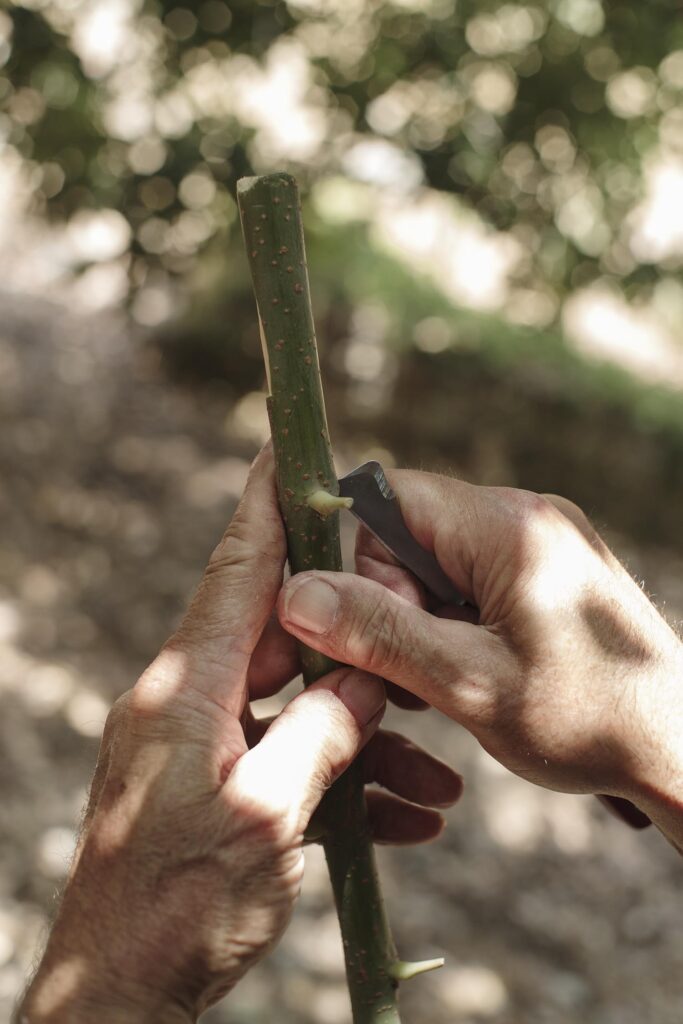
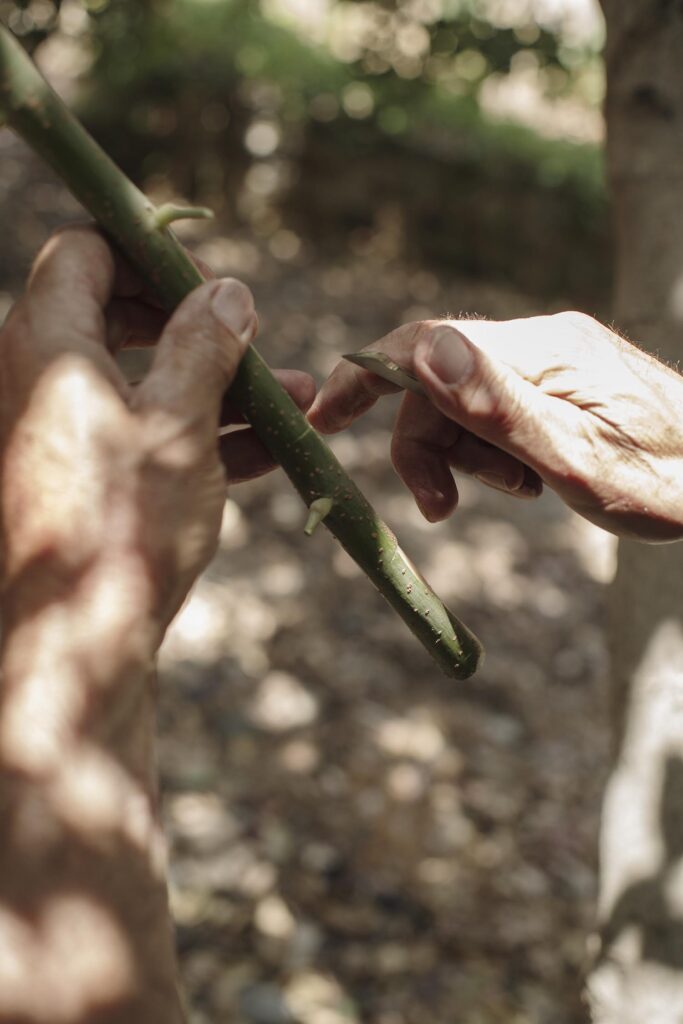
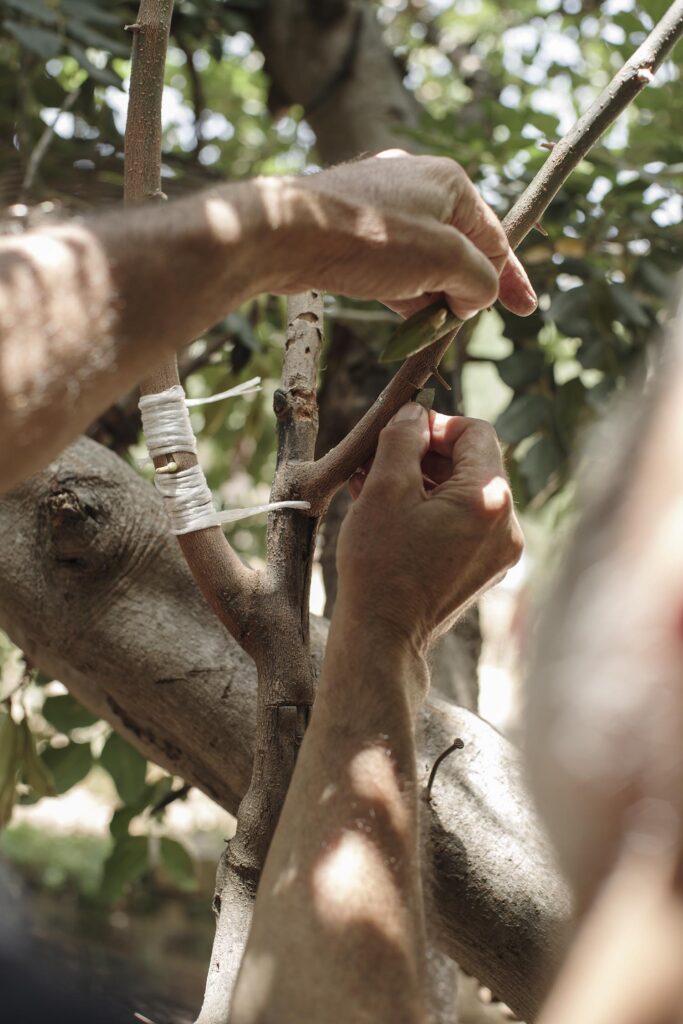
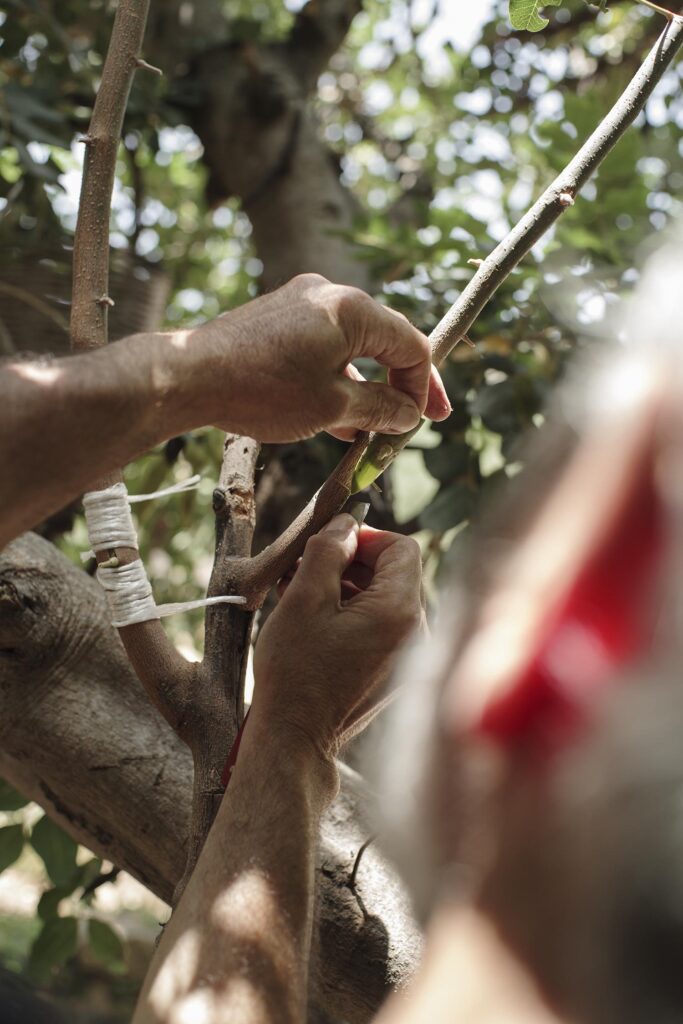
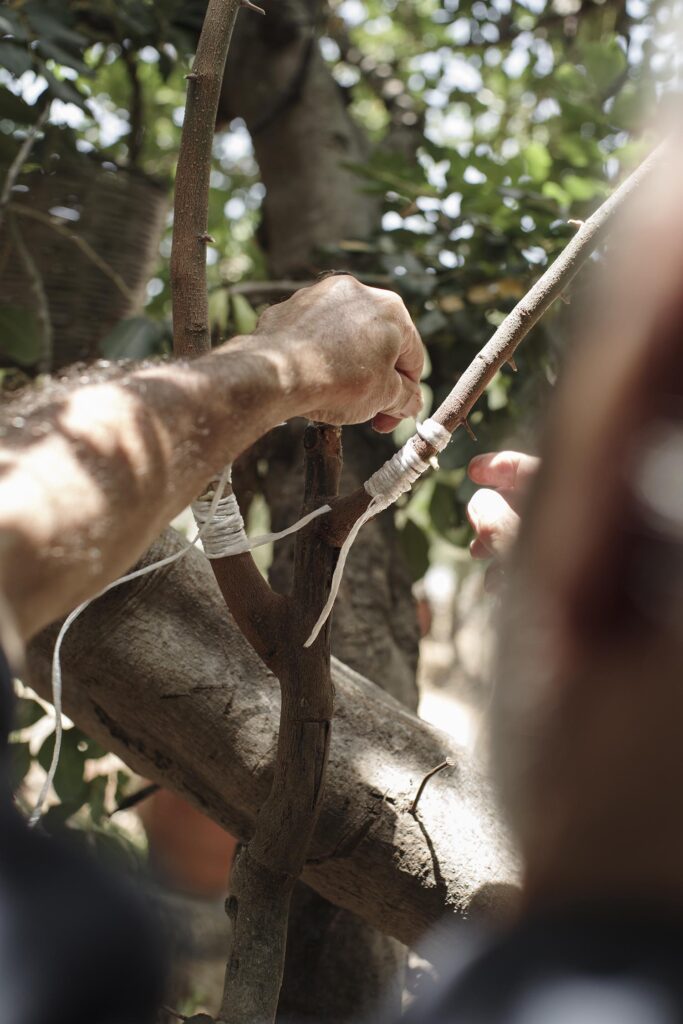
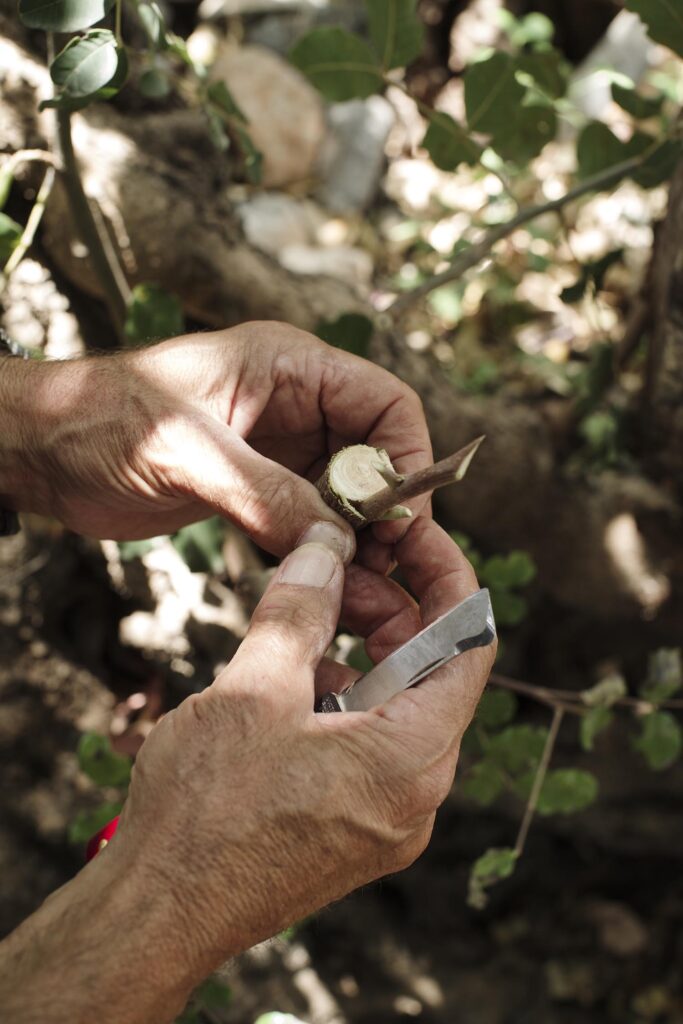
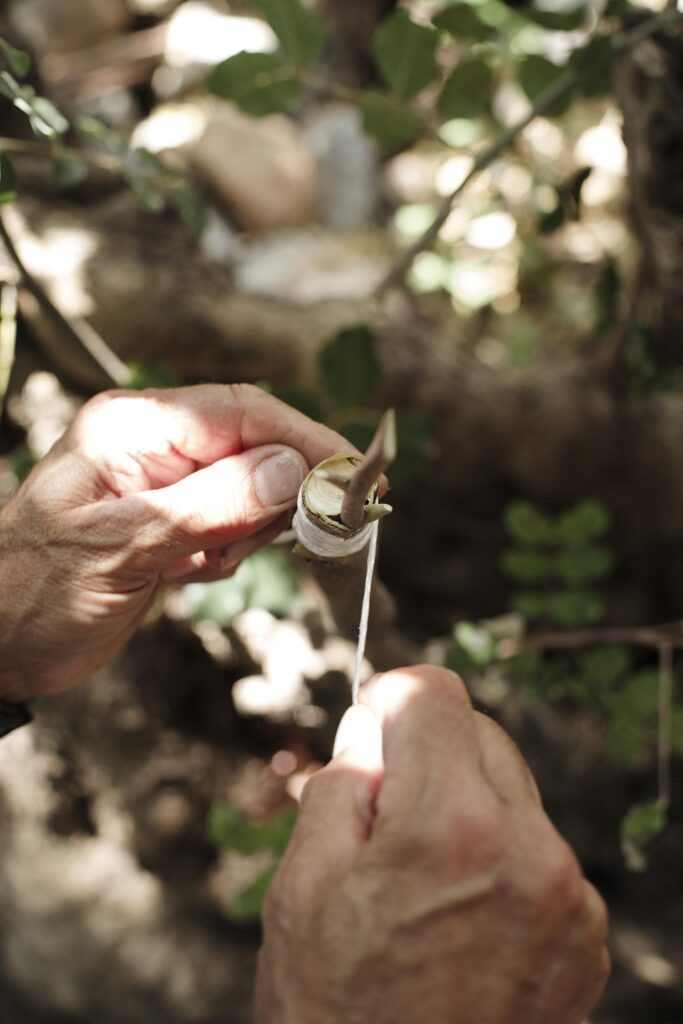
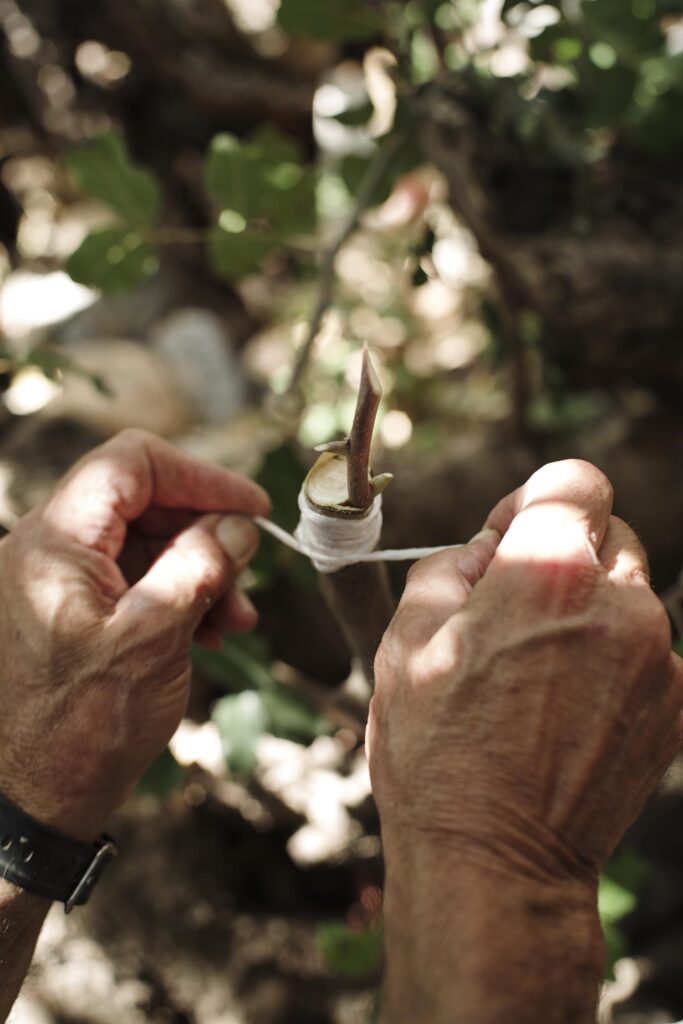
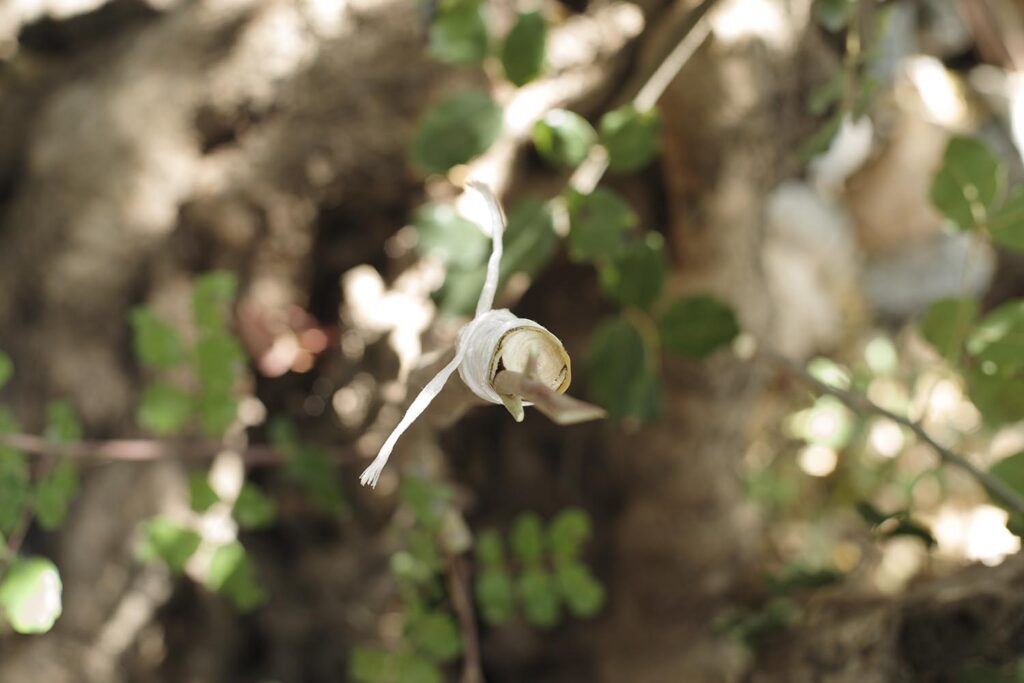
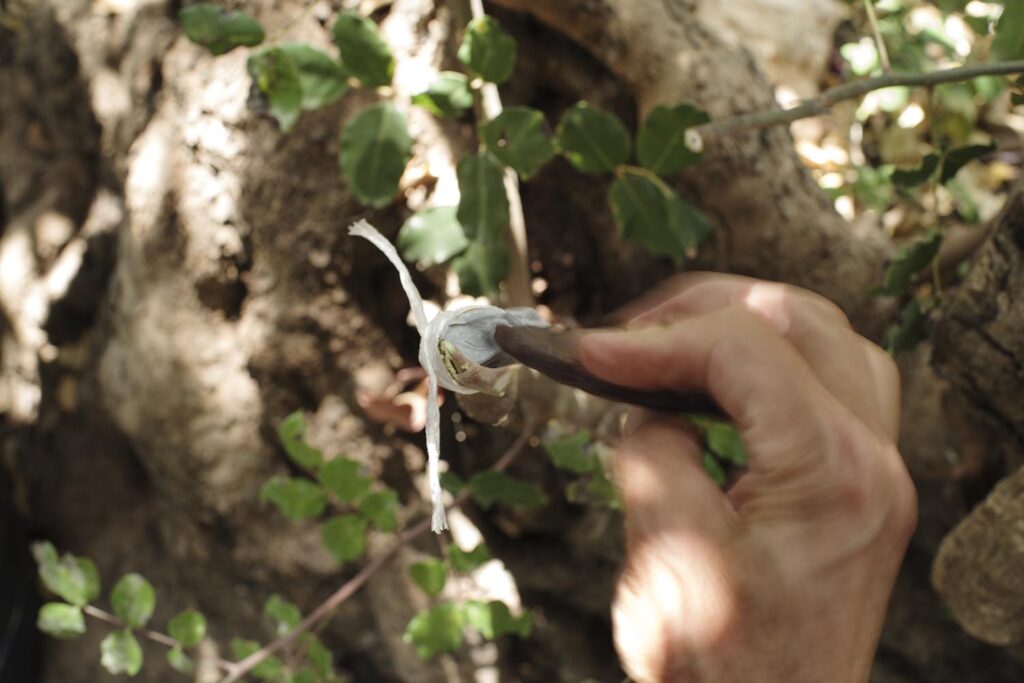
...nobody knows, I could say, because sometimes, even if something looks very dark or very pessimistic, there are moments, but everything can be changed, so we have to try. And if we're lucky in our lifetime to see a difference, to see this revolution that I believe in, there are moments, but even the environment and human beings together, we can change everything. I don't know if I'll be so lucky to see it, but I can tell you that I've seen it, in moments in a small scale. So, if I have this experience to see it in moments, that means that it can be done, so in this way I'm an optimist, but I don't know if in my lifetime I will see it. Everything can be done. Even the what now we think that is impossible, it can be possible. But it can be possible only if some people will be in the same line, will find a way to connect with each other and to have the same purpose, the same goal. And even unconsciously, to have the same way, without knowing it, but knowing it, if you understand. Even unconsciously, because there is a social unconsciousness that moves the thing.
Manos Babionitakis: an inventor of carob mill machine , before him there was nobady to proces carobs into 100% carob flower in Creta, wital for all that crop carob
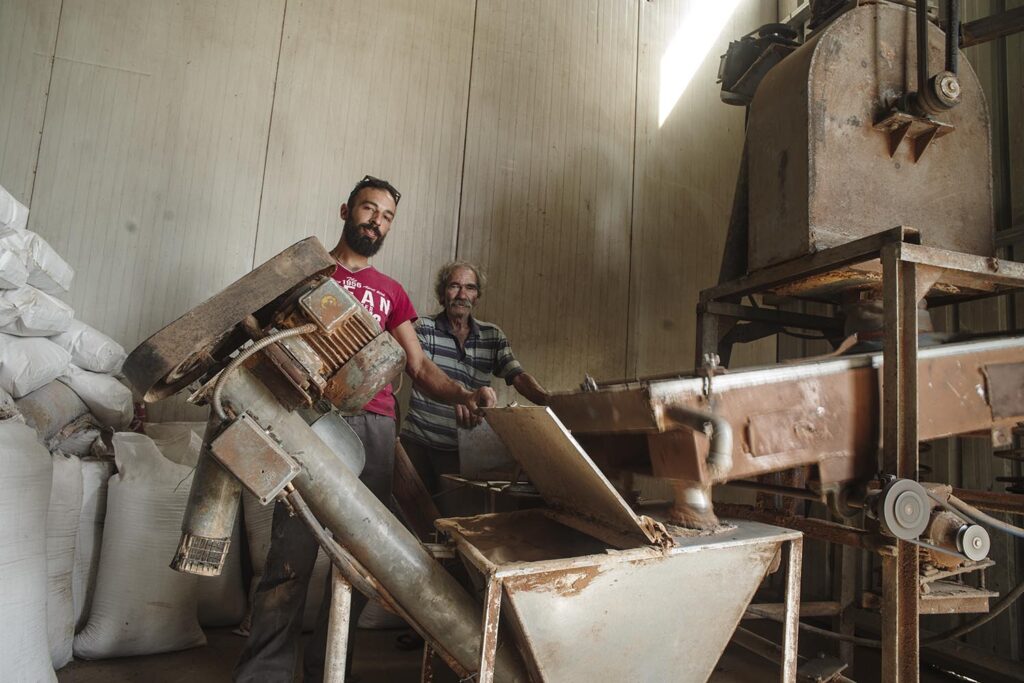
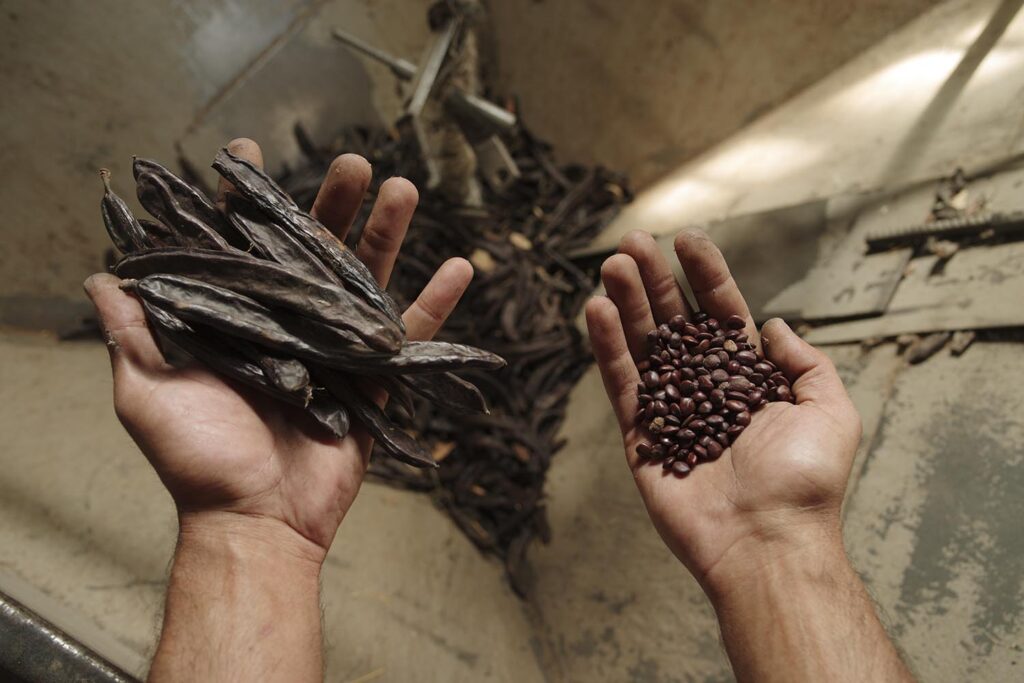
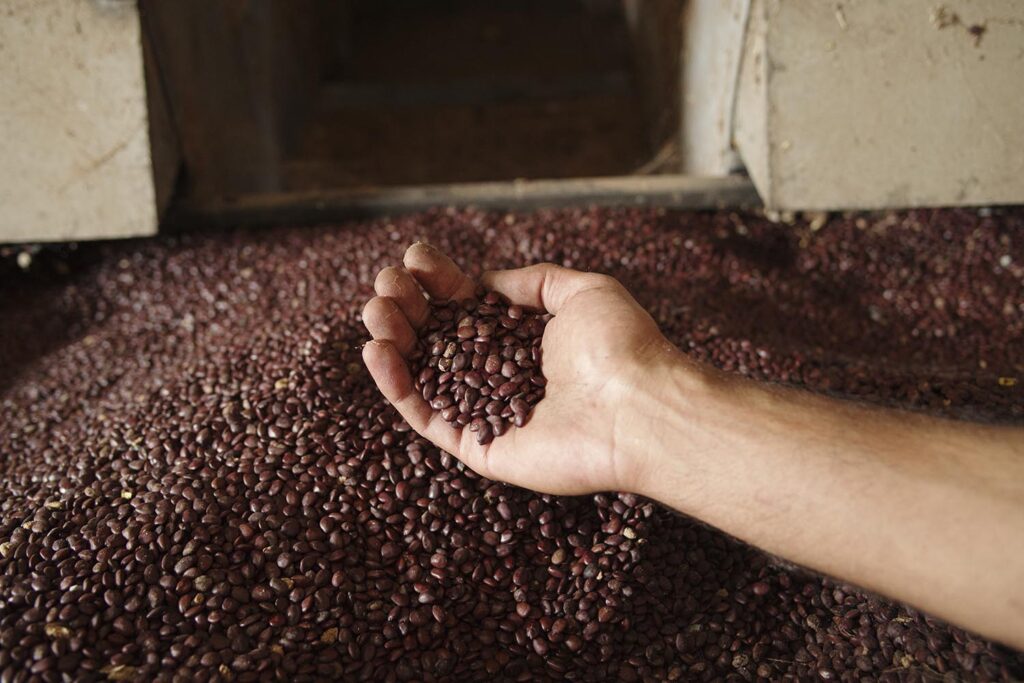
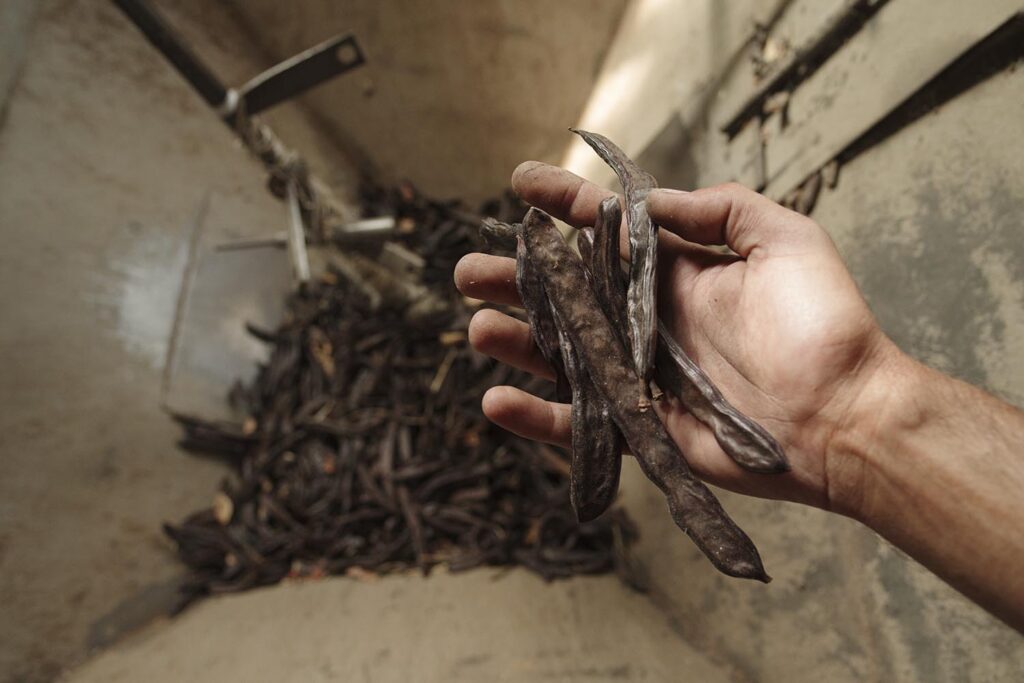
We are all the same, from the same material. It's all clear to me. There are no differences. From the north to the south, to the west, to the east, we're all human beings. Whites, yellows, I don't know what...
>> next steps – carob trees
I have a feeling that it's going to save us again. In a different way this time. If I have a dialog with a carob tree, it has too many secrets, and I'm asking it. ”What are your secrets?” I'll find out what they are.
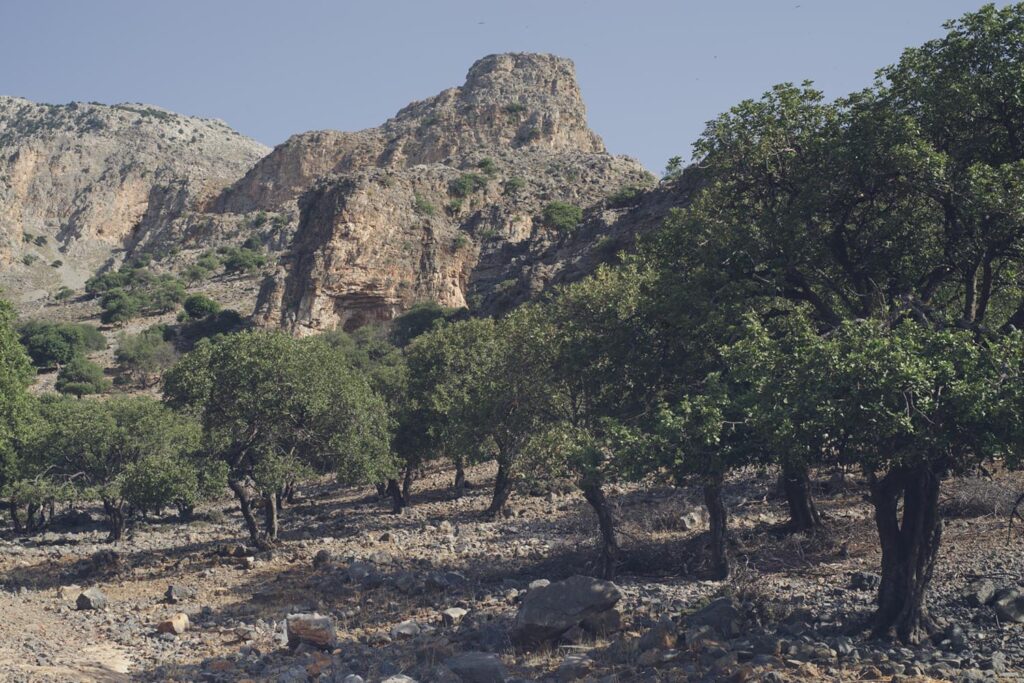
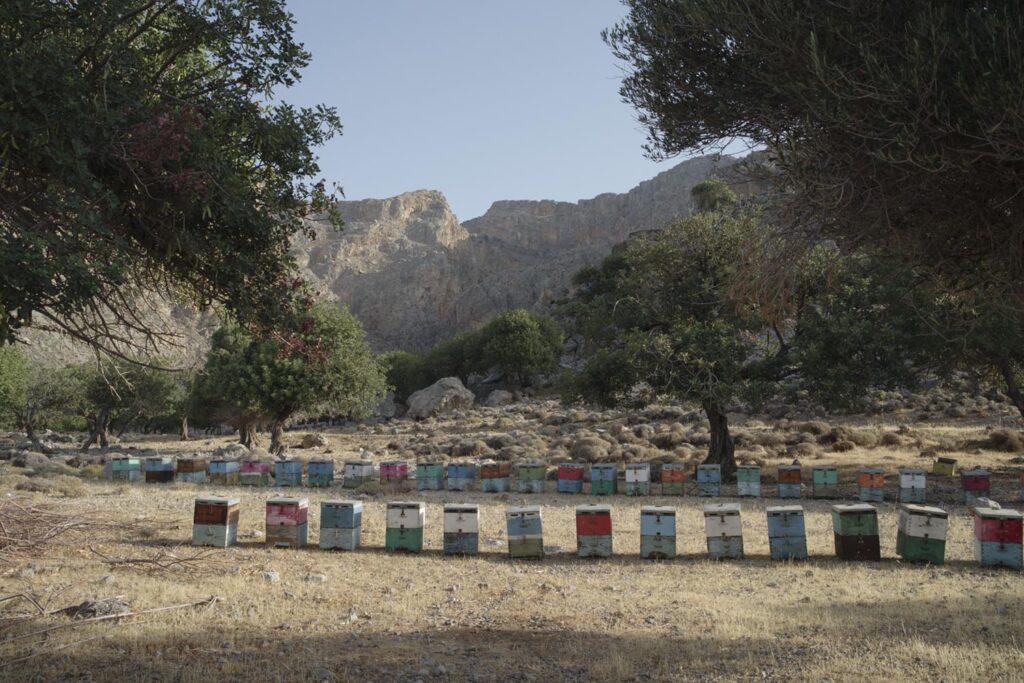
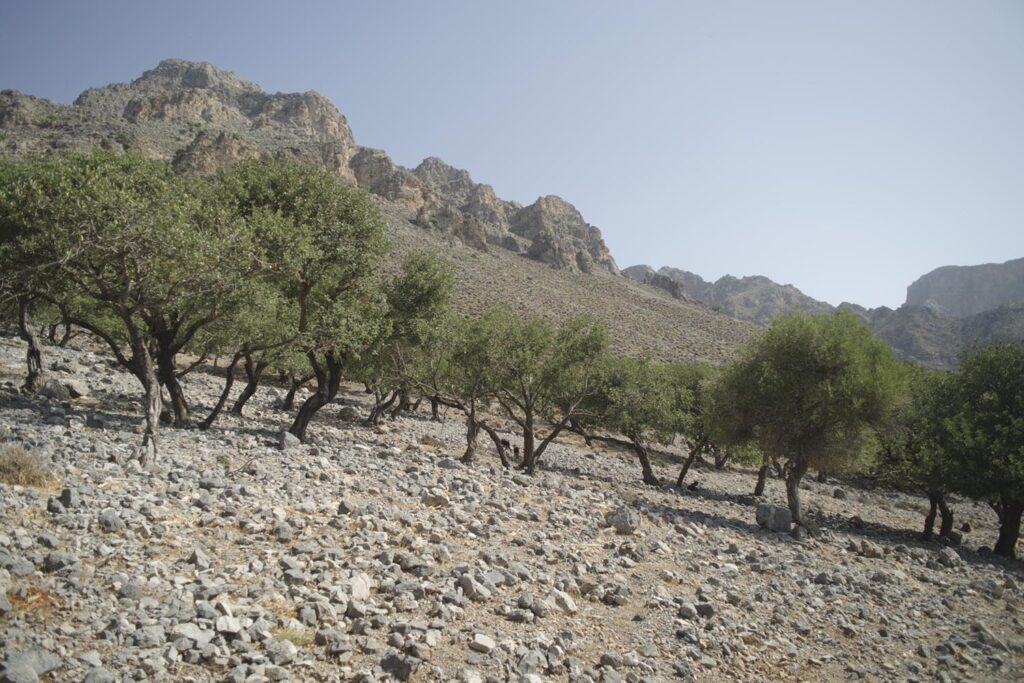
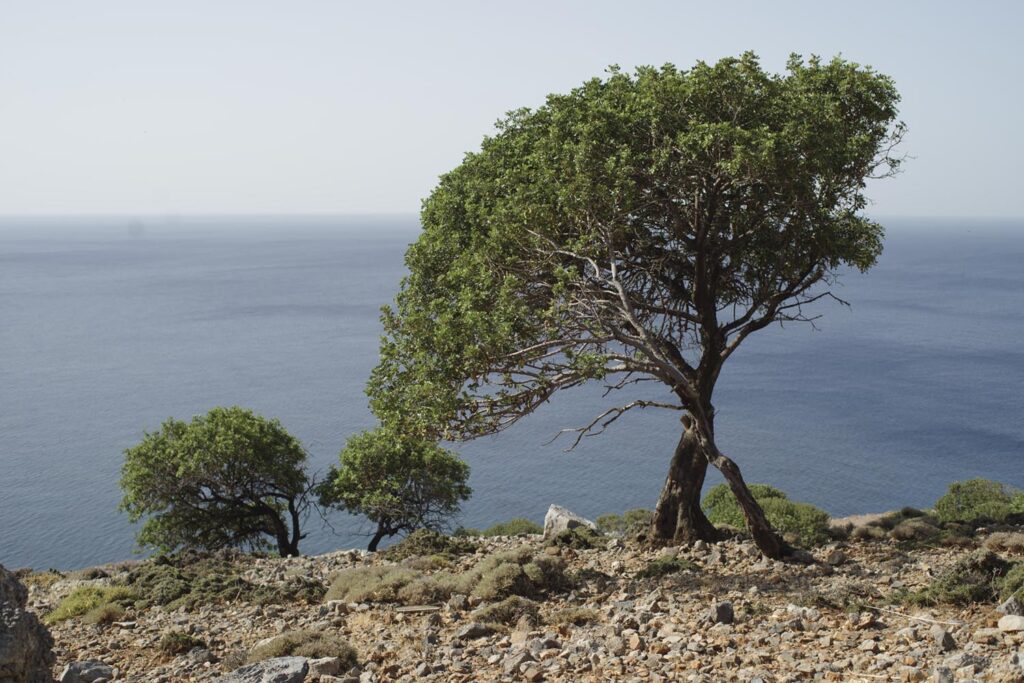
virgine carob forest in Southeren Crete grows where no other plants can exist They are old trees, never the less small and regenarate here by nature.
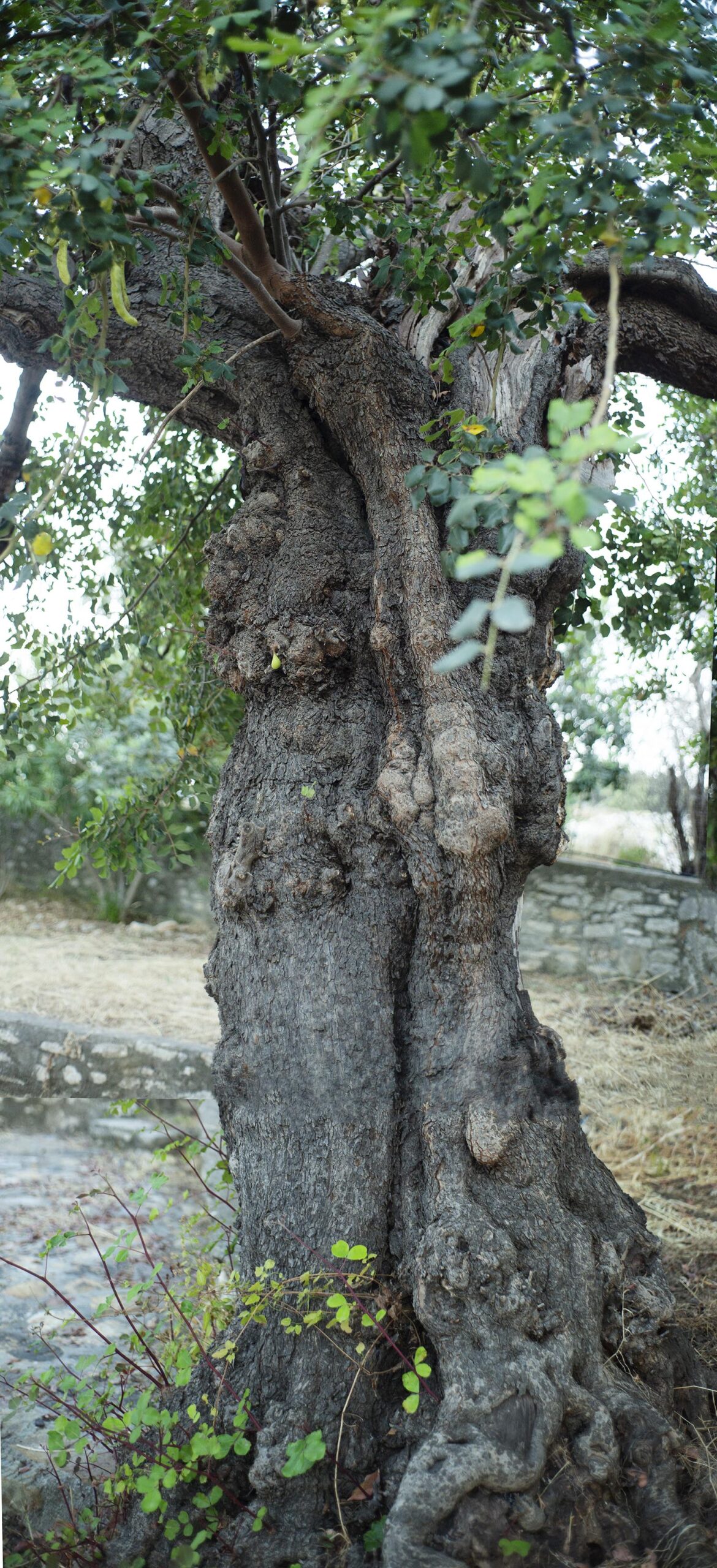
When I finished the proposal to the ministry of culture to be included in the list of intangible cultural heritage, I saw in my dream that I was on the carob tree and we were flying all over Europe, all over the Mediterranean Europe, together, with the tree. I saw that dream and it was great after because I did my best writing the proposal and then I felt so... ”Now I've done it, I've done something”, and I saw that dream. And I was looking from above all the countries of the Mediterranean Europe and I had a feeling like in that tree when I was very small, but I was flying with it!
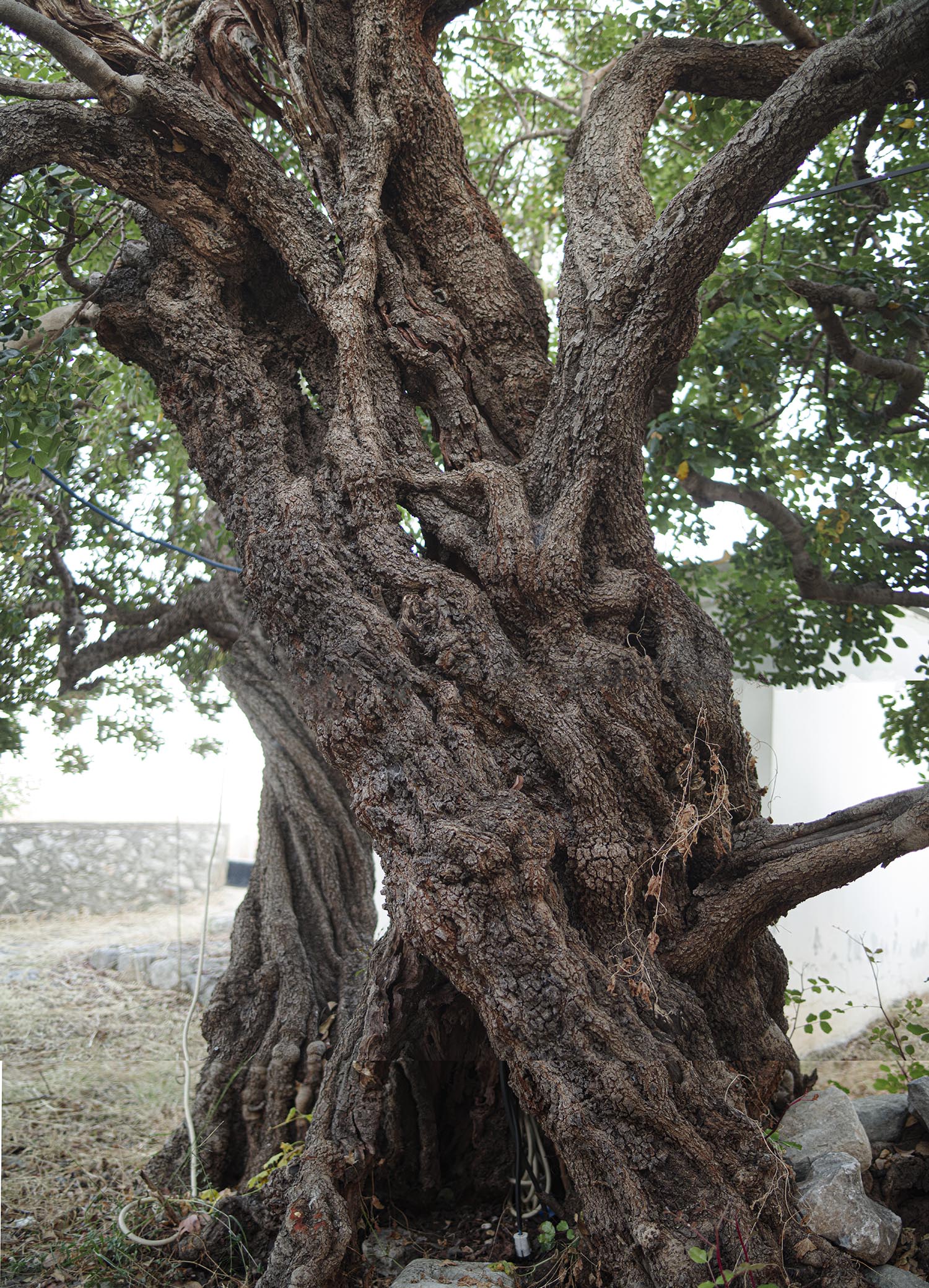
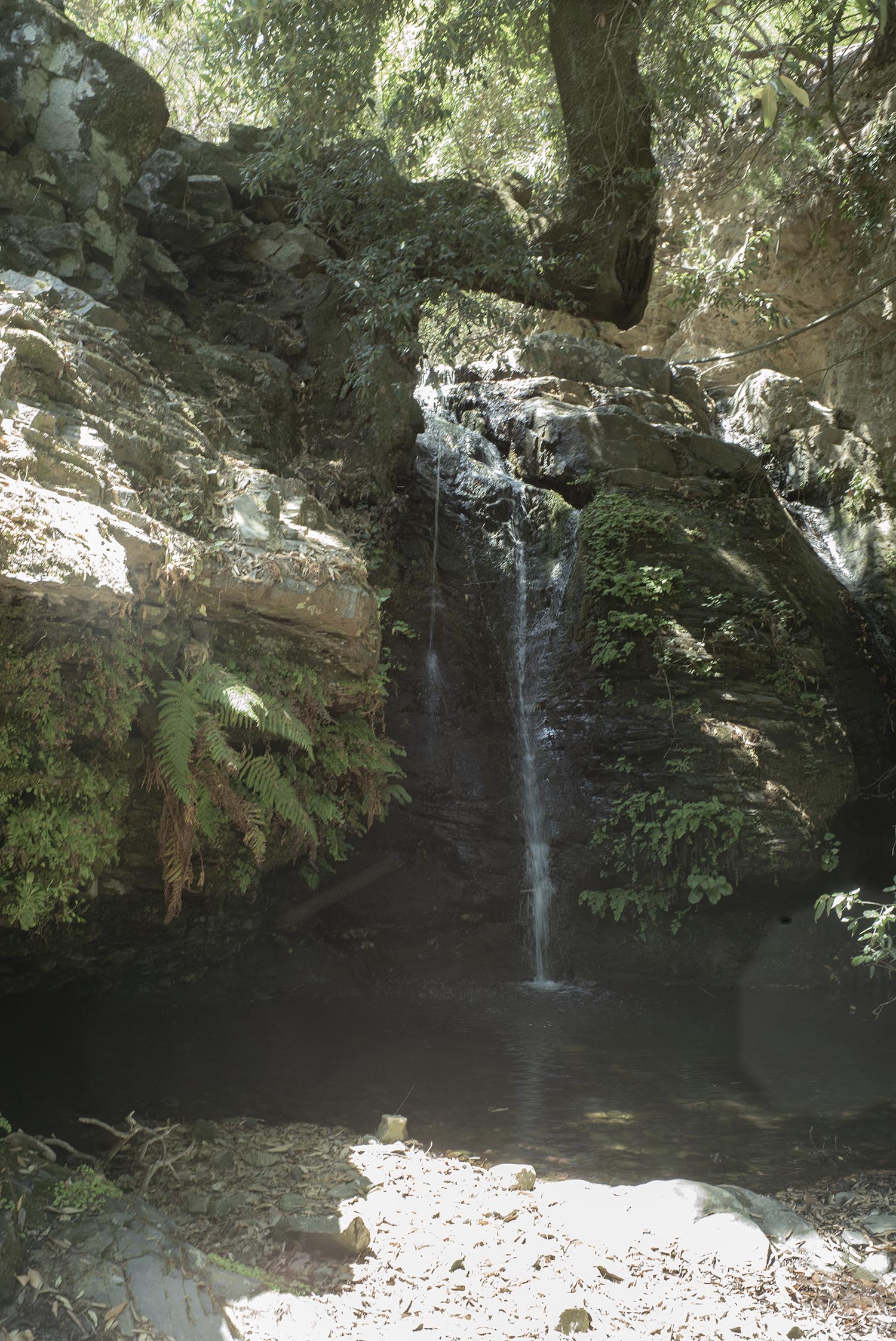
Finally, I found out that without democracy we can't do anything. It is not the ideal, but it's a minimum that we could have, and we don't have. Only wars. We use it in a way that we don't mean it. This is going to destroy the globe, the capital.
Revolution is our effort to exist. For me it's our effort to... it's very difficult to explain. Because we are doing what the others, the society is telling us. The thing is to decide what we do by ourselves, to find ourselves, and to create the future everyone wants to have. We have to find ourselves.
Art and culture are the most serious weapon to fight all these absences of thought. This is our weapon; we have no other. What else to do, to force somebody? No, to convince him, to touch him, so art is a very nice way. Because it gets directly to the heart, not the mind, the mind is following
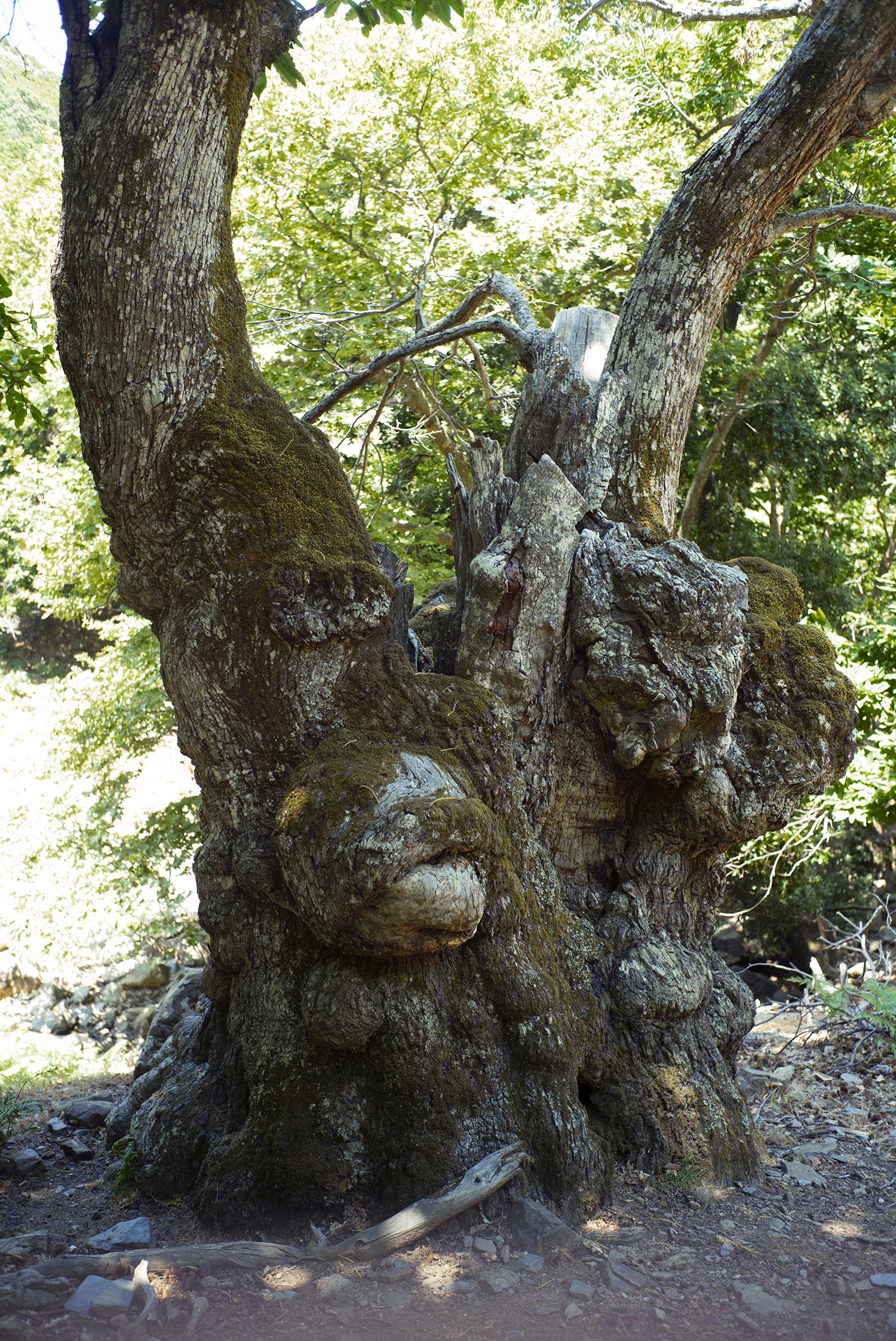
My father was the first ecologist I ever met, before the ecology movement, he was an ecologist, chemist and he loved nature. He first introduced the carob tree to me. He was the one who introduced me to carob tree when I was the little. He was fond of nature and trees. He was a chemist, but he was very well educated in all the... philosophy, archaeology, history, and everything. He gave me the first carob and he said ”Try it, it's better than any chocolate”. So, I ate it and I loved it, I liked it so much, you can't imagine. From that moment I always look at the carob trees with great admiration because he taught me ”This tree saved the population of Crete during the second world war from the hunger” so I felt an admiration.

But this food, this is superfood, it is better than many others and for me the carob is the future. As a cultivation as a food and also it is very important as it has pharmaceutical uses, it's fantastic. It has many things. And now we started concentrating in the carob tree in order to help it, support it and make it known in the consciousness of the people, back, it's the coming back of the carob. To understand that this is so important. So, I've done many things. Congresses, meetings... I asked the cultivators to come here, to carob's mill. We made a new institution, society, association that is called The carob of Crete and consists of researchers, academics, cultivators and people from the culture. We have started with the university because I'm pushing the things too much and now, we've started to research, a very serious research, on different types of carob trees in Crete with the universities, because I have found the best researchers. Not only from the university of Crete, but also from Athens, university of Athens, Demokritos research institution and also other different institutions and universities in Greece. During the April of 2019 we had the first congress, Mediterranean congress in the carob mill and it was people from Spain, Portugal, Cyprus, Egypt came here, and Italy. We started a network for the coming back in the carob tree in Mediterranean Europe, because it's a Mediterranean tree. And now we are preparing the new one, the new congress...
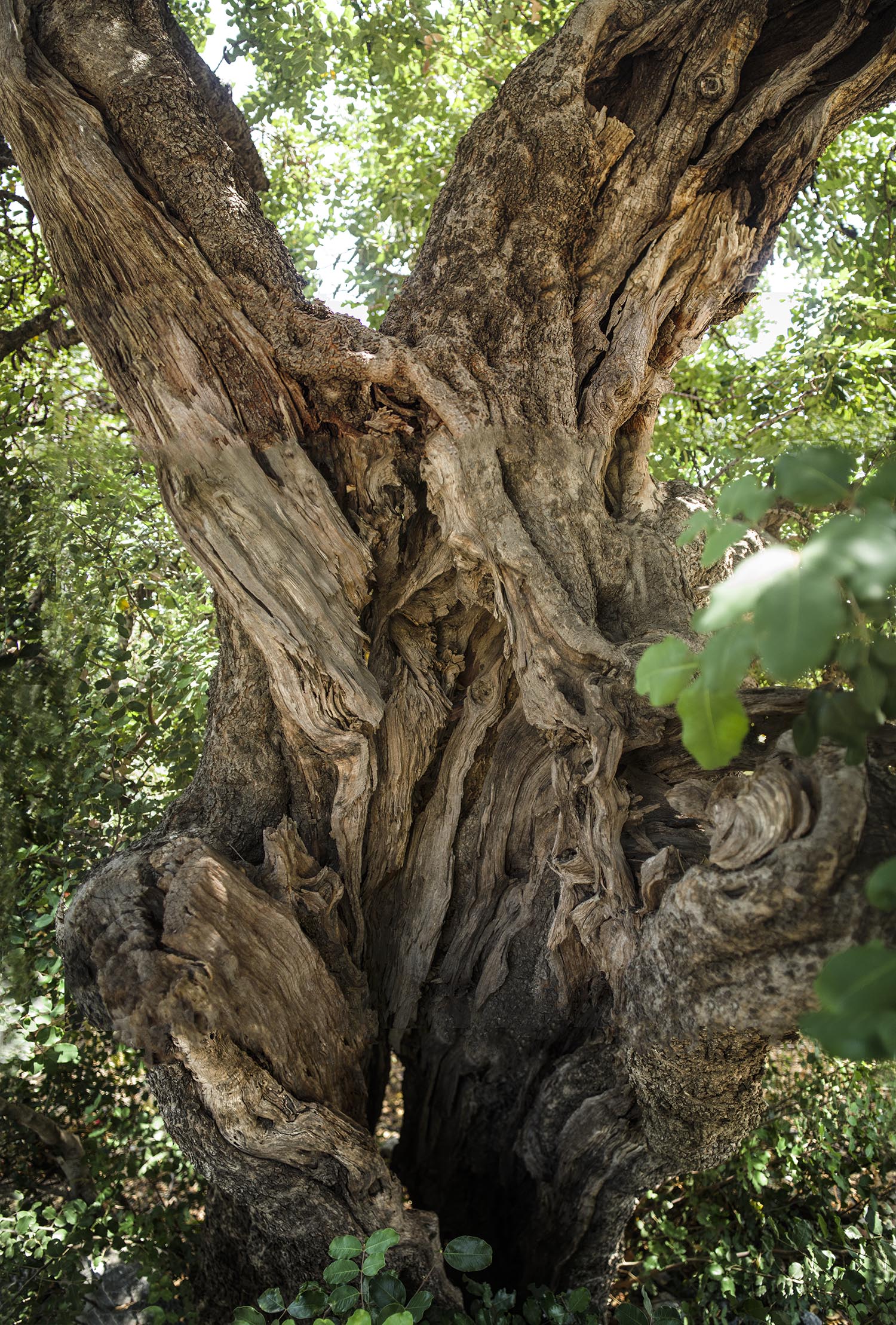
Sometimes I feel like I have a dialog with the carob, but I feel that it has so many secrets, that I have to discover. This is the most important thing to me. But I think it hides some secrets that I have to find what they are, so we have a very erotic relationship. I feel that.
Yes, I feel that. But not now, since many years ago. I'm afraid that if I talk more, I'm going to…
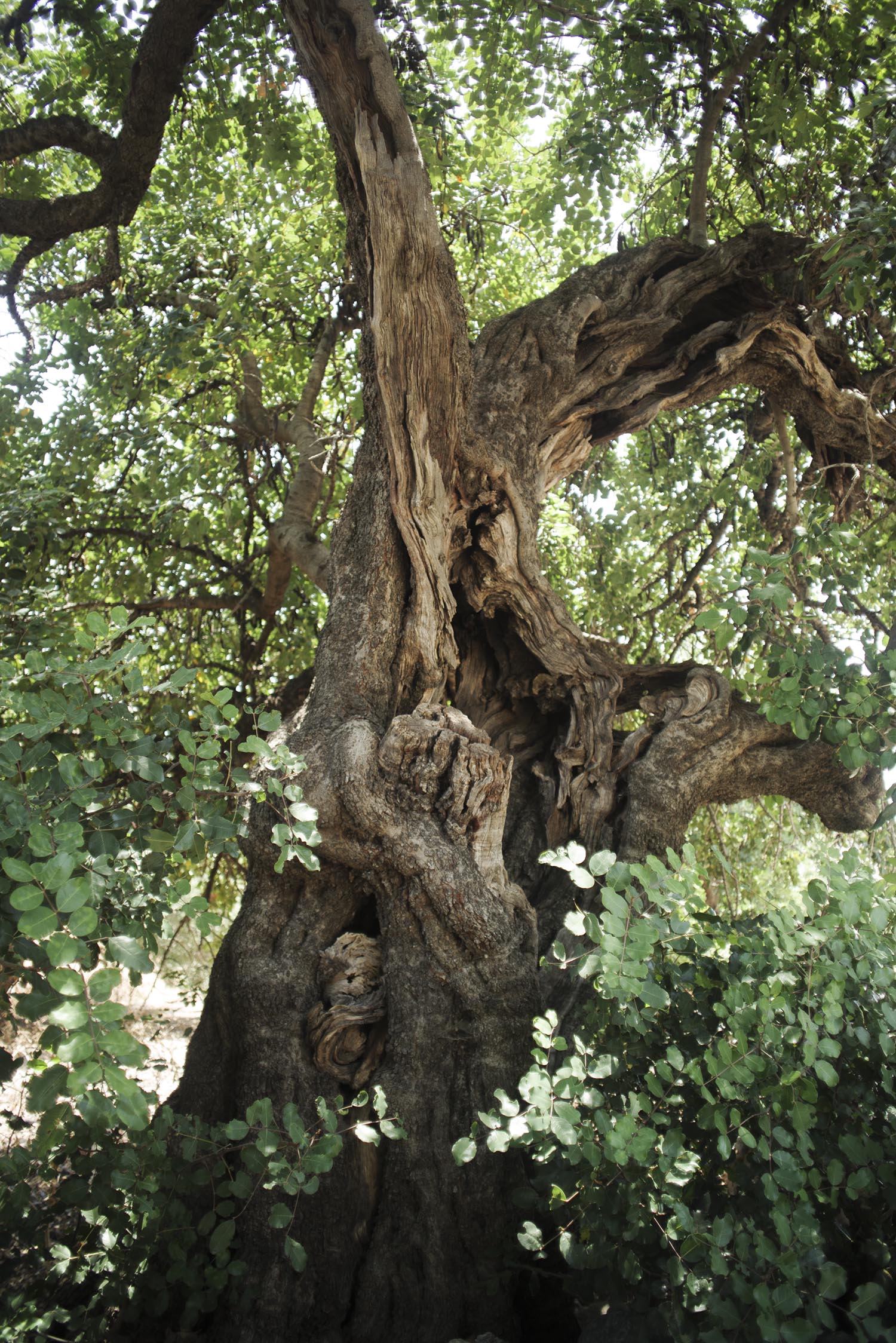
The carob cultivation is by nature ecological, because it doesn't need what the olive tree needs. It's everywhere, they can grow by themselves, without anything. Of course, if you help them, they would be... You can help them by cutting the branches, to see if they have any disease and sometimes watering them, because they don't need too much. It's an alternative cultivation during the climate change. This is the most important thing, because they are self-sufficient, everywhere, even in the very high temperature. They can grow on 800 meters on the highest.

The planting of olivetres is still for many the solution for agriculture, even price for oil /L is low as ca 3 EUR for L and everybody complains since the threat of deseses growth and sprajing with cwemicals is a "must" . Ther is also a latent fear that some deses can be a catastropy for monoculture of 33 mio trees on the island
Olive trees, Carob trees..I love both of them, but carob is the symbol of survival, against everything, all the extreme conditions. And this is for me more important. And you can't survive eating olives, you can survive eating carobs. In order to survive with olives, we have to make olive oil, we have to have a process, but the other one gives you directly what you need, that's why it saved a population. But yeah, this is again fire, preventing the fire. Many places would get burned..., it helps the soil to be stronger. I don't know it's magic. It's something the nature created, it gives us that way and I'm so enthusiastic about it. I'm feeling that I have a duty to do whatever I can for this. I feel like that, because it's a tree that nobody looks at it, focuses on and I have to show everybody that it's so important. The most important tree.
It is a symbol of survival.

Kostas Karatzis farm is just over the heal of jung olive growth -/img above/ Carob does not need any sprajing...drowt is not a problem since thay can root very deep even 15 meters.. and the fruet is hi protein , mineral and vitamin.. food -superfood and using it for health benefits goes back 4,000 years to ancient Greece.
As a culture, the Greeks, we have two different aspects, wings. One is Apollo and the other is Dionysus. So, this two have educated us, we have been trained to be both of them.
ps : If I had money, I would have done much more. I'm thinking to make the first pilot film and then to go to Arte for example (TV channel) or Greek television to tell them this is the first and if you like it finance the others. Let's do it together. I have all the scenario, everything.
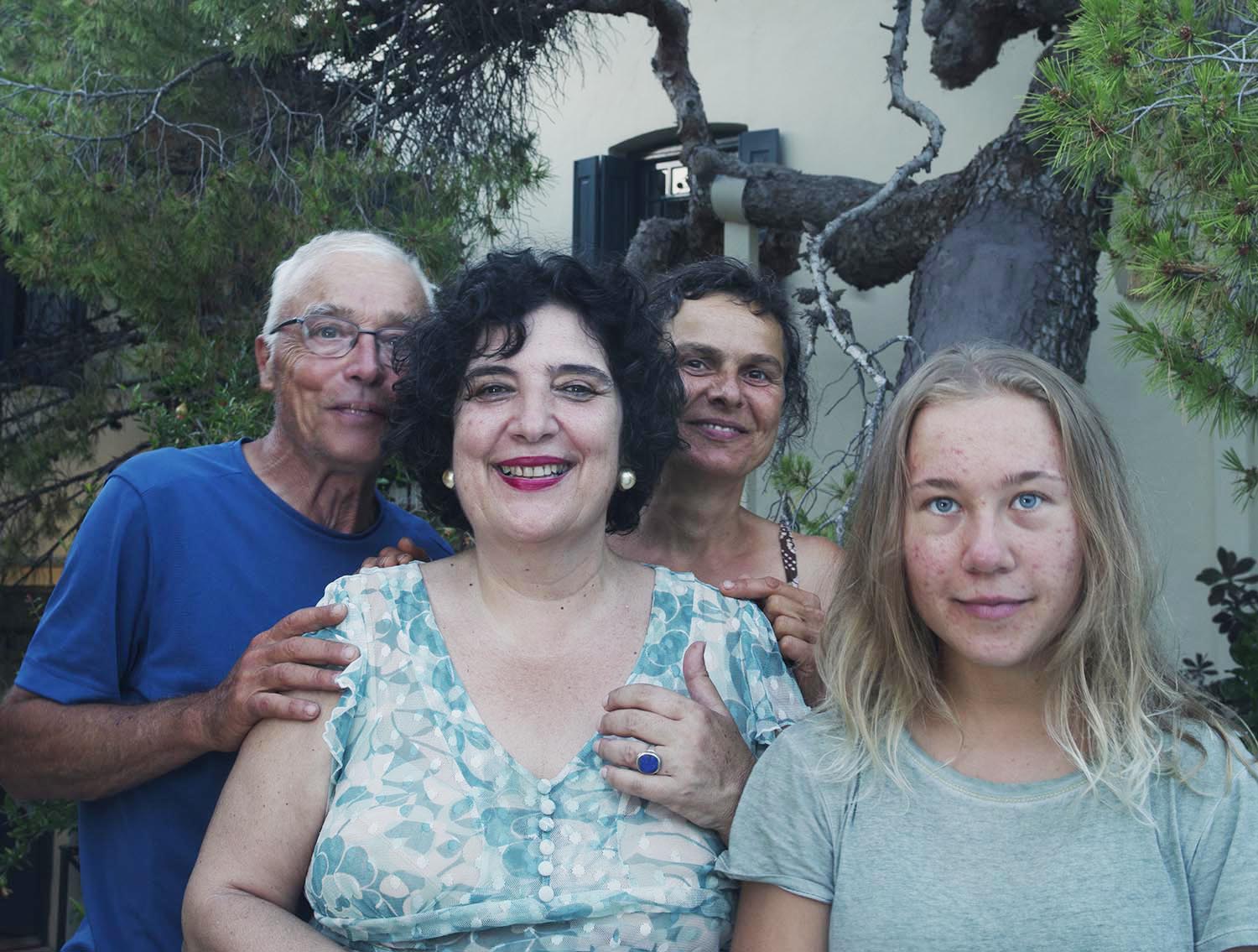
The Team of this story : Korina Miliaraki, Ida Glušič, Ivana Petan, BB
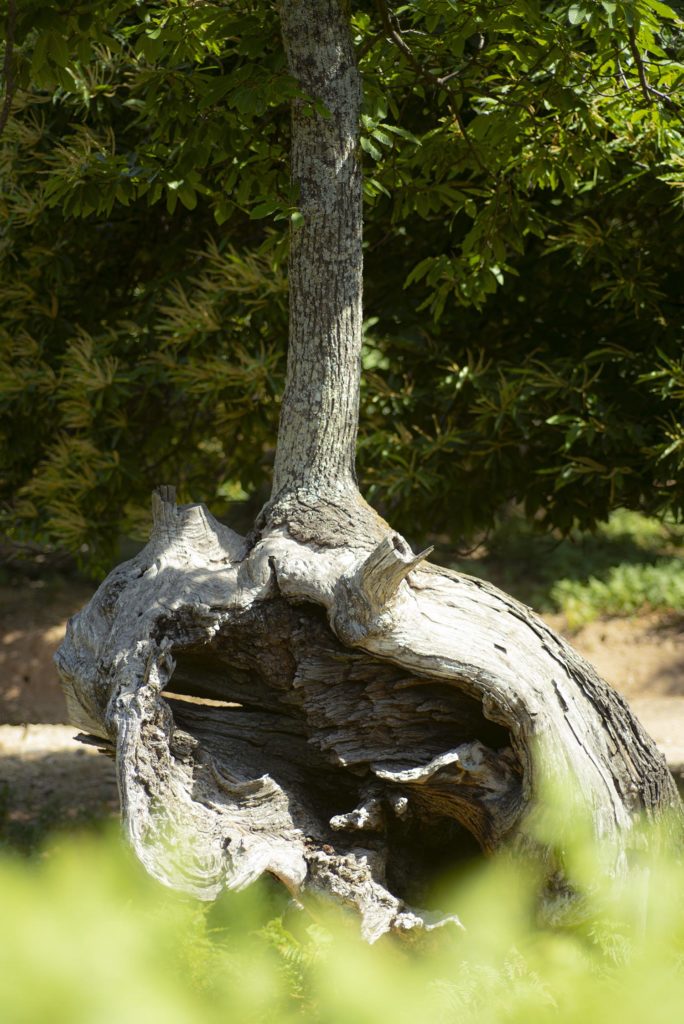
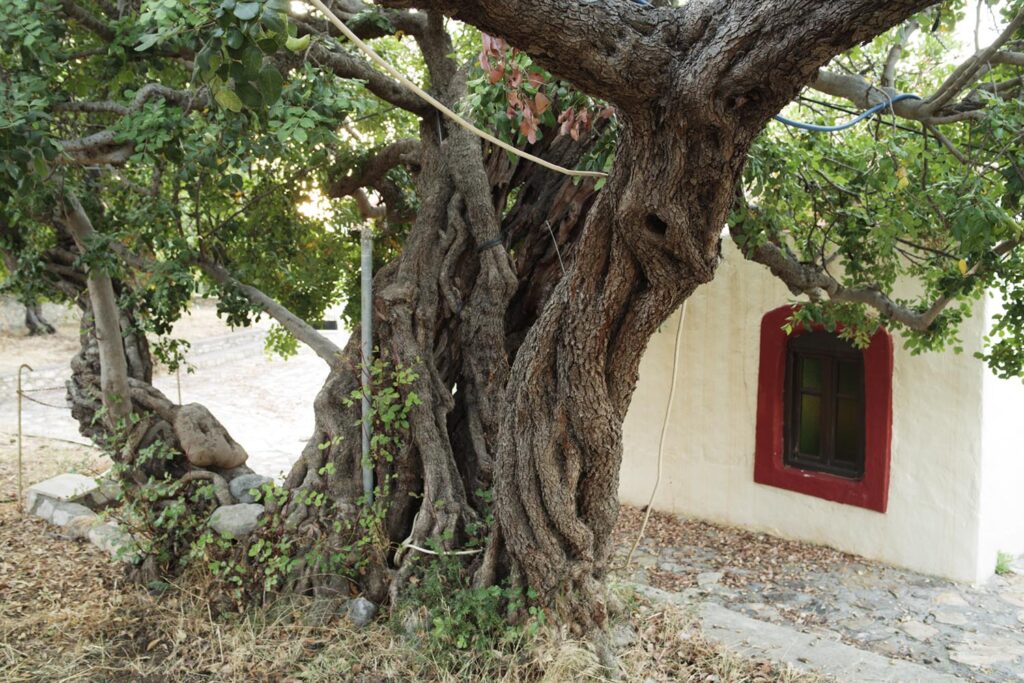
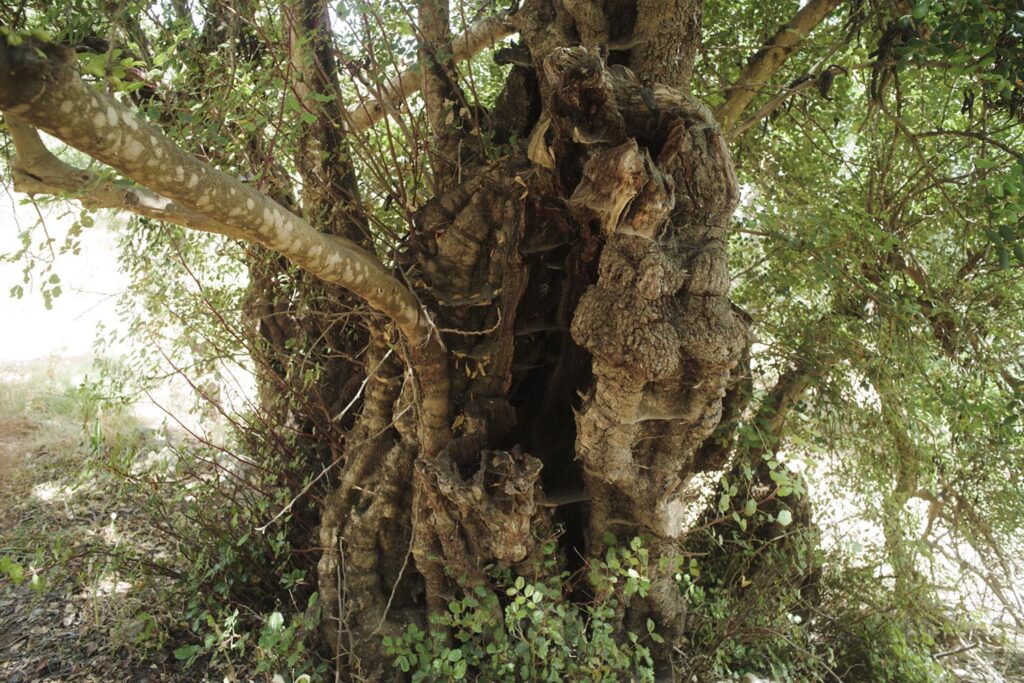
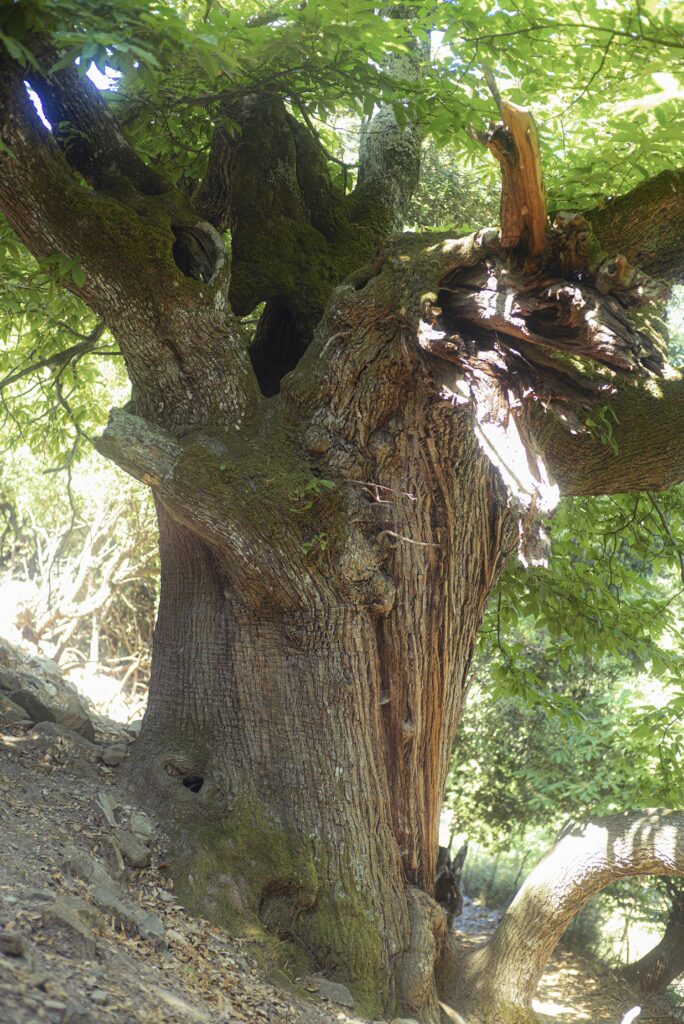
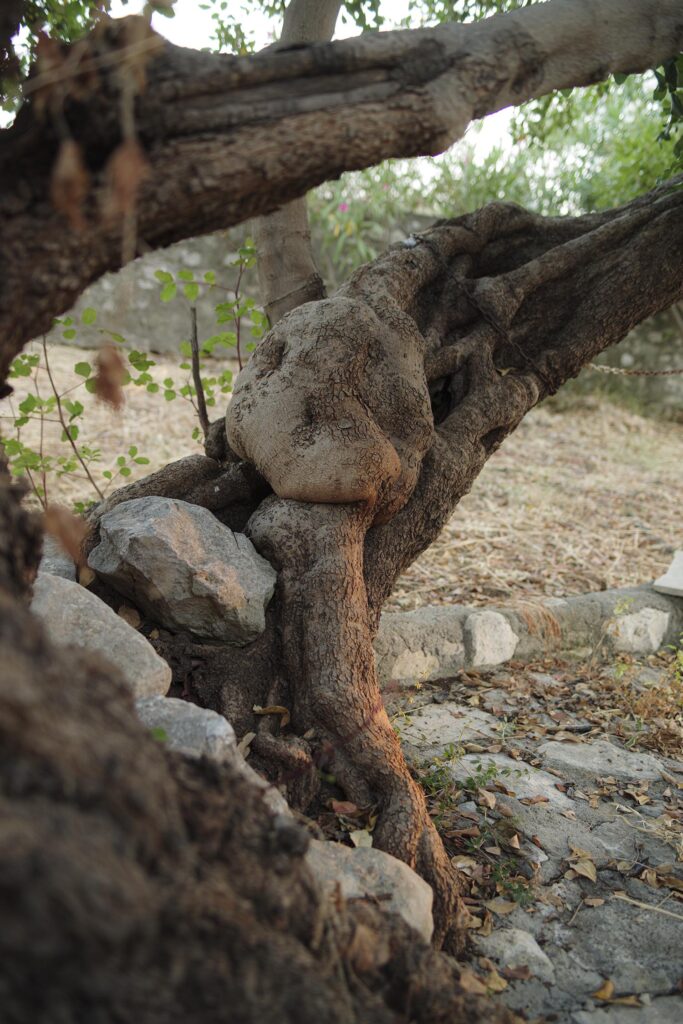
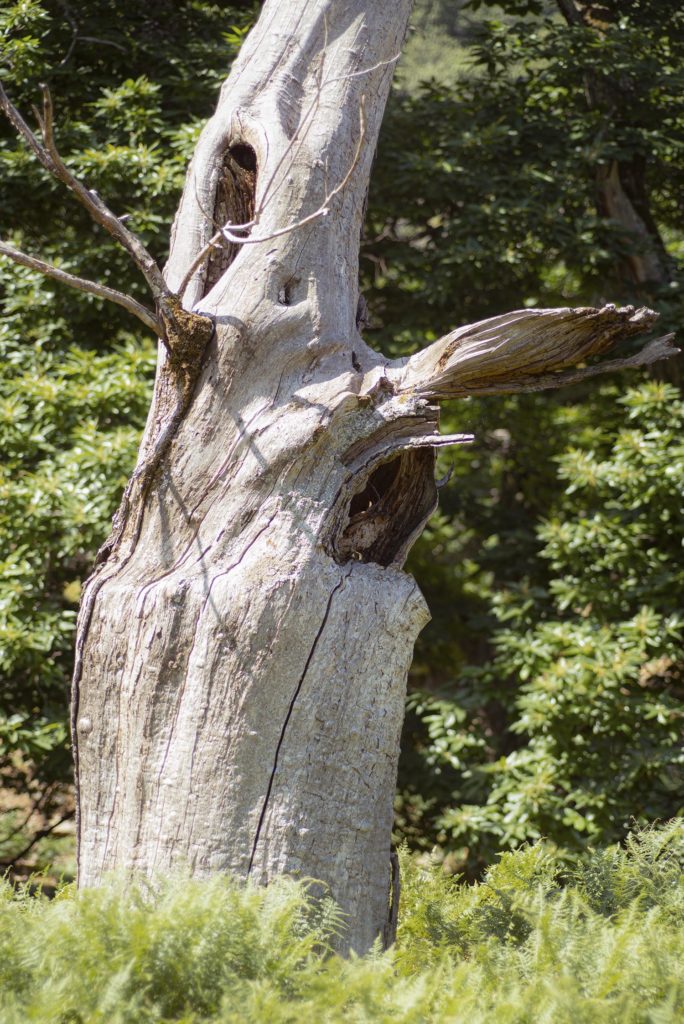
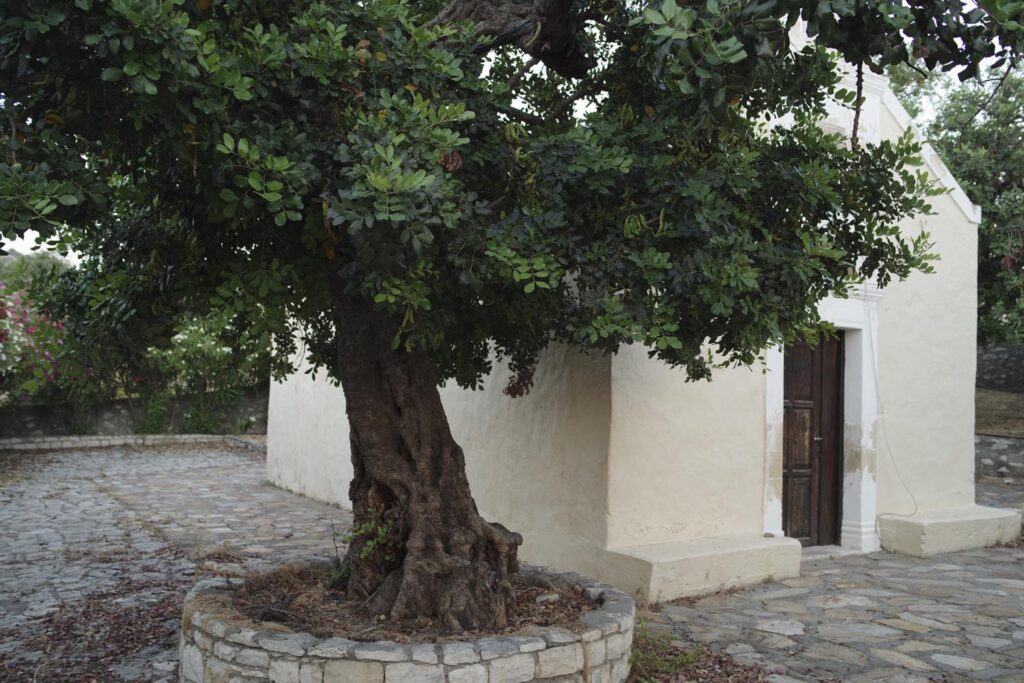
Support the publishing of the next story!
Producedin by MEDLand project/BB : photo, reserch, intervievs by BB, conections organized by Korina Miliaraki, WGO filming photos by Aida Glušič, production assistant Ivana Petan
Enter your text here...

